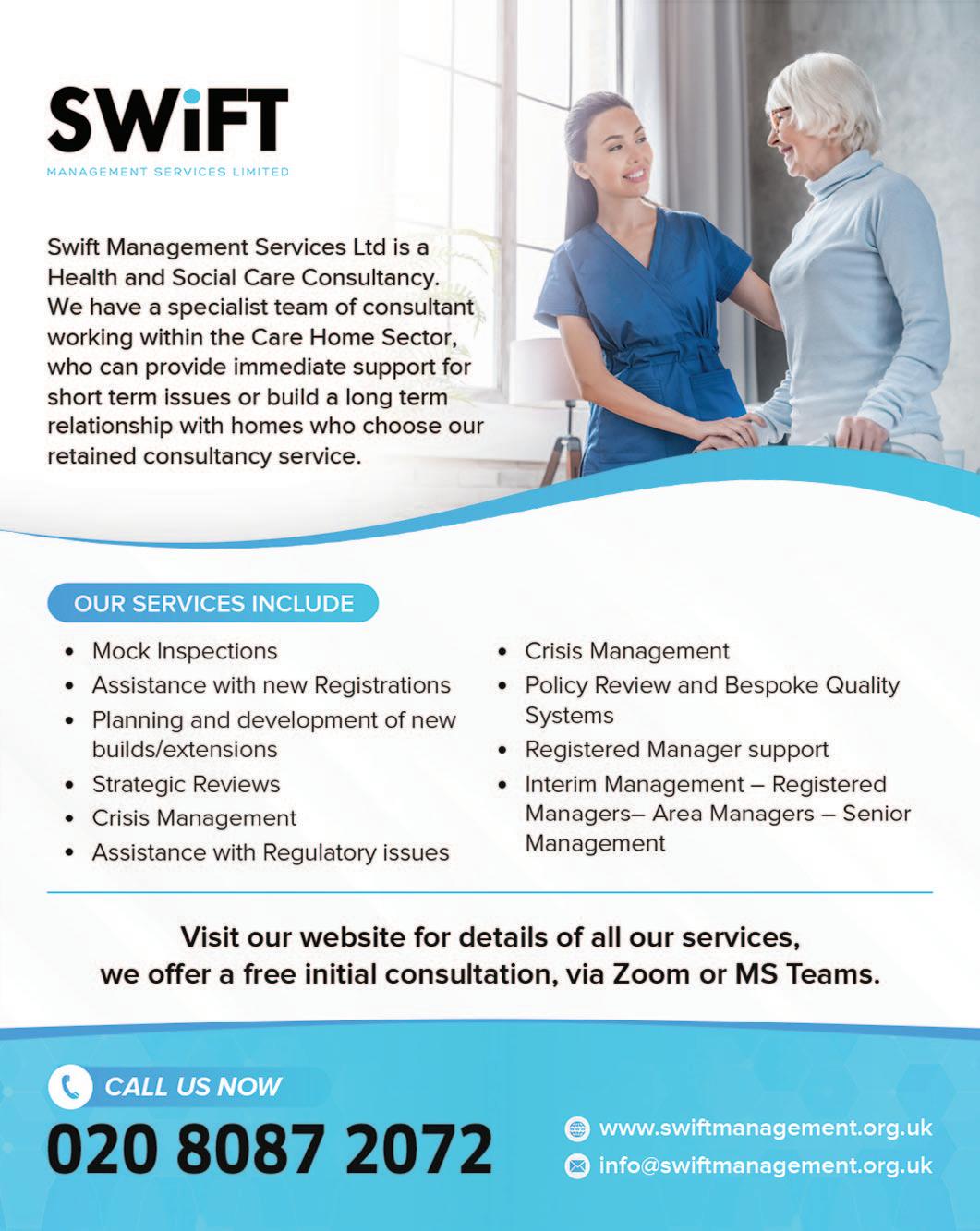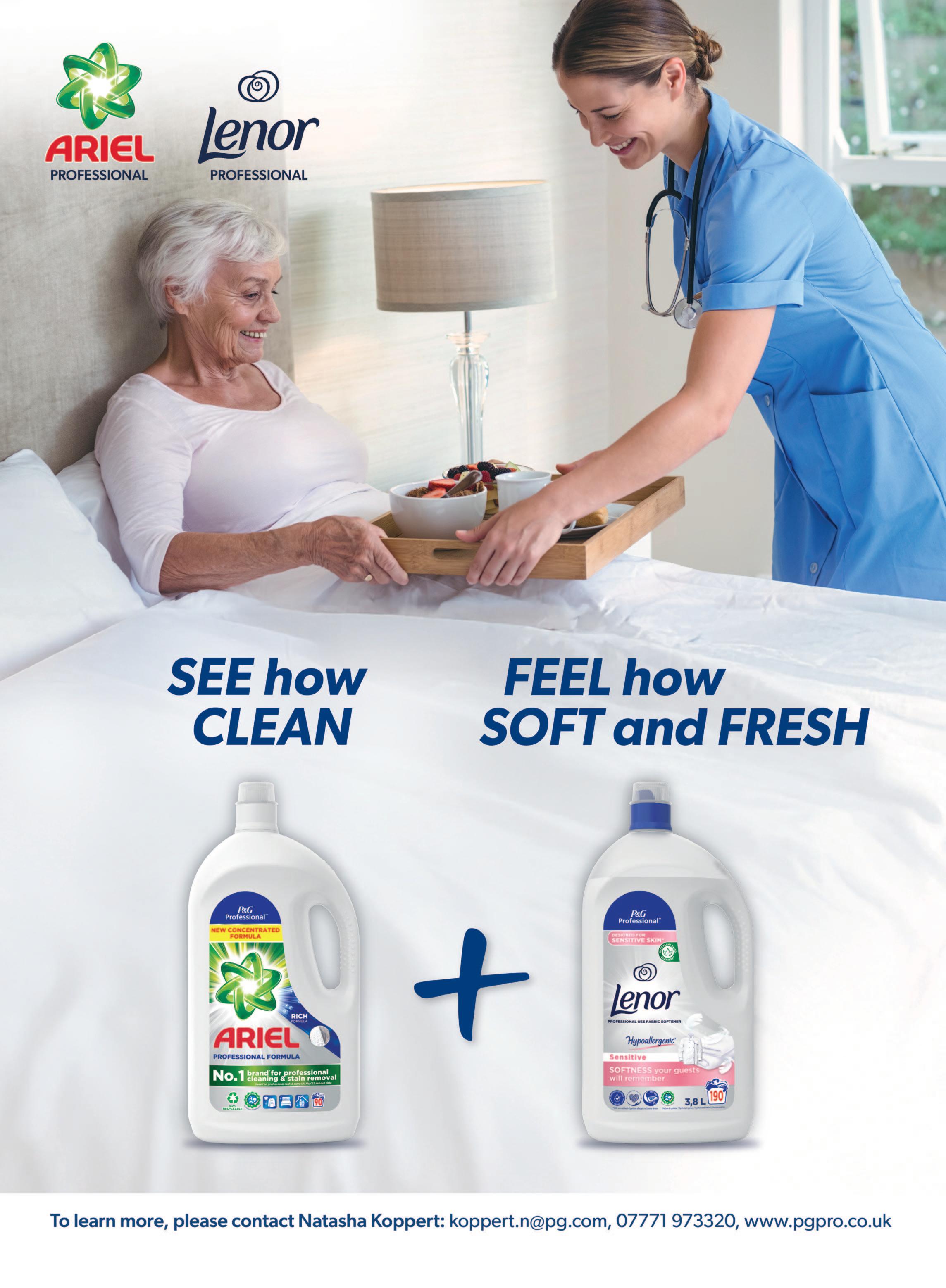














“Crisis

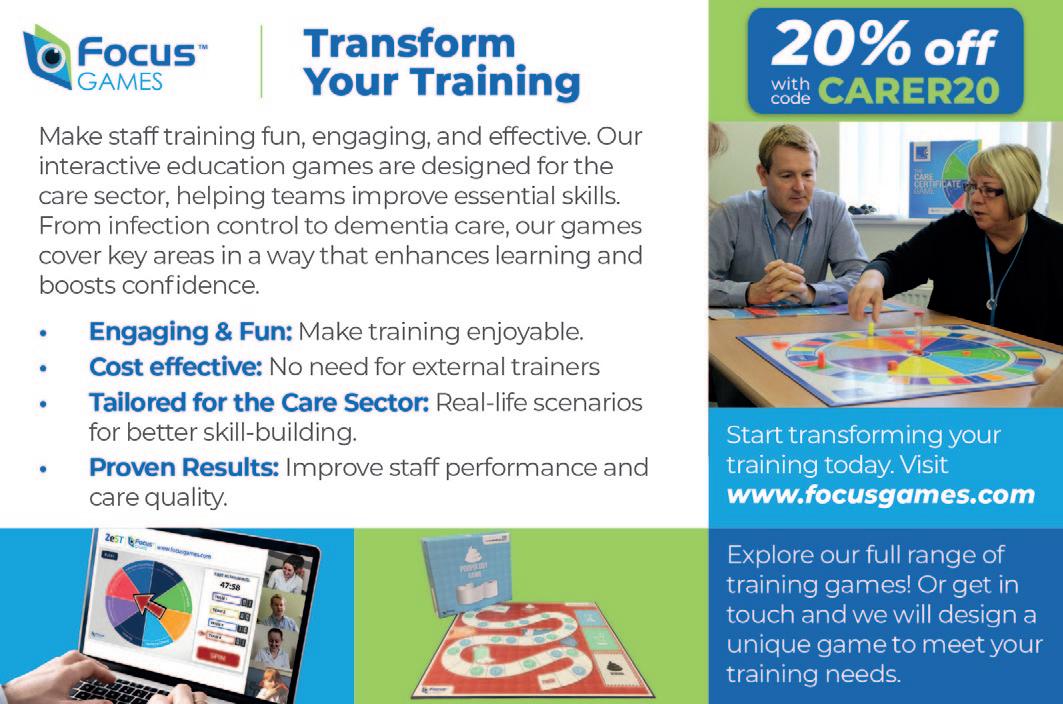
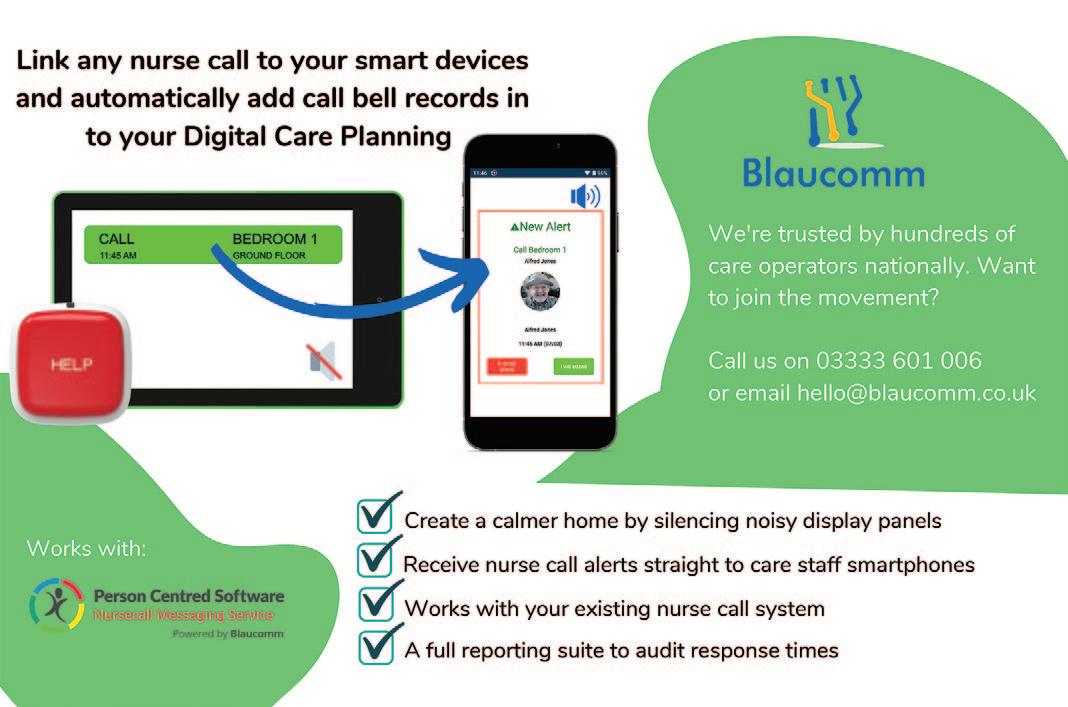
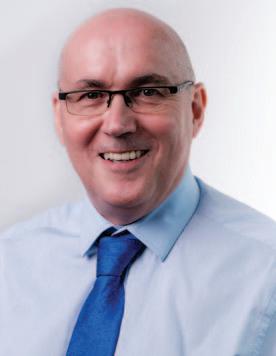
Editor
This week’s report, the Sector Pulse Check Report by learning disability charity Hft and Care England, declaring that social care is on the brink of collapse comes as no surprise to those working within the sector.
As Cllr David Fothergill, chairman of the Local Government Association’s Community Wellbeing Board, aptly pointed out, decades of underfunding have left the sector teetering on the edge.
While “Rome wasn’t built in a day,” frustrations continue to mount as the crisis deepens, demanding urgent action rather than further delays.
The Government’s announcement on January 3rd of a new adult social care commission, led by Baroness Louise Casey, has been cautiously welcomed by sector leaders.
However, the stark reality is that the challenges facing social care cannot wait until 2028 for reform. The crisis is happening now, and as the report highlights, recruitment and retention are key hurdles that providers are grappling with daily.
Domestic recruitment remains a significant struggle, with 85% of providers citing pay rates as the biggest barrier.
It’s clear that improved pay, working conditions, and benefits aligned with those offered by the NHS would make the most significant difference in attracting and retaining staff. Yet, while we all agree that care workers deserve better remuneration to reflect their tireless dedication, the harsh truth is that additional funding must come from somewhere – and money cannot be conjured out of thin air.
Without sustained, multi-year investment, the sector risks spiralling further into crisis.
The warnings have been issued time and again, but the question remains: who is listening? As the sector braces itself, we must remember that behind

every statistic is a family, a vulnerable individual, and an overwhelmed care worker, and given the wage changes (ENIC and NMW) coming in April the government must take decisive action to support operators before the crisis overwhelms the sector.
On a brighter note, I was delighted to interview legendary broadcaster Angela Rippon (see page 9), who is championing the Big Dementia Conversation. Angela, like so many of us, has a deeply personal connection to dementia, having cared for her own mother, just as I cared for mine.
We discussed the immense challenges families face in supporting loved ones with this devastating condition, and I am thrilled that The Carer can support this vital campaign. Dementia is one of the greatest health challenges of our time, and initiatives like this are a much-needed step forward in raising awareness and driving change.
I would also like to encourage our readers to sign up for our bi-weekly digital newsletter at www.thecareruk.com and follow us on social media for all the latest news.
I can always be contacted at editor@thecareruk.com

of the publisher or the
responsibility for any effects, errors or omissions therefrom. All rights reserved, reproduction is forbidden unless

Hft and Care England are calling on the Government to take urgent action to prevent dire consequences for those who draw on care and support, providers and their staff, with two key policy asks: Firstly, to commit to a credible, multi-year funding settlement for adult social care in the 2025 Spending Review, to financially support providers who have suffered years of underfunding, and ensure future funding accounts for wage increases, inflation, and National Insurance contributions.
• Secondly, a fully funded plan to support the workforce and bring care workers’ pay and conditions in line with their NHS counterparts, arguing that status and respect are just as crucial as wages to make care work an attractive career for the next generation.
In support of these two key recommendations, Hft and Care England believe the Government should look for cross party support to deliver a number of urgent measures, including:
Fully fund the increase in Employer National Insurance contributions, or exempt care providers entirely
Removing the ban on dependents for international social care staff
• Enforce fee uplift announcement from the start of each new financial year, and mandatory payment timelines for local authority and Integrated Care Board payments, with penalties for delays
WORKFORCE COSTS CONCERNS
The two leading organisations believe that the new commission does not need to spend months looking at what the issues are – it should work directly with the sector and use data such as the robust, multi-year Sector Pulse Check, Dilnot Commission findings and recommendations from the Darzi report to be able to identify and focus quickly on the actions to be taken.
Based on responses from more than 200 small, medium and large adult social care providers – collectively responsible for supporting over 128,000 people – the annual Sector Pulse Check report gives an overview of the current state of the social care sector and presents the case for urgent change.
90% of providers cited rising workforce costs as one of their top three cost-pressures, with 95% reporting that increases in the National Living Wage are their deepest concern. This is due to the shortfalls in fee increases from local authorities to cover these costs – reported by 85% of providers – leaving them to absorb the gap.
Due to the increasing financial pressures:
• Three in ten providers have been forced to close parts of their organisations or hand back contracts to local authorities
• One-third are considering leaving the market altogether, which would
leave an estimated 275,000 people without the care they rightly expect and are legally entitled to – set to become more of a reality following the changes to National Insurance contributions in the 2024 Autumn Budget
• 37% have curbed investment into building future capacity for care Domestic Recruitment Struggles
Domestic recruitment continues to be a struggle for providers, with 85% of providers reporting that the biggest barrier to recruitment is pay rates. To improve recruitment and retention, providers highlighted that conditions and benefits aligned to the NHS would make the biggest difference to people entering the sector.
International recruitment was the most frequently reported method for filling vacancies, with 40% employing this strategy. Unfortunately, changes to the UK’s immigration rules has led to a severing of this lifeline, as providers reported a significant drop in international applications.
Steve Veevers, chief executive of Hft, says: “The Government’s recognition of the urgent challenges facing adult social care is a welcome step forward and we look forward to working with Baroness Casey’s commission. However, the sector can ill afford a lengthy process to identify the solutions. The evidence is already clear. This year’s Sector Pulse Check is the next critical step for outlining clear, actionable solutions. It provides a detailed, up-to-date picture of the sector’s pressures and highlights urgent priorities such as workforce shortages, funding instability, and improved support for care workers.”
“While the announced reforms show promise in improving coordination between health and social care, immediate action is crucial to stabilise the sector and ease the growing strain on care providers and the NHS.”
“We urge the government to consult with Hft and other providers who have done the research and are ready to collaborate on practical, immediate measures. The Sector Pulse Check provides the roadmap— now we need action to ensure the care sector’s future through decisive steps, not deferred promises.”
Professor Martin Green OBE, chief executive of Care England, said: “Providers face impossible choices: absorbing unsustainable costs, changing their care models, cutting back on services, or shutting their doors entirely. This isn’t just a warning, it’s a crisis unfolding in real time. Years of unrelenting financial strain and a workforce stretched to breaking point have left social care hanging by a thread. Without immediate intervention, the consequences will be devastating for those who rely on care every single day.”
“Carers deserve a workforce strategy that serves as a testament to their unwavering dedication – a blueprint for meaningful change that ensures they’re properly paid, given real opportunities for development, and recognised for their vital contribution to society. This requires not just funding but a cross-party commitment to implement transformative, long-term solutions for the sector.
“The Government talks of delivering ‘an NHS fit for the future,’ but let’s be clear: you cannot fix the NHS without fixing social care. We are ready to work alongside Baroness Casey and the Government to turn this commission into a catalyst for genuine change. But let’s be clear: the status quo is no longer an option. Every delay, every failure to act, pushes more care providers out of the sector and leaves more people without the support they need.”
Cllr David Fothergill, chairman of the Local Government Association's Community Wellbeing Board, said: 'Councils work incredibly hard to support people who draw on care and support, but adult social care has faced decades of underfunding, leaving services at breaking point.
Local authorities are under unprecedented financial pressure, exacerbated by inflation, rising demand, an increase in employer national insurance contributions, and workforce challenges”.
'We urgently need a long-term funding plan for adult social care, along with a workforce strategy that values and supports care workers. Without immediate Government action, care services will remain at risk, with devastating consequences for individuals and families who rely on them.'
Liberal Democrat care and carers spokesperson, Alison Bennett, said: ‘It is blindingly obvious that social care has been in crisis for years and is now on the brink of collapse.'
A Department of Health and Social Care spokesperson said: ‘The Casey Commission will work to build consensus around the future of adult social care that is fair and affordable.
‘The first report will be published next year and set out the immediate action this Government should take to lay the foundations of a National Care Service.
‘We are taking action now by increasing funding to allow disabled people to stay in their homes, boosting the carers allowance, professionalising the workforce and making available up to £3.7bn extra for social care authorities in 2025-26, including an £880m increase in the social care grant.
The full report is available to read on Care England’s or Hft’s website at www.careengland.org.uk/sector-pulse-check-2024
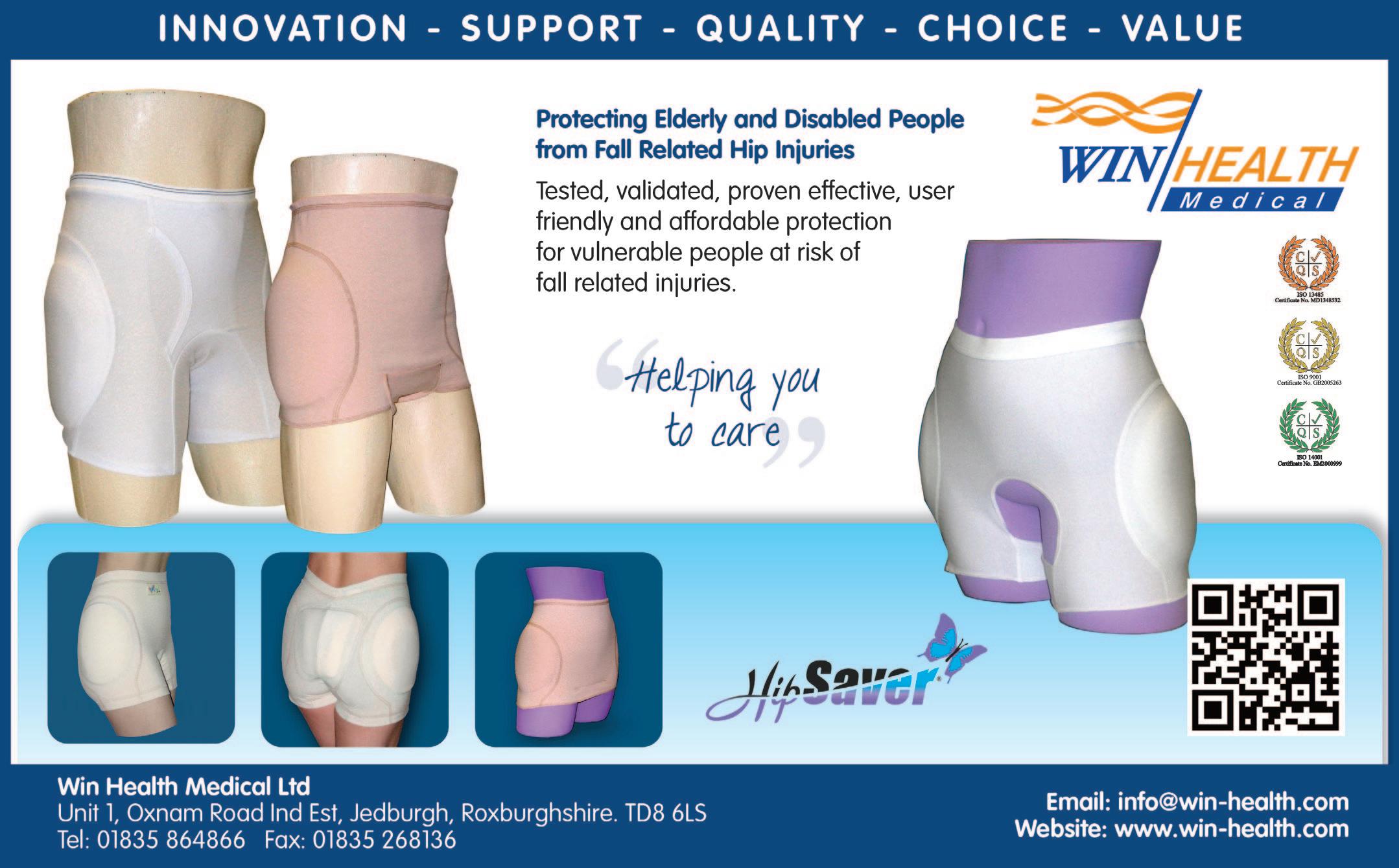
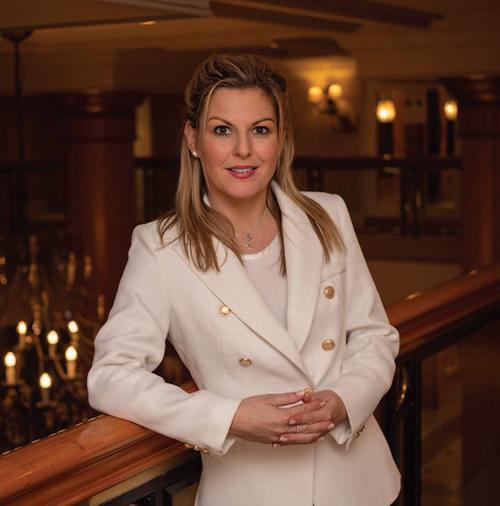
The latest UK Care Homes Trading Performance Review 2024 shows occupancy levels rising to 88.3%, a positive sign of market recovery. However, while this progress is encouraging, it reveals significant untapped potential in how care homes attract and convert prospective residents.
Presenting care homes effectively is not just about showcasing services—it's about creating emotional connection and trust. Families are making difficult decisions in emotionally charged situations, which requires a sophisticated approach to relationshipbuilding and conversion. Care homes are offering something no one truly wants to need, making the challenge even greater.
To truly drive sustainable occupancy growth, care homes must focus on transforming the customer journey—from raising awareness to handling enquiries and guiding families through to admissions. Many providers are still missing key opportunities. Too often, care homes fall short in delivering the basics well, leading to lost enquiries and missed revenue potential.
CRITICAL AREAS NEEDING IMPROVEMENT INCLUDE:
Generating Quality Leads: It's essential to attract the right audience from the outset through targeted campaigns, high-value content, and strategic outreach across multiple channels, including community outreach, digital marketing, partnerships, referral networks, local events, print ads, and door drops.
Empathetic First Contact: Enquiries must be handled with care, expertise, and emotional sensitivity, recognising the difficult decisions families face.
• Personalised Tours: Showrounds should go beyond listing services, highlighting quality of life benefits such as personalised care plans, engaging activities, and the warmth of community life.
By Ali Powell, CEO and Founder at
Clear Value Communication: Families need transparent, outcome-driven explanations of the value of care— focusing on dignity, well-being, and peace of mind, not just amenities.
Consistent Post-Visit Engagement: Many care homes neglect follow-up strategies after visits, losing potential residents who may need further reassurance or time to decide.
To ensure the customer journey is effective, care homes should track key performance metrics, including:
Monthly Lead Generation: Number of leads that meet predefined criteria indicating genuine interest or fit.
Monthly Visits: The number of on-site or virtual tours conducted within the month.
Monthly Admissions: The total number of new residents admitted each month.
Lead Source Performance: Breakdown of leads by marketing channel (e.g., online ads, social media, referrals, events) to identify the most effective sources.
Average Admission Cycle Length: The average time from initial lead generation to a confirmed admission.
• Monthly Marketing Spend: Total amount spent on marketing each month.
Website Traffic: Total visitors to the website and engagement rates for the month.
Social Media: Total followers and engagement on platforms like Facebook, LinkedIn, and Instagram.
Investing in marketing and relationship-building efforts is not a luxury—it's essential. The cost per acquisition is often minimal compared to the hundreds of thousands in lifetime revenue generated from new residents. By focusing on consistency and excellence throughout the entire customer journey, care homes can significantly impact both occupancy rates and short- and long-term growth. The data is clear: doing the fundamentals well is not just good practice—it’s essential for both immediate results and lasting success.
It’s time for care homes to move beyond filling rooms and start focusing on creating an inspiring customer journey that builds confidence, trust, and emotional connection with families.
If you need an expert in this area, contact Ali at Commercial Acceleration—specialists in strategy and implementation for transformational and turnaround results.
ali@comaccel.co.uk | comaccel.co.uk

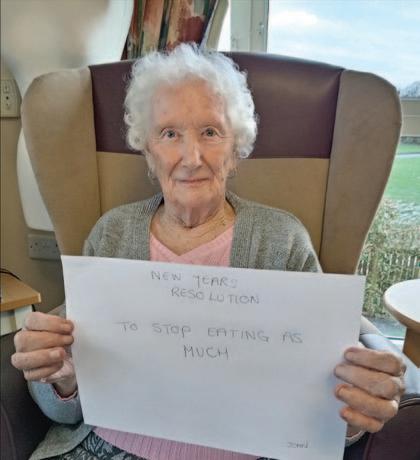
With New Year being synonymous for promises of fresh starts and beginnings, opportunities for positive change and setting goals, residents at HC-One’s Hartford Court Care Home, in Cramlington, Northumberland, have revealed their New Year’s resolutions for 2025 to provide a fulfilling year ahead.
Residents at HC-One’s Hartford Court Care Home reflected on 2024, and subsequently set their goals for success in 2025 by making New Year’s resolutions together. Residents set a range of New Year’s resolutions, including exploring new hobbies, being more active, and improving nutrition. Residents brainstormed what they wanted their personal goals to be for 2025 and jotted their New Year’s resolutions down. Residents then shared their goals with each other to create a supportive community, help provide motivation and encouragement.
Jean Hudspeth, aged 87, a resident at Hartford Court, has set herself the New Year’s resolution challenge of eating less. Jean said following overindulging over the festive period, she wants to achieve this goal by eating smaller portion meals and encouraged her fellow residents and colleagues to help motivate her by reminding her about the New Year’s resolution goal regularly.
Resident Rose Lowes, aged 96, has set herself the New Year’s resolution of getting fitter by being more active and taking part in regular exercise. Rose plans to achieve her New Year’s resolution goal by cutting down the amount of time she sits down watching TV.

Rose is going to use the spare time to walk up and down the corridor three times a day and attend the exercise classes that the home hosts, including the armchair based exercises classes as well as any other opportunities to improve mobility, general fitness and wellbeing.
Rose Lowes, HC-One’s Hartford Court resident, said: “After speaking with residents and staff at Hartford Court, I want to kickstart the New Year with a goal to do more exercise. I want to be more active, and my new exercise routine will help me achieve this goal.”
Margaret Green, aged 89, who is a resident at Hartford Court, said her New Year’s resolution for 2025 is to start going to bed earlier. Margaret plans to achieve this goal by ensuring she switches her TV off earlier each night to get a peaceful night’s sleep.
However, Margaret has said the exception to this rule will be on a Monday evening as she likes to stay up to watch her favourite quiz program, Mastermind, on the TV which she’d hate to miss.
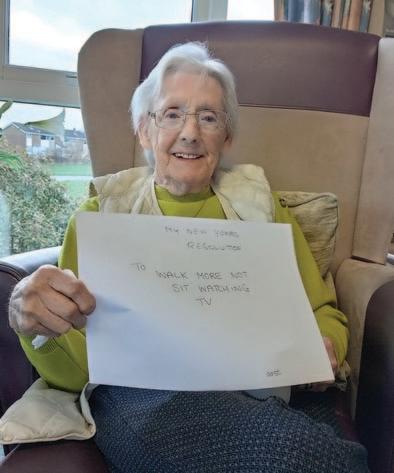
Ann Callan, Wellbeing Coordinator at HC-One’s Hartford Court Care Home, stated:
“Helping residents set goals and New Year’s resolutions for the year ahead provides them with a sense of purpose which helps enhance their overall quality of life and wellbeing. We look forward to supporting our residents with achieving their New Year’s resolutions, accomplishing their goals and living a meaningful life.”

The Health and Social Care Committee has written a letter to the Secretary of State, the Rt Hon Wes Streeting, to ask for an update on the steps that the Government is taking to support the NHS and the broader health and social care system, in light of the high demands they are facing, with the number of people in England’s hospitals with flu quadrupling in the last month.
Earlier this month the NHS reported that staff experienced the busiest year on record for A&E and ambulance services last year, new figures show today, as flu continues to pile pressure on hospitals into the beginning of the year.
There was an average of 5,408 patients a day in hospital with flu last week, including 256 in critical care – 3.5 times higher than the same week last year (1,548 w/e 7 January 2024).
A number of trusts this week have declared criti-

cal incidents, citing exceptional demand caused by the colder weather and respiratory viruses.
Covid, RSV and norovirus cases remained high with more than 1,100 patients in hospital with Covid every day last week, as well as 626 patients with norovirus – up almost 50% on the same week last year (424).
There was also an average of 72 children in hospital with RSV every day, up 47% from last year (49).
The Committee’s letter asks what support will be provided to NHS Trusts that have declared a critical incident, including after the incidents end, to mitigate the impact on elective procedures.
The Chair of the Health and Social Care Committee, Layla Moran MP, said: “It is very worrying to hear of the strain that A&E departments across the country are under and of NHS Trusts having to declare critical incidents because of the high number of people attending with winter illnesses and the spike in flu cases.
“As a Committee, we have written to the Health Secretary today to ask what the Department is doing to support health services to cope with the exceptionally high demand they are facing.”
Join us as we explore the critical steps for purchasing Social Care tech that will future proof your operations for 2025 and beyond.
Tailored to leaders in HR, Finance, and IT, this webinar will explore how to futureproof your operations by integrating Scheduling, HR, and Payroll systems to streamline workflows, enhance compliance, and significantly reduce costs.

Hemal Joshi, Sona’s Head of Sales, to share insights on selecting Scheduling, HR, and Payroll solutions.
We’ll be discussing:
How top Social Care leaders are purchasing tech in 2025
Wednesday, 22nd of January 12PM (GMT)
Ruth Hallett, Head of Change at United Response and Social Care tech consultant, joins Debbie Price, CEO of Coverage Care Services, and
Future-proofing care providers’ tech stacks, as Ruth draws on her extensive experience and current work at United Response.
Key pitfalls and lessons from navigating the WFM tech selection process, as Debbie has recently done for Coverage Care Services.
Practical advice on maximising system value, as Hemal has supported various other providers to achieve.

WE NOW SUPPLY A WIDE RANGE OF FURNITURE

By Amrit Sumal, Director, Superior Care

The UK’s social care sector is bracing for significant changes in 2025, particularly following Labour’s Budget announcements last year, which introduced a range of measures with profound implications for care providers right across the country.
Increased National Insurance (NI) contributions, a reduction in the payment threshold, and a rise in the National Living Wage (NLW) headline the fiscal adjustments that will no doubt ripple through an already strained industry – and combined with workforce challenges, regulatory shifts, and evolving societal needs –2025 will be a year that will demand resilience.
The Labour’s Budget has certainly compounded financial stress for care providers everywhere. Increased NI contributions will lead to higher employer costs, directly affecting budgets already stretched thin by rising operational expenses.
The reduction in the payment threshold means that more lowincome employees will fall within the NI tax bracket, further pressuring both workers and employers. And, additionally, the uplift in the NLW, while essential for supporting low-paid workers, will force many providers to rethink staffing structures and service delivery models.
From speaking with other providers, we know that small and medium-sized care homes are likely to feel the sharpest impacts, as they lack the economies of scale to absorb these costs. A wave of consolidation could ensue, with smaller operators either merging with larger providers or exiting the market entirely, reduce consumer choice and further exacerbating regional disparities in care availability.
The sector’s workforce issues, exacerbated by Brexit and COVID-19, still show no signs of abating. Labour’s policies, while aiming to improve worker pay, do not address the fundamental issues of burnout, limited career progression, and poor perceptions of the sector.
The higher wage bill may force some providers to limit onboarding, increasing workloads for existing staff and perpetuating a vicious cycle of dissatisfaction and high turnover rates.
Providers may need to invest more in non-monetary incentives such as training, mental health support, and career development programmes whilst emphasising purpose-driven work and fostering a supportive culture will be crucial in attracting and retaining talent in 2025.This is something that we focus on, in particular, and in 2024 our first staff awards became a truly memorable occasion celebrating the hard work, compassion, and the dedication of our team. It brought everyone together and became an event filled with
laughter, recognition, and well-deserved celebrations, and importantly it marked the beginning of a new tradition that we’re already looking forward to continuing this year.
To mitigate rising costs and workforce shortages, the adoption of technology in social care will accelerate. Falls prevention systems, automated medication dispensers, and AI-driven care planning tools are likely to see broader implementation. Digital transformation will not only improve efficiency but also enhance care quality by enabling data-driven decision-making and freeing up staff for more meaningful interactions with residents.
Environmental, Social, and Governance (ESG) considerations are becoming central to the sector’s longterm strategy. Labour’s emphasis on green initiatives will likely encourage care providers to adopt more sustainable practices, from reducing energy consumption to improving waste management. These changes align with public demand for greener businesses and could become a key differentiator in an increasingly competitive market.
Some providers, including Superior Care, are already leading the way with recycling facilities and green awareness campaigns, setting a benchmark for others to follow. However, transitioning to sustainable operations will require investment, perhaps adding to the financial pressures outlined earlier.
Think Local Act Personal (TLAP) principles could gain greater prominence as care providers seek costeffective and impactful ways to deliver care. Partnerships with local stakeholders, such as community groups and small businesses, can enhance service delivery while fostering a sense of belonging for residents. This approach not only improves outcomes but also aligns with Labour’s broader vision of strengthening local economies.
Additionally, the increasing integration of care with housing and health services could drive the development of new community hubs that combine social care, medical support, and leisure facilities. Such models – whilst not widely adopted yet – will require cross-sector collaboration and innovative funding mechanisms which could take time and it might not be something we see in 2025.
Certainly, however, the support of intergenerational community organisations coming into care settings will continue to be important and where possible, more residents being able to return to local places for the day if their health and wellbeing permits.
The UK’s social care sector stands at a crossroads at the start of this new year, Labour’s Budget measures, while well-intentioned, have introduced new complexities and challenges, but by embracing technology, prioritising sustainability, and fostering community partnerships, the sector can navigate these challenges and emerge stronger.
The road ahead will demand innovation and collaboration and providers who adapt quickly and remain focused on delivering high-quality, person-centred care will not only survive but thrive.
An Altrincham home decided to arrange a surprise birthday party for their longest serving staff member.
MHA Handsworth arranged a surprise 80th birthday party for their colleague
Suzanne works as a kitchen assistant at the home and has done since 1992, making her total service almost 33 years.
The home decided to keep her party a surprise and called her into work by saying she had to take part in some staff training.
Charlotte Fowkes, activity coordinator said:
“Suzanne was over the moon when she found out what had been arranged for her.
Social Care TV continue to fly the flag for highest quality online training for Health and Social Care, after unwavering commitment to excellence within the sector for over 25 years.
Their widely-used health and social care specific courses - produced and edited in-house - are expertly designed to make learning engaging, informative and, therefore, highly effective for learners.
Accredited by CPD and endorsed by Skills for Care, training with Social Care TV is quality assured, comprehensive and relevant.
As one of the leading online training providers in the health and social care sector in the UK, they supply training for local authorities, recruitment agencies, care home groups and other health and social care organisations.
Their feature-rich Manager platform has further been enhanced this year with the introduction of several new Manager tools designed to aid with compliance, reporting and trainee management. Features now available include:
• Compliance Dashboard with Traffic Light System
• Downloadable Trainee Matrix
“She was in complete shock to begin with and did not expect anything like what we had arranged for her.
“We presented Suzanne with money from a collection from the staff along with flowers, a cake and other gifts.
“Suzanne was very thankful and expressed her gratitude to all of us.
“All the staff, along with our residents, had a great time celebrating her birthday.
“Suzanne is a key part of our MHA Handsworth family, and we all feel very privileged to have spent her birthday with her.”
• Custom Bundles
• Trainee Groups
• Bulk Uploads
• Bulk Enrolment Onto Custom Bundles
• Course Enrolment Notifications
• Course Reminders
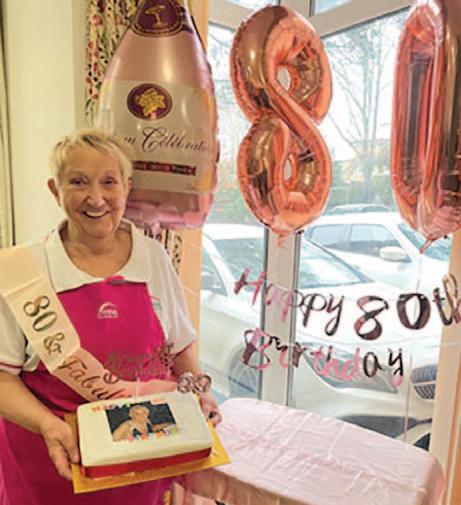

SCTV regularly release new and updated high-quality courses. Previews for all courses can be viewed at: Courses - Social Care TV (www.social-care.tv/courses/course-details)
To enhance their learners' experience further they have created free, comprehensive subject-specific workbooks which were rolled out across all courses this year. This unique addition provides excellent value and a fully robust training package.
SCTV are delighted to have won several awards over the last 12 months including:
• Best Online Health and Social Care Learning Platform’
– Global Health & Pharma Social Care Awards 2024
• ‘CPD Provider of the Year’ – The CPD Awards
• Social Care Training Provider of the Year’ - Corporate Livewire Innovation & Excellence Awards
Gold standard customer service remains a core staple of the business, with expert support and guidance provided via telephone, email and live chat. They place great importance on the training and development of their customer services team to ensure that they continue
to provide a personal, friendly and knowledgeable service.
Their much-loved ‘Care Worker of the Month’ award recognises and rewards the selfless dedication shown by care workers across the UK and they proudly support the Care Workers Charity who aim to advance the financial, professional and mental wellbeing of social care workers.
SCTV believe that high quality training should be accessible to all and offer regular, free courses which include a digital certificate accessible via their website.
The company stands behind a clear mission and set of values which define their ethos and their dedication to both the Care Sector and those within it. These can be viewed at: Mission Statement and Core Values - Social Care TV
(www.social-care.tv/about/mission-statement-and-core-values)
Social Care TV are a responsible business, committed to ensuring that their actions have a positive impact on their employees, customers, the wider health and social care community and the environment.
Above all, SCTV consistently strive to make a meaningful contribution to the wellbeing of those being cared for.
For more information please see: Homepage - Social Care TV (www.social-care.tv) and see advert on the facing page.
Older people are nearly a third more likely to go into a care home after spending time with their family over the festive season, according to new data released by review site carehome.co.uk.
Over the last three years, carehome.co.uk has seen a dramatic increase in traffic in January, compared with figures in December. In January 2024, the number of visitors to their site surged by 32% with over 375,000 extra visitors to its website compared with the month before. In 2023, the number of visitors to their site rose by over 342,000 and in 2022, by just over 258,000.
The festive season often acts as a turning point, as families come together for a longer period and notice a decline in the health, mobility and independence of their loved ones.

The emotional and physical strain of caregiving, coupled with a rise in loneliness and illness during the winter months, drives many families to look for full-time residential care for their loved ones at the start of the new year.
Data reveals that the average fee for people paying for their own residential care in the UK is £1,160 a week. So, it is not surprising that the complexities of funding residential care and uncertainty over how families will pay for it, also adds further challenges to those looking for care and making these difficult decisions
in January.
Additional data also shows that out of over 38,441 care seekers who made care enquiries between 1 November 2023 and 31 October 2024, over a fifth (21%) of people seeking care did not know how their care would be funded. As few as 16% reported they were able to access local authority funding.
These figures reveal the emotional and financial pressures families face after the holidays, as they seek to secure the best care for their loved ones in the face of rising costs and limited funding options.
Sue Learner, editor of carehome.co.uk said: “Spending time with family is a wonderful part of the festive season, but it can also bring to light the harsh realities of ageing. Over Christmas, relatives often spend extended time with their older family members and for many, this can be the first time they notice changes in mobility, memory, or overall well-being. These realisations can be difficult and emotional, prompting tough conversations about the best way forward.
“The surge in traffic we experience every January reflects the challenges many families face and shows the huge value of having access to quality care home reviews and care information to help people navigate a complex social care system.”
Not-for-profit care provider Greensleeves Care has announced ‘Big Warm Up’ – a series of community events to celebrate those who care for others. To mark the new initiative, special gatherings are taking place across Greensleeves Care homes in England on Saturday 25 January 2025.
‘Big Warm Up’ will feature a range of activities to showcase the warmth, joy and community of caregiving and care settings. The day aims to celebrate caring in all its forms, and to offer accessible opportunities for individuals and families to engage with their local care home and the support available. Events include afternoon tea-style events, community shows and acts to inspire and pay tribute to warmth and care, and fun competitions. The celebrations are open to all ages and are free of charge.

‘Big Warm Up’ is part of Greensleeves Care’s ‘Warmth of Care’ campaign, which aims to guide older adults and families exploring care solutions in the colder months. Recent figures show that nearly 1 in 2 adults in England (47%) increase the assistance they provide to their older relatives during Winter.
Paul Newman MBE, Chief Executive of Greensleeves Care, commented on the initiative: “We know families often worry more about their loved ones in Winter. The start of a new year is also a prime time for reflection and planning ahead. For many of us, this may include considering what additional support we, or an older loved one, might need in the near future.”
“At Greensleeves Care, we want families to access high-quality and person-centred care they feel good about. Through ‘Big Warm Up,’ we’re inviting everyone to experience the warmth of our care communities in a relaxed and accessible way. It’s a chance to connect in a shared celebration of all things caring and see firsthand how care homes are spaces where warmth, joy and togetherness thrive.”
The inaugural Big Warm Up and Warmth of Care – now in its second year – are part of Greensleeves Care’s growing commitment to spearheading national campaigns that expand the organisation’s social impact by supporting more families with care information and support.


Danforth Care’s Managing Director Kate Desmond shares her tips on knowing when your elderly family member needs extra support.
No one wants to see a loved one struggling, which can make thinking about care options an emotional experience. There is also a lot to consider, and it can be overwhelming and daunting.
To make sure your loved one gets the support they need, it’s important to be on the lookout for telltale signs that their current situation is no longer suitable. To help, Kate Desmond, Managing Director at the care home provider Danforth Care shares five indicators that your loved one may need care.
5 INDICATORS THAT YOUR LOVED ONE MAY NEED CARE
1. DAILY LIVING CHALLENGES
“A warning sign that your loved one may need care is if they are starting to find everyday tasks more difficult. If they are struggling with decreased mobility and are finding tasks such as personal hygiene or cooking challenging, it may indicate that they would be more comfortable and safer with care,” says Kate.
“Signs to look out for if they are finding daily living and mobility more difficult may include frequent falls, rapid weight loss, worsening personal hygiene and a hesitancy to leave the house,” advises Kate.
2. ISOLATION AND LONELINESS
“If you think your loved one is lonely and feeling isolated, even with regular visits from family, it may be time to consider a residential care home. Loneliness amongst elderly people is very common, especially amongst those who increasingly suffer from mobility issues and struggle with confidence to leave the house, resulting in them having limited interactions,” says Kate.
“In a care home setting, your loved one would have the company of their peers as often as they wanted, and they would be able to enjoy clubs, outings and events which can help to combat loneliness.”
3. CHRONIC ILLNESSES GETTING WORSE OR HARDER TO MANAGE
“Many people living with long-term chronic illnesses can manage well independently. However, if you suspect or observe that your loved one’s illness is getting harder for them to manage, care may be necessary to help keep them safe,” says Kate.
“If they are struggling to keep up with medications, doctors’ appointments or treatments, this could lead to further health complications, and therefore extra support is vital for their health and happiness.”
“If someone is already receiving care visits and you feel they are still struggling to keep on top of their health conditions, it is likely time to consider 24-hour care options.”
4. COGNITIVE DECLINE
“For someone with a degenerative cognitive disease such as dementia, getting the right care is very important for their physical and mental wellbeing. Especially when someone is in the later stages of a disease like this, it can be dangerous and distressing for them if they don’t have full-time care.”
“Signs such as mood changes, memory loss, trouble keeping time and communication problems can indicate your loved one needs more professional care, “says Kate.
5. CAREGIVER STRAIN
“It is very common that caring for a loved one can have an emotional and physical impact on the carer. If the strain is getting too much for them and they seem overwhelmed, it may be time to source more professional care as this can lead to the inability to provide adequate care. Some things increase the chances of caregiver burnout such as living with the person needing the care and struggling to financially support themselves and their loved one,” says Kate.
“Key signs to look out for are caregivers becoming withdrawn, constantly exhausted, struggling to focus or often talking to you about their worries.”
“If you’re not sure whether your loved one is getting the support they require, then requesting a Care Needs Assessment, either from the local authority or from a private care home, is the next step. The assessment will consider their health, living arrangements, social or emotional needs, and support network to establish the best type of care for your loved one,” advises Kate.
An Air Force veteran who helped bring down deadly Nazi rockets and later assisted with Allied attacks on occupied territory, has celebrated her 100th birthday.
WWII veteran Amy Wein marked her centenary on Monday 13 January by having lunch with her three children, and grandsons who had come from Australia and New Zealand, at Royal Star & Garter in Surbiton, where she now lives. Staff at the care home then threw her a memorable afternoon tea party.
The previous day, Amy had celebrated her special birthday in the Home’s garden room with family and friends, including her great-grandchildren.
She said: “I had a lovely birthday spending it with family, and my grandsons who I don’t get to see often.”
Amy was born in Northumberland on 13 January 1925. WWII had started by the time she left school, and she went straight to work at a factory which manufactured bomb tails.
In 1942, at the age of 17, Amy joined the Women’s Auxiliary Air Force (WAAF). She was trained to operate barrage balloons large tethered
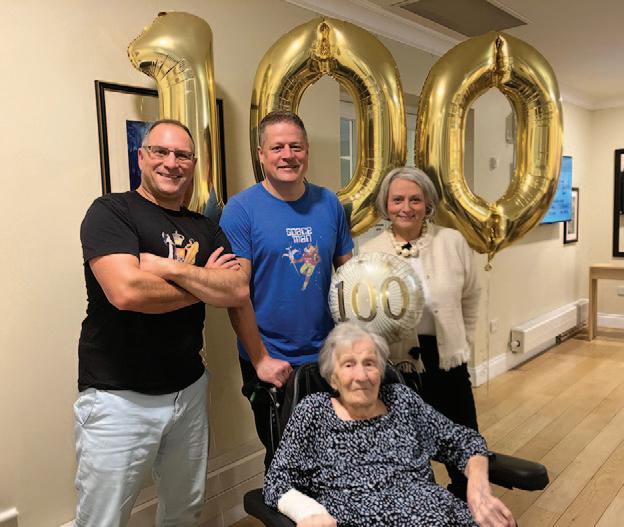
balloons which were used to help protect targets from enemy attack from the air. Later in the war, barrage balloons were used to help bring down the notorious V1 flying bombs, better known as doodlebugs. Amy then worked as a plotter at a station near Hastings as Allied nations gradually gained ascendancy over the enemy. She recalls: “It was a very interesting job. By then it was our planes that were going out in droves to bomb Berlin and industrial areas. We were plotting out hundreds of aircraft. And then, as so many of them struggled back, we plotted them back home.”
After raising her family, she returned to work as a solicitors’ clerk.
On her birthday, the Home’s dedicated Wellbeing Team arranged a party with other residents, which included live entertainment from popular crooner Vic Gilder.
Daughter Kim said afterwards: “Mum really enjoyed her parties at Royal Star & Garter, and she was tapping her feet and singing along all the way through the concert. Royal Star & Garter have gone through a lot of effort to make mum’s 100th special, and we’re very grateful.”
With this Friday (17th January) dubbed ‘Ditch Day’ due to the amount of people who give up on their New Year’s resolutions, residents at a Kent-based care home are showing no sign of stopping their pledges to build on and learn new skills – including Italian lessons and craft classes.
Proving that age is no barrier to creativity, independence and community spirit, Sonya Lodge Residential Care Home in Wilmington, Dartford, is helping residents to engage with their favourite hobbies and interests while also encouraging them to adopt new skills.
One resident, Margherita, is currently teaching her fellow residents Italian, exploring everyday phrases such as days of the week, common greetings and even incorporating singing into her lessons. Designed to stimulate the mind and encourage social interaction, these sessions provide an exciting opportunity for residents to challenge themselves and immerse in a new culture.
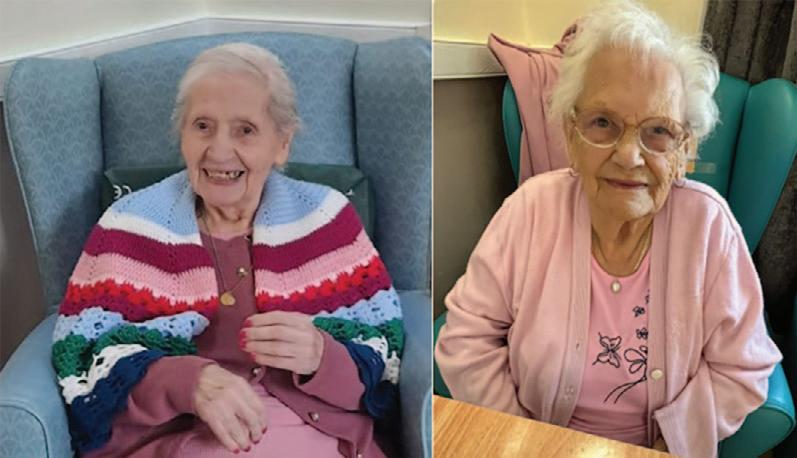
The home also recently launched a new creative group, after Pam asked to start her own craft circle. Pam shared her skills by teaching others how to create delicate roses out of tissue paper, which were used to decorate cards, as well as making a sign and wool baubles. The group offers a relaxed and supportive environment where participants can express themselves through creative mediums, enjoying the therapeutic benefits of crafting while building stronger relationships within the home.
John Hudson-Beddows, Home Manager of Sonya Lodge, which is part of the Nellsar care group, said: “We’re passionate about creating opportunities that help our residents feel fulfilled, connected, and empowered. Whether it’s learning a new language, picking up a paintbrush, or just sharing stories with one another, these activities are about much more than passing the time — they’re about building confidence, creating friendships, and celebrating the joy of lifelong learning.”
CARER editor Peter Adams recently had the privilege of speaking with Angela Rippon, the celebrated broadcaster and ambassador for Care UK’s campaign, The Big Dementia Conversation, alongside Suzanne Mumford, Care UK’s Head of Dementia and Lifestyle. Together, they shared insights into the campaign and discussed the personal and societal impact of dementia, a condition affecting millions in the UK.
Angela Rippon’s involvement in the campaign is deeply personal and she has long been a prominent advocate for dementia awareness, drawing deeply from her personal experiences.
Her mother, Edna, was diagnosed with vascular dementia in 2004, a journey that profoundly influenced Ms Rippon's commitment to the cause. Reflecting on her journey, she said: “When my late mother, Edna, was diagnosed with dementia in 2004, I knew virtually nothing about the disease, and there was little information available. The learning curve was steep as I sought to understand its progression, how it would affect her, and how I could best support her. Over the past 20 years, I’ve dedicated myself to having conversations about dementia—the very essence of what Care UK aims to achieve through this campaign”.
Ms Rippon has used her platform and experience to raise awareness, speaking at conventions, in newspapers, and through documentaries, but she emphasized that her most meaningful conversations have often been with friends and family:
“Many people have come to me with the same questions I had when my mother was first diagnosed” she said. Advocating for early diagnosis, Ms Rippon added that it “sets the foundation for effective care”, advising, "If you are worried about a loved one, you need to have that conversation, and if you can get them early diagnosis this sets you on the path of understanding how you can help that person live well with dementia."
UNDERSTANDING DEMENTIA’S EMOTIONAL IMPACT
Ms Rippon highlighted the importance of recognizing dementia symptoms beyond memory loss and responding with empathy: “Those living with dementia often experience emotional changes, such as sudden outbursts or fear of leaving home, my mother became very agoraphobic, and I remind carers that their loved ones are navigating a different reality. If they ask the same question repeatedly or seem angry, it’s the dementia speaking, not the person they once were. Accepting this can help carers respond with patience and compassion.”
Her advice is simple yet profound: “Don’t ignore the signs. Start the conversation early. A diagnosis opens the door to understanding how to help those with dementia live well. The more we talk, the more we learn, and the more we can support those affected.”
This point led was particularly poignant to editor Peter, reflecting on his own mother’s dementia diagnosis in the 1980s he said: “I am remind-
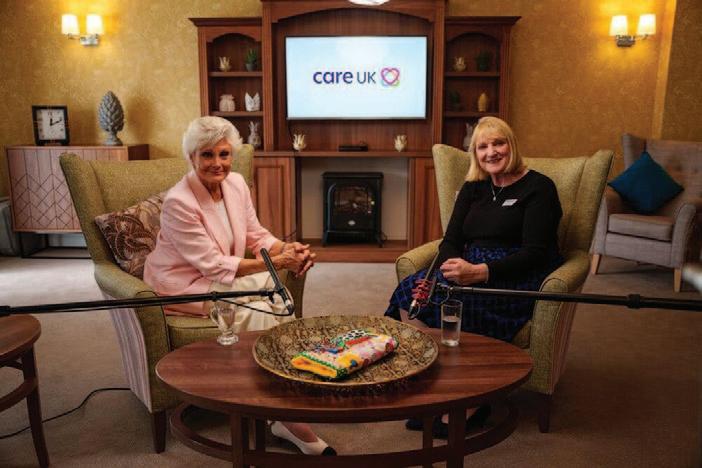
ed of just how far awareness and understanding of Alzheimer’s and dementia have come. Back then, these conditions were virtually unknown. There was little to no guidance, and families were left to navigate the heartache and challenges on their own.”
“When my once-strong, fiercely independent mother started showing signs of the disease—forgetting names, struggling with basic tasks, and becoming increasingly withdrawn—I refused to accept the reality. Denial became my defence mechanism. I clung to the forlorn hope that her condition was just a temporary setback, that somehow, it would improve. But, as I painfully learned, it did not.”
“Looking back, my refusal to accept her diagnosis only added to the heartache. It delayed the support and interventions that could have made her journey, and ours as a family, more bearable. My inability to face the truth was a lesson in the importance of early diagnosis—a step that sets the foundation for understanding, planning, and ultimately providing the best care possible.”
Ms Rippon added that this is not uncommon, which is why an early conversation is so important. Early detection allows for improved symptom management through medications and lifestyle changes that can help slow the progression of dementia. Addressing dementia in its early stages allows families to approach the condition with a sense of control and preparedness, improving both the outcomes and overall quality of life.
Ms Rippon has also called for systemic changes in dementia care. In November 2024, she supported Alzheimer's Society's initiative to make dementia training mandatory for social care workers in England. She
stated, "We wouldn’t expect a midwife to deliver a baby without any training, but we expect care staff to provide high-quality care for people with dementia without the appropriate training
Suzanne Mumford echoed both Ms Rippon’s and Peter’s sentiments, noting the persistent stigma surrounding dementia: “ While awareness of dementia has improved, many people still struggle to confidently differentiate between signs of old age and dementia. Fear and denial often prevent families from addressing their concerns. Changes in daily habits or concentration might be due to an infection or hearing loss, but they could also signal dementia. Early diagnosis allows access to treatments and support, which can significantly improve quality of life.”
Ms Mumford emphasized that The Big Dementia Conversation aims to guide families in having these essential discussions, sharing experiences, and finding appropriate support: “This campaign helps people feel less isolated, providing a platform to explore their feelings and connect with others who have faced similar challenges. It’s about breaking barriers and making sure no one feels alone in this journey.”
The conversation also turned to the importance of creating dementiafriendly environments in care settings. Ms Mumford explained: “We strive to keep individuals in their homes as long as possible, but when they move into care, the environment must feel safe, familiar, and welcoming. Simple elements like clear signage, natural lighting, and quiet spaces can make a world of difference. Every individual’s needs are unique, so it’s essential to tailor their care accordingly.”
Ms Rippon shared examples of innovative design approaches being researched in universities like Edinburgh and Newcastle: “Architects and designers are exploring how the physical environment can support dementia care. For instance, avoiding dark carpets that might be mistaken for water or removing mirrors that could confuse or frighten someone are small but impactful changes. Even consistent flooring can prevent misinterpretations of steps.”
Ms Mumford stressed that clinical settings, such as hospitals, often lack these considerations: “Dementia patients can find hospitals overwhelming due to the noise and lack of privacy. Their brains process information more slowly, so creating a calm, familiar space is vital for their comfort and safety.”
As The Big Dementia Conversation gains momentum, both Ms Rippon and Ms Mumford urge families, carers, and communities to embrace open discussions about dementia.
By fostering understanding and breaking down stigma, they hope to create a more supportive and compassionate environment for those living with this challenging condition.
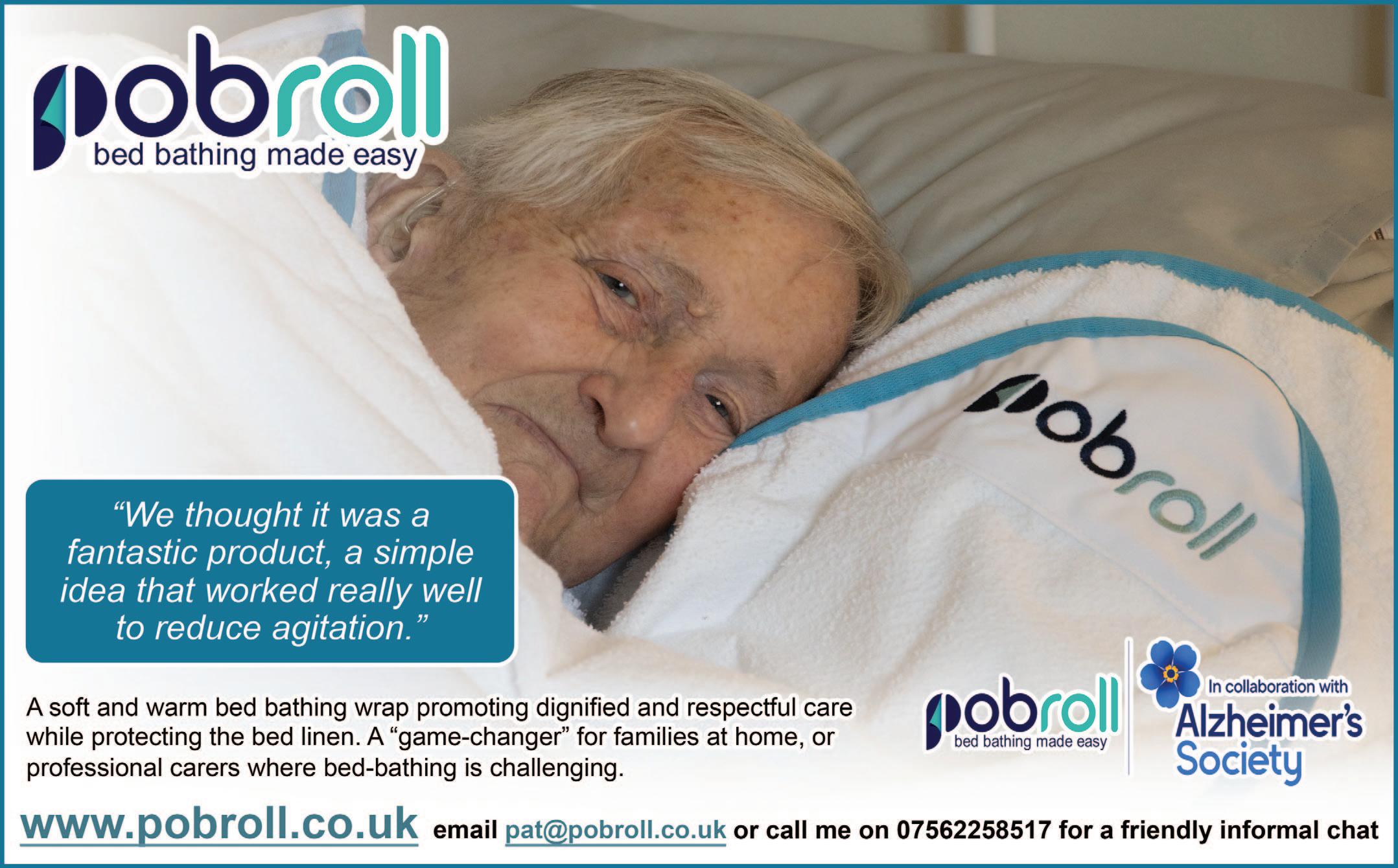
By Dr Angela Brown, Founder and Chief Executive Officer of Training

It doesn't take a government report to confirm what everybody in adult social care already knows and can evidence.
While a commission for strategic long-term change is welcome, there are also several quick and easy changes which the government
could swiftly implement to significantly improve the sector in the shortterm.
A start would be to focus recruitment on the individual progression plan of the care worker. Afterall, surely a sector which traditionally has poor pay and responds to ever changing societal needs, deserves some control over what are perceived are important skills.
The sector still relies on recruitment via word of mouth and offers low pay and low recognition of the skills required in adult care as an incentive. While the workforce needs to respond to the needs of employers, we have a duty to understand the needs of the carer by providing progression of their own career pathway.
The early years sector faced a similar challenge with public perception. Since no one needs a qualification to have a child, it was perceived by many – and even some in government – that the skills required to work in the sector simply came natural.
Although the early years sector has not yet chased all of its demons, public perception of the skills required undertook a change andlargely helped by the excellent Sure Start system - parents began to understand the value of having a skilled workforce to look after our children. It seems an alien concept to us now, but it is very much where we’re at with care, and it doesn’t need to be that way.
In care today, we’re constantly seeing headlines of endemic staff shortages and staff burnout, but this could be significantly improved if the expectations of the sector are proactive rather than responsive.
This is what the Commission may conclude, but in the short-term, we need to invest in the current army of the workforce whose goodwill and compassion is relied upon to respond out of decency rather than an identified societal need.
Demands on the NHS can also only be supported by an adult care sector which is respected for the skills they possess.
For 2025 to herald in some immediate change, let’s utilise Government skills funding and Department of Social Care workforce development programmes to really drive the sector forward.
Let’s find out what the people receiving care really want from their care plan and let them have a say in what the devolved authorities are spending on.
Let’s be ambitious and listen to the sector, use its expertise and plan for a service which not only works well in conjunction with the NHS, but one which is respected and rewarded.
Let’s make 2025 the year we start seeing real change in the care sector.

The social care provider organisation, The Independent Care Group (iCG) has taken the unusual step of highlighting the vital care of older and vulnerable adults in a song!
The iCG has just released a charity song called ‘Who Cares?’ proceeds of which will go to The Care Workers’ Charity.
The song has been co-written by iCG Marketing Executive Brian Johnson and performed by co-writer, Ivor Novello-nominated singer-songwriter Boo Hewerdine.
A video to accompany the song features footage taken at social care locations in North Yorkshire. The project has been sponsored by Hempsons, leading health, social care and charity lawyers. It is part of a long-term campaign by the iCG to promote and highlight social care and fight for improvement to the sector.
Mr Johnson said: “When I joined the iCG in 2023, I mentioned to iCG Chair Mike Padgham that I wrote songs in my spare time, he said, ‘We need a song for the care sector!’.
“Over the next few months, whilst getting to grips with my new job, I began to develop a lyric that tried to capture ‘moments’ from the lives of carers and the people they care for. The phrase ‘Who Cares?’ seemed to work well for the chorus, so slowly it came together.”
Armed with the words, Brian approached his friend Boo Hewerdine who has had songs recorded by kd lang, The Corrs and Eddi Reader and has been described by BBC Music as “one of Britain’s most consistently accomplished songwriters.” The pair had previously had some success with a collaboration that reached No.1 in an iTunes chart in New Zealand.
“We began writing together during lockdown, just after Brian attended a songwriting workshop I’d run,” said Boo. “We seemed to click immediately and have written a number of songs together over the years –a couple of which appeared on my EP release ‘Singularities.’ One of the songs, ‘The Night is Young’ is now one of my favourites and I perfom it at nearly every gig.”
“Boo is based in Glasgow and I’m in North Yorkshire,” added Brian. “Due to my day job and Boo’s various touring and recording commitments, we don’t get together in the same room that often, but we found
remote collaboration works for us. We met up online as usual for ‘Who Cares?’ and within an hour Boo had come up with a beautiful melody to accompany the words.”
The basic track (Boo singing and playing guitar, with top session musician Euan Burton on double bass) was recorded last summer but Brian felt it needed an extra element.
“We always felt more voices in the chorus would work well, so approached my friend David Wheale-Davey, musical director of The Skipton Choir, about arranging some choral parts for the song. He did a lovely job but as his choir were busy with preparations for various concerts, I had to look elsewhere for a group to perform on the recording.”
The answer came even closer to home. “I’d recently joined ‘Sing Out! South Craven,’ a new community choir based in my village of Glusburn. I asked if they’d like to get involved and despite only having formed a few months previously, they more than rose to the challenge.” The choir was recorded in their own rehearsal space at Glusburn Institute.
To accompany the song, Brian has directed and edited a video, shot by Silsden-based film-maker Dawn Feather at yorkshireedit.co.uk

The pair filmed sequences with staff and residents in care and nursing homes belonging to Mr Padgham’s Saint Cecilia’s Care Group and with ubu in Harrogate, who support vulnerable adults to live independently in their communities.
“We’ve known each other for years but we’d never worked together,” said Brian. “Dawn is currently creating a beautiful documentary called ‘Joy ‘O Dance’, exploring how participation in dance and the arts positively impacts young people’s mental health, but she kindly broke off to help me on this project. I knew Dawn was really good with people and puts them at ease whilst filming, so we were able to get up close and personal and capture really special ‘day in the life’ moments and interactions between carers and their clients,” said Brian. “We were so privileged to be able to get access to their lives for a few hours and share the positive aspects of the care world and I think the images shot really support the song’s tone.”
The song, distributed by Horus Music, is available to purchase as a digital download at: https://thecareworkerscharity.bandcamp.com/track/who-cares
90th Birthday with a Nostalgic 1950s Party
Rivendell View Care Home in Nottingham recently marked what would have been Elvis Presley’s 90th birthday with a funfilled, nostalgic celebration that transported residents back to the 1950s.
On January 8th, the care home hosted a day of Elvis-themed activities, including a 1950s-style dress-up, karaoke, reminiscing, and an Elvis activity booklet that had everyone all shook up with excitement.
Among the many residents who participated was 84-yearold Joyce Rowbotham, an Elvis superfan who has fond memories of the King of Rock and Roll’s early days.
Joyce, who worked at the Grand Cinema in Mansfield during the release of Elvis’s first film Love Me Tender, shared her personal memories of the star’s meteoric rise to fame:
‘I worked at the Grand Cinema on the day his first film was released, Love Me Tender. Everybody loved Elvis, and the cinema was packed. We had to put extra shows on to keep up with

the demand,’ Joyce recalled.
‘When the film started playing, the ladies were screaming. I remember the day as if it were yesterday. I was really happy when I read there was an Elvis day on the planner.
I could listen to his songs all day long.’
Joyce’s enthusiasm was shared by many other residents, who enjoyed singing along to their favourite Elvis hits, dressing up in 1950s fashion, and reflecting on the cultural impact the legendary musician had on their lives.
Lisa Tungate, the Home Manager at Rivendell View, added, ‘Our team at Rivendell View went above and beyond to make the day special, ensuring that the celebration was a fitting tribute to one of the most iconic figures in music history.
The event not only brought back cherished memories for residents but also highlighted the power of music to connect generations.’
Older people are nearly a third more likely to go into a care home after spending time with their family over the festive season, according to new data released by review site carehome.co.uk.
Over the last three years, carehome.co.uk has seen a dramatic increase in traffic in January, compared with figures in December. In January 2024, the number of visitors to their site surged by 32% with over 375,000 extra visitors to its website compared with the month before. In 2023, the number of visitors to their site rose by over 342,000 and in 2022, by just over 258,000.
The festive season often acts as a turning point, as families come together for a longer period and notice a decline in the health, mobility and independence of their loved ones.
The emotional and physical strain of caregiving, coupled with a rise in loneliness and illness during the winter months, drives many families to look for full-time residential care for their loved ones at the start of the new year.
Data reveals that the average fee for people paying for their own residential care in the UK is £1,160 a week. So, it is not surprising that
the complexities of funding residential care and uncertainty over how families will pay for it, also adds further challenges to those looking for care and making these difficult decisions in January.
Additional data also shows that out of over 38,441 care seekers who made care enquiries between 1 November 2023 and 31 October 2024, over a fifth (21%) of people seeking care did not know how their care would be funded. As few as 16% reported they were able to access local authority funding.
These figures reveal the emotional and financial pressures families face after the holidays, as they seek to secure the best care for their loved ones in the face of rising costs and limited funding options.
Sue Learner, editor of carehome.co.uk said: “Spending time with family is a wonderful part of the festive season, but it can also bring to light the harsh realities of ageing. Over Christmas, relatives often spend extended time with their older family members and for many, this can be the first time they notice changes in mobility, memory, or overall well-
Guild Care is delighted to announce a significant development that will help shape its future and strengthen its ability to support the local community with the acquisition of ‘Saxon House’, a large, modern building situated in the heart of Worthing.
This acquisition marks a major step forward in making their vision a reality, enabling them to expand their services and enhance the care they provide in a modern, purpose-built environment.

Warren Fabes, CEO of Guild Care, said: “The acquisition of Saxon House is a transformational moment for Guild Care. The new facility will allow us to extend our reach and enhance the services we provide to the local community. We are excited
about the opportunities it creates for the people who use our services and our staff & volunteers, and ensures that we can continue to deliver compassionate, effective, and accessible care in a bright, modern, and supportive environment.”
“This is a landmark moment for Guild Care as we embark on a transformative journey that will have a lasting positive impact on those we serve. We look forward to a bright and inspiring future with Saxon House at the heart of our community. We would also like to extend our heartfelt thanks to Mike Holland, a Patron, major donor & long term supporter of Guild Care, whose generous donation has contributed significantly to enable this acquisition”.

being. These realisations can be difficult and emotional, prompting tough conversations about the best way forward.
“The surge in traffic we experience every January reflects the challenges many families face and shows the huge value of having access to quality care home reviews and care information to help people navigate a complex social care system.”



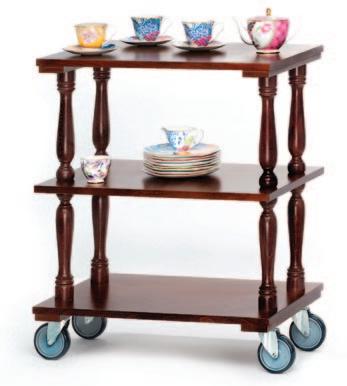

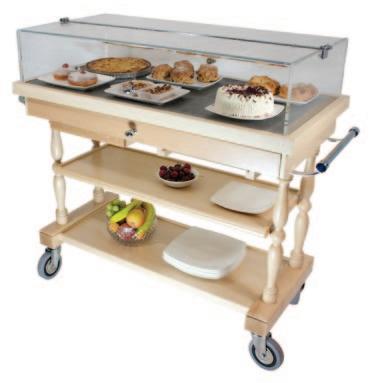
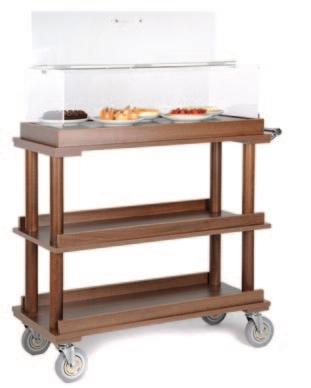
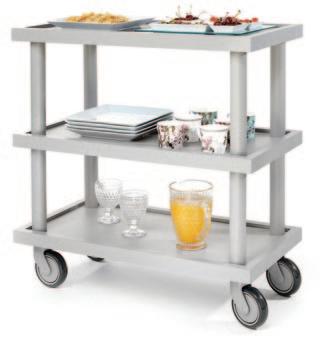
about a delicious
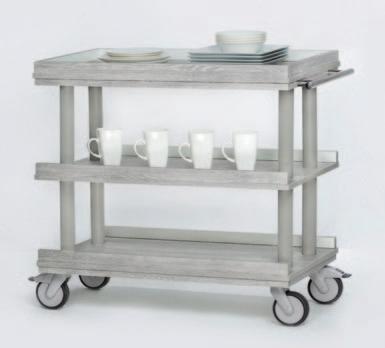
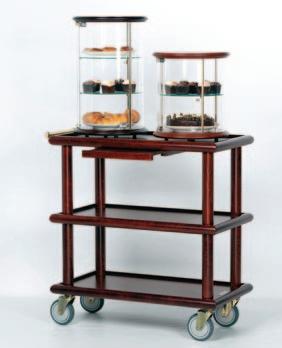
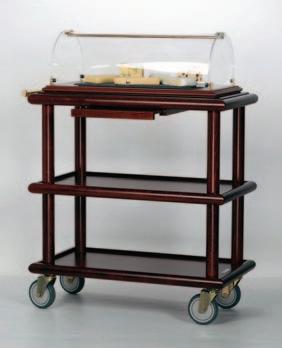
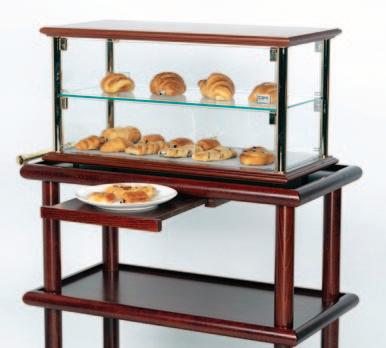
Under-25s (Generation Z) have much to offer the world of care, especially as it progresses. In a constantly adapting industry, young people are key to helping care companies grow with the times, especially surrounding technology.
However, young people make up only 11% of care workers. Why is this? What is keeping Gen-Z from joining and staying in the world of care?
With the average care worker aged 45 and over a quarter of the workforce potentially choosing retirement in the next 10 years, there aren’t enough young workers to pick up the many mantles left behind. With social care already having the highest number of vacancies in the UK, care providers cannot afford for this number to grow and for their workforces to decrease.
Supporting service users is no 9-5 or Monday to Friday job. This alone can be off-putting to the under-25s, who may juggle education and prioritise a larger social life.
This is what Gen-Z values. They have entered the career world understanding the importance of mental health and their worth in the workplace - and they are often viewed negatively for this. But they couldn’t be more correct.
Just as care services get a bad rep for offering a poor work-life balance, Gen-Z gets a bad rep for prioritising a healthy one. You can see the dilemma. So, how can this be fixed?
Irregular, unsociable hours, poor workload management, and low resources can easily lead to poor staff retention. From the most recent

findings in 2021-2022, care saw a high turnover rate of 53% for those under 20 years old while care workers over 60 had a rate of 24%.
It’s common for shift-based workers to feel they have very little control over their working lives, leading them to accommodate the shifts they have no say over. Especially due to last-minute scheduling and changes, many shift workers often must change or completely scrap personal plans - or wait until after shifts are allocated - resulting in lives only revolving around work.
As much as someone can be a work-first individual, removing time
By Becky Mundie, RotaCloud
for personal and social lives - and simply downtime - can be damaging in the long run, causing stress and mental health issues. Factor in graveyard shifts or being on-call, and the feeling is greatly exacerbated.
Is there any wonder, when combining this with the high workload and responsibility that comes with care, that the under-25s - the generation valuing mental health - make up so few care workers?
There are simple ways to remedy this, however.
Simply offering flexibility, allowing staff to have a say in the days and hours they work, and offering the ability to oversee shifts further in advance, can make all the difference.
Implementing digital automation allows staff to feel more in control of their work and lives. This alone can greatly improve employee experience.
Surprisingly, employee experience can go hand-in-hand with updated technology - and what goes hand-in-hand with technology? The generation that has grown up with it.
Not only does digital automation benefit your service users, employees, and overall business growth, but it will also make your workplace more attractive to the new generation - who, once joining, can make adopting these new technologies and processes all the smoother.
Under-25s are the future, as well as new technologies. It’s time to start investing in both.
A school in Surbiton is helping veterans in its local care home by taking part in a charity walk.
Twenty pupils and teachers from Southborough High School will raise money for Royal Star & Garter when they take part in the 10km Winter Walk through London on Saturday, 25 January. The school visits the charity’s Surbiton Home regularly, and hope to raise £1,500.
Pupils from the school in Hook Road have been visiting the Surbiton Home since last year, as they work towards their Young Leaders Award. Royal Star & Garter residents have also been to Southborough High to give talks to Year 7 students.
Headteacher Niall Smith and Senior Assistant Headteacher Dan Edwards will join pupils in the Winter Walk, along with school governor Matthew Iles. Mr Edwards said: “The weekly visit of our Young Leader students is sincerely the highlight of their week, and I know residents take a great deal of joy from it too. To see the compassion and mutual respect grow between the young and old in our local community is truly inspirational. As a result of this proud intergenerational friendship, Southborough High School’s
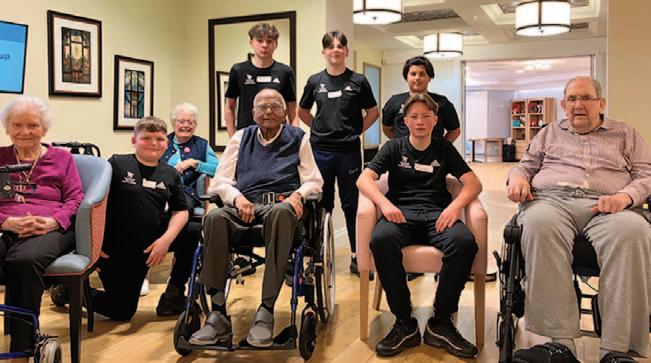
Young Leaders, and teachers, have put themselves forward for the London Winter Walk to raise funds and support the residents and staff at Royal Star & Garter.”
Southborough High will be joined on the walk by Heather Perkins and Ryan O’Connor, who are both RAF veterans, and are also raising money for the charity.
Heather, who left the RAF in 2014 after serving nearly five years, is now Senior Partnerships Officer at Royal Star & Garter. She said: “This is our first fundraiser of the year and we’d love to start with a bang and raise as much money as possible, to help the veterans we care for. I’m really looking forward to the Winter Walk, and joining Southborough High School and my friend Ryan on the start line. I’m very grateful for their support and hope we can raise lots of money!”
Ryan attained the rank of Senior Aircraftman (SAC) during his five years in the RAF, before leaving in 2013. He said: “Royal Star & Garter is a charity which helps veterans and their families, and one day that might be me and my family. So I’m really happy to be doing this for such a good cause.”
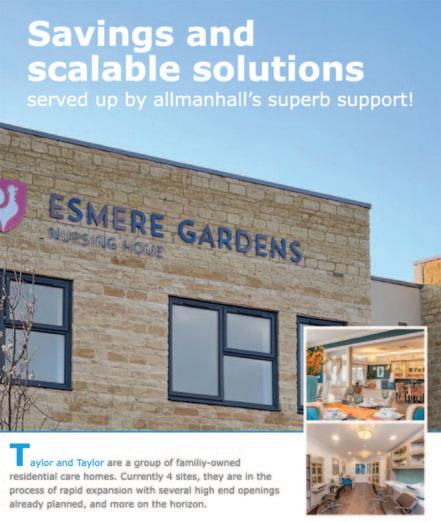
Taylor & Taylor, a group of family-owned residential care homes approached food procurement experts, allmanhall to achieve scalable cost savings and efficiencies to support their growth plans. They needed to ensure no detrimental impact to the excellent quality of their food offering and their residents’ dining pleasure.
Their desire was to achieve a 5% food cost saving and to ensure ongoing effective management of catering budgets and invoicing. Operationally, access to reports and insights were key, as was ease of ordering and management of stock and deliveries.
allmanhall undertook a like-for-like benchmark and identified achievable food cost savings of 11.4% - more than double the initial objective!
allmanhall delivered tech demos of the catering control platform for Taylor and Taylor, ensuring it met their needs and provided training for the team. As well as providing useful operational functionality like stock taking and standing orders, the catering control platform proposed would also give access to management reports and facilitate central billing and conversion of all supplier invoices in to 1 per month. Samples and on-site supplier meetings were also arranged on behalf of the homes, to confirm that the quality was to the required standard.
allmanhall have also supported Taylor and Taylor with the launch of a community engagement event for one of their newest homes.
A few months into the contract, the actual results were found to be an 18% food cost saving! You can watch this short video on You Tube to find out more…
“From day 1, the care and attention provided by allmanhall has been exceptional. The team truly listen to us, to what our challenges are and are always willing to help in any way they can. Their approach is thorough and responsive, meaning we feel fully supported. Everyone we’ve met from allmanhall has been hands-on, down to earth, genuine and considerate.
I’ve been impressed by the savings we’ve already seen, the flexibility regarding suppliers and by the excellent quality. The consolidation of invoices into 1 per month is a huge win.
We have relationships and contact with people across the allmanhall team – all there to help and to advise or resolve depending on what we need. With challenges around labour shortages and food inflation, this is hugely valued. It frees up the team and gives us peace of mind.
I would wholeheartedly recommend allmanhall’s services to others in the care sector and I look forward to continuing to grow our offering and provide outstanding food for our residents, with allmanhall as our trusted partners.”
– Chris Rees, Group Executive Chef
allmanhall is an owner-managed, award-winning and trusted food procurement partner for care organisations across the UK. We help clients with a range of needs, including cost savings, administrative efficiencies, supplier management, dietetics and nutrition support, and sustainability goals. Get in touch to find out more:
Email: hello@allmanhall.co.uk
Telephone: 01225 745520
Website: allmanhall.co.uk
LinkedIn: @allmanhall


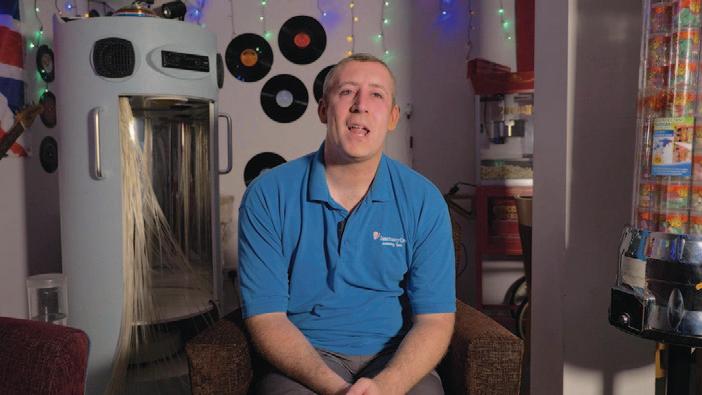
Nick Barry, Activities Coordinator at Sanctuary Care’s Allanbank Care Home (www.sanctuary-care.co.uk/care-homes-scotland-dumfries/allanbank-care-home-dumfries) in Dumfries discusses the beneficial role of music and entertainment for care home residents, whilst drawing on his own experiences of entertaining residents through his cabaret shows, for which he transforms into his alter ego, Miss Tiffany Rose!
Music has a unique ability to connect people on so many levels, offering benefits to care home residents that go far beyond entertainment.
Music therapy has been shown to enhance wellbeing and even reduce pain and anxiety . It can evoke powerful memories and help residents living with dementia to reconnect with their past, triggering emotions and feelings that might otherwise be difficult to articulate. At Sanctuary Care, we have witnessed the profound impact that
musical experiences have on our residents, creating a sense of continuity and connection that are at the heart of a fulfilled, meaningful and happy life.
ENCOURAGING SOCIAL INTERACTION
Music is incredibly powerful for encouraging interaction and strengthening bonds amongst residents, staff, and families. That’s why our programmes of tailored experiences are often built around musical themes. From opera to rock music—there’s always something for everyone.
In Allanbank Care Home, we introduced Karaoke Fridays which have become a firm-favourite amongst our residents. What started as a small idea is now a cherished part of the calendar here, with residents joyfully singing and dancing to their favourite tunes, which often take them back to their younger days.
These group-led experiences cultivate a sense of belonging, creating a warm, welcoming atmosphere and strong community within our care home.
FOSTERING CREATIVITY
Musical entertainment and theatrical performances also offer numerous emotional, social and cognitive benefits for care home residents.
As a former cabaret performer who went by the stage name Miss Tiffany Rose, I now work with the team to entertain our residents with unique shows and tribute acts.
These range from musicals such as The Sound of Music and Sister Act, to Elvis tribute performances, which began after our residents expressed how much they love singing.
The performances are truly collaborative efforts, with staff and residents joining in. This creates an all-important sense of purpose, with

the residents knowing they are part of something special.
CREATING A SENSE OF CALM
The calming benefits of music are well-documented; there are many studies showing that engaging with music can boost your mood, whilst reducing anxiety and depression and promoting overall wellness.
We’ve seen this first-hand in our Namaste sessions, where we play calming and thought-provoking music that leaves residents feeling relaxed and uplifted. Witnessing the transformation amongst residents during these sessions is incredibly rewarding.
A HOLISTIC APPROACH
When it comes to integrating music and entertainment into our care homes, we feel it’s important to take a personalised approach, focusing on each resident’s individual passions.
Upon moving in, we learn from our residents and their families about their favourite musical genres, songs and artists. This enables us to tailor our programmes to create vibrant, fulfilling musical experiences that we know our residents will truly enjoy, bringing connection and enrichment to each and every day.
Exemplar Health Care, a provider of nursing care for adults living with complex and high acuity needs, has begun construction for its latest care home located on Irwell Street, to be built on the site of the former police station.
Due for completion by January 2026, the new home will be named Jubilee Heights and will provide comprehensive support to adults living with complex mental health needs, dementia, neuro-disabilities, and physical disabilities.
Featuring 40 spacious en-suite bedrooms split across four units, the home will follow Exemplar Health Care’s small group living model, which provides a more homely, supportive, and responsive care environment. The home will feature communal dining and living spaces, senso-

ry bathrooms, a salon, activities hub and a dedicated therapy room. It will have its own multi-disciplinary team including Registered Nurse’s, Health Care Assistants and the support of a regional Physiotherapist and Occupational Therapist offering a holistic approach to care and support. Once open, Jubilee Heights will be Exemplar Health Care’s sixth care home in Greater Manchester, with the organisation already operating in Ashton-under-Lyne, Rochdale, Stockport and Wigan.
The construction of Jubilee Heights is set to make a significant positive impact on the local community by generating approximately 100 new healthcare jobs. Exemplar Health Care will be recruiting a diverse range of positions later this year inclusive of care, nursing, management, administrative and care home support.
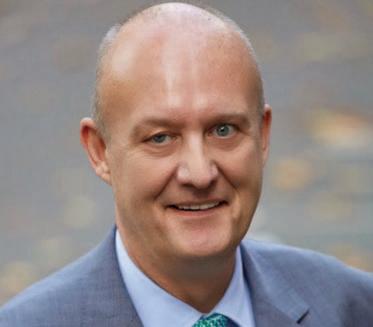
A White Paper commissioned by Care England has suggested that an innovative mattress-turning system has the potential to prevent pressure ulcers occurring for people in adult social care, while improving their comfort and promoting healing – all while delivering significant cost and resource savings to care providers and the NHS.
The paper, called Preventing Pressure Ulcers: The Role of Automatic Lateral Turning Systems for Innovative Approaches to Pressure Ulcer Prevention in Care Homes examines and summarises a 12-week trial of the Levabo Turn All automatic lateral turning system (ALTS), developed in partnership with Algeos Ltd (UK).
The White Paper says that pressure ulcers are one of the most painful and preventable conditions faced by some of the most vulnerable individuals in adult social care.
Care England, the voice of care, is a registered charity, is the leading representative body for small, medium and large providers in England.
The report stated pressure ulcers affect 700,000 people a year in the UK at a cost to the NHS of £1.4 to £2.1 billion a year.
It added that “the realities of staff shortages, increasing demand, and the need for manual repositioning often place an undue burden on both caregivers and residents,” so residents did not always receive the attention they needed to ease the pain caused by their ulcers.
Furthermore, Professor Martin Green OBE, Chief Executive of Care England, said “technological solutions like this would not only ease the workload of the caregiver, but it would also offer a more dignified care solution to the individual as well as an improved quality of life”.
The trial took place in three care homes in the UK and involved 24 residents across 12 weeks, addressing manual repositioning for pressure ulcer prevention using the Levabo Turn All solution which is an automatic tilting system (ALTS) that helps prevent and treat pressure ulcers by positioning a person in a 30-degree side position alternating between the right and left side. The system can be used in any healthcare bed with a removable mattress, where it is placed under the mattress.
The trial focused on residents with dementia with multiple and complex comorbidities, and those receiving palliative end-of-life care who are particularly vulnerable to pressure ulcers due to immobility and frailty.
The primary aims were to assess the effectiveness of the system in reducing pressure ulcer incidence, its impact on caregiver workload, resident comfort, and overall cost-effectiveness.
During the trial, the system was successful for residents with both dementia or dementia with challenging behaviours; existing pressure ulcers/vulnerable at-risk skin; limited or no mobility; pressure ulcer prevention and treatment; end of life/palliative care; critical illness and spinal/neurological conditions.
Key findings from the trial included that using ALTS in a care setting has several key benefits, particularly for residents at risk of developing pressure ulcers and those in end-of-life palliative care.
The system was effective in preventing and managing pressure ulcers by automatically repositioning residents, thus reducing prolonged pressure on vulnerable areas, significantly lowering the risk of further breakdown of skin without unnecessarily disrupting residents, leading to improved sleep and quality of care by automating the manual task of turning residents which can be every 4 to 6 hours, day and night requiring two caregivers’ time and effort to reposition. The system freed up caregivers’ time to focus on other critical tasks and areas of care – often up to two hours a day per person.
The White Paper also found that use of the system delivered cost savings in preventing the occurrence of pressure ulcers and the need to treat them.
In addition, residents using ALTS generally showed fewer signs of discomfort or agitation during repositioning, an important factor for those with dementia. The report stated for residents in palliative care, ALTS provided a gentler, less invasive approach to repositioning, supporting their comfort and dignity during end-of-life care.
One of the homes taking part in the trial, the Taylor and Taylor group, said that each caregiver would save two hours a day through not having to manually turn an individual during a 24-hour period. Given 11 people needing this facility, that would save 22 hours a week which in monetary terms based on an average salary, equates to circa £1,600 a week and roughly the same cost of one system itself.
Professor Green said: “The trials have shown that a system of this type can in many cases provide big benefits in pain reduction and healing for the individual, while easing the burden of care to the caregiver and doing so at a net saving of cost to the care provider or allowing them time to support other aspects of their care plan”.
“The trial has shown that once again, technology can work hand-inhand with excellent care provision to offer dignity, pain reduction, and enhanced healing to those most in need of it.”
Beth Mercer, Commercial Manager at Algeos Ltd (UK) said: “The trials have shown exactly what we hoped – that the Levabo Turn All system not only makes life more bearable and dignified for the individual by reducing their risk of pressure damage, pain and discomfort; it eases the workload and burden of repositioning to staff, freeing up time to focus on other aspects of care, and demonstrated time, cost savings, and efficiencies thus providing benefits to caregiver and care receiver alike.”

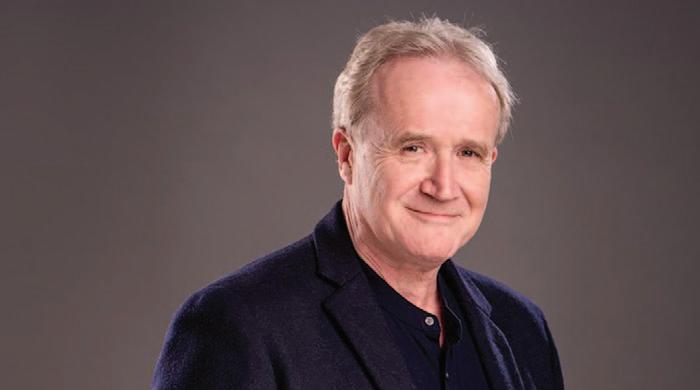
Thousands of people have been cheated out of a good quality of life due to years of inaction on social care reform, providers said today. As the Health and Social Care Committee inquiry into the cost of inaction on social care began today, the provider organisation, The Independent Care Group (ICG) says the lack of reform is a scandal that shames the country.
It is 14 years since the publication of the Commission on Funding of Care and Support’s ‘Fairer care funding’ report by Sir Andrew Dilnot. The committee, chaired by Layla Moran, is discussing the impact of inaction on social care in that period.
But the ICG says the period of inaction goes back over three decades and called for action to prevent even more people from going without the care they need.
ICG Chair Mike Padgham said: “Thousands of people being cheated out of the care they need to enjoy a good quality of life is the real cost of inaction on social care, which goes back three decades, not just 14 years.
“Whilst the Government has announced a commission on social care,
we agree with Sir Andrew Dilnot when he told the committee today that it shouldn’t take three years for that commission to report. It needs strong political leadership to make it happen.
“We have now reached a point where there are 2m people living without the care they need and very little sign that things are going to get any better, with the current Government looking intent on kicking the issue down the road again.
“In 2025 that shames the country and shames politicians who have let it get so bad.”
The ICG is worried that the Government’s commission on social care will delay tackling the crisis.
Mr Padgham added: “The commission is welcome and as care providers with lots of expertise, knowledge and experience, we are keen to work with Baroness Casey and contribute to that process.
“But we are also very keen that it isn’t used as another delaying exercise and that action to improve social care happens in the meantime.
“We know the commission won’t report for the first time until at least mid-2026 then again in 2028 and who knows how long it will take to implement any recommendations. People going without care and providers who deliver care cannot wait that long for things to change.
“In the meantime, we call on the Government to take immediate action, invest the minimum £2bn extra needed to tackle short-term issues, pay social care staff properly and in line with their NHS colleagues and get on with creating a National Care Service that brings NHS and social care together under one roof.
“We can’t delay. After all, you don’t let rain fall into your home while you get a quote for a new roof.
“The Government is intent on reforming the NHS, but we
Staff and residents at Barchester’s Chorleywood Beaumont care home in Chorleywood are celebrating the arrival of their brand-new mini bus.
Residents from Chorleywood Beaumont are already planning where they would like to go including a visiting the theatre, an outing to Chiltern Open Air Museum and a trip to Brighton to eat some fish and chips along the sea front.
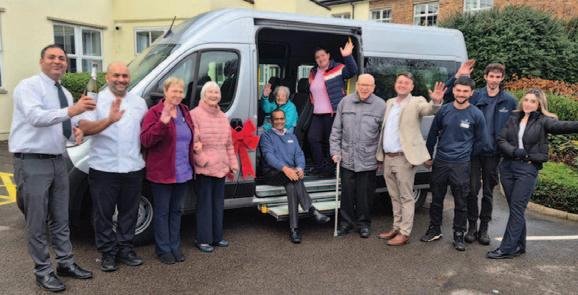
Razvan Nica, General Manager at Chorleywood Beaumont commented: “It is absolutely wonderful to be able to take our residents out for trips. We have all been looking forward to the
delivery of our new mini bus. Our residents have enjoyed all sorts of trips out and have a long list of places they are looking forward to visit. What an amazing way to kick off the New Year as nothing beats some fresh air and a change of scenery to blow away the cobwebs.”
Flora Richards, a resident at Chorleywood Beaumont, said: “For my 100 birthday the staff took me and my friends to Brighton. It was a magical day and bought back so many happy memories as it is where I grew up. We are planning a return trip this summer and I can’t wait. The staff are amazing and do so much for us all.”
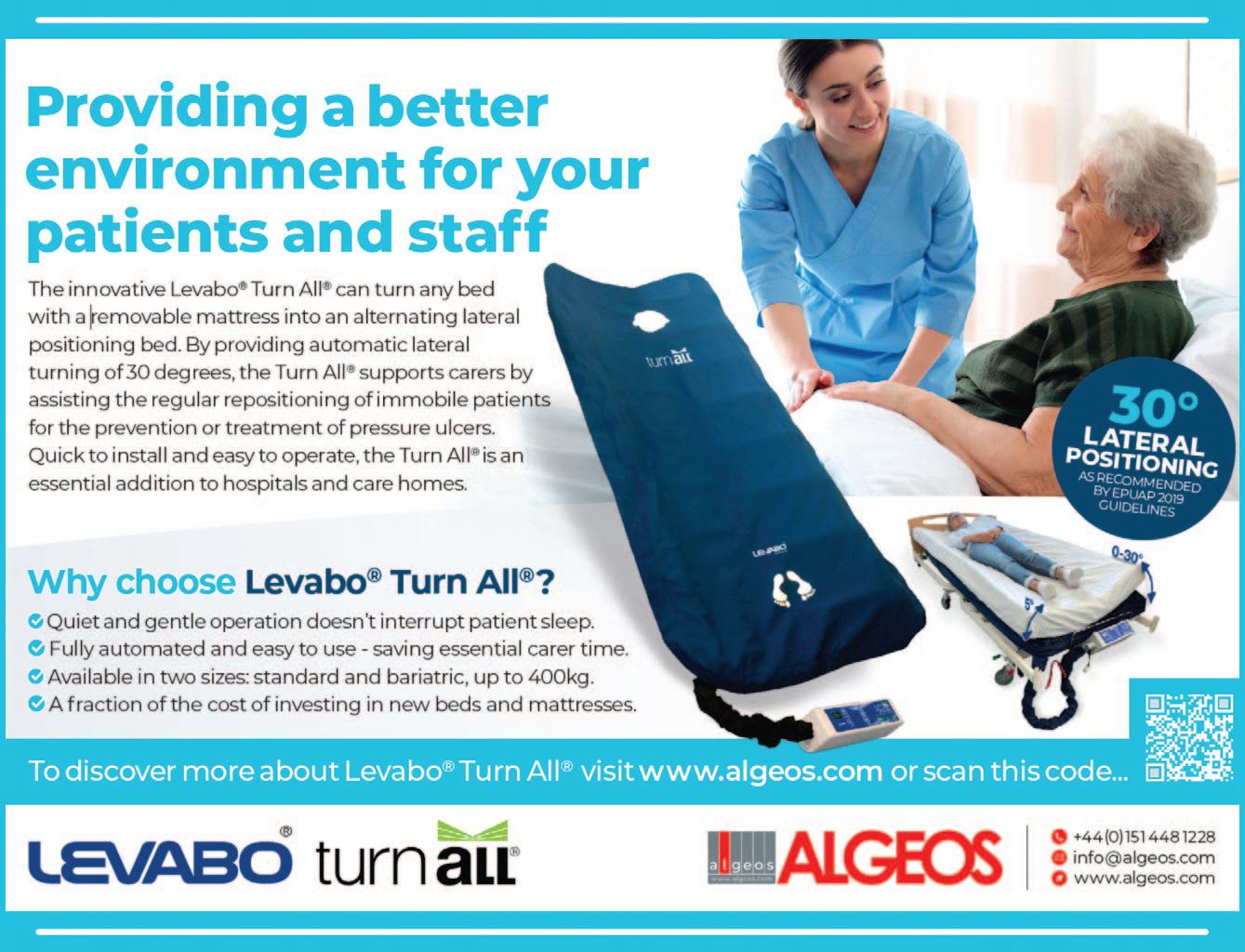
cannot do that without fixing social care and we cannot wait until 2026 and beyond for that to begin.
“The warnings are very clear. The rise in Employer’s National Insurance Contributions and increases in the National Living and Minimum wages will add £2.8bn to providers’ costs and create real hardship this spring so we need action now to save the sector from further loss of provision.
“A survey of providers by the Care Provider Alliance found that 22% were planning to close their business; 73% will have to refuse new referrals from local authorities or the NHS; 57% planned to hand back some contracts and 64% feared having to make staff redundant.
“Years of inaction have taken a very heavy toll on people who need and rely upon social care and upon those who provide it. We cannot and must not wait any longer for reform to begin.”

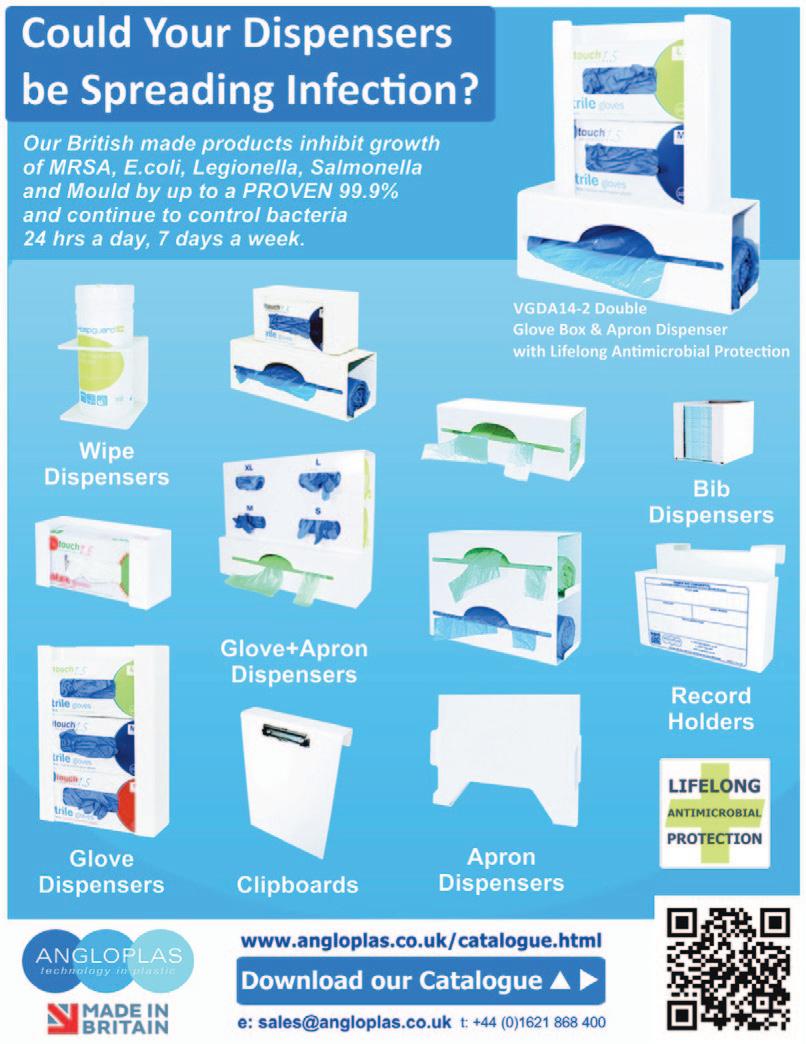
By Jo Henney, CEO at Nugent (www.wearenugent.org)
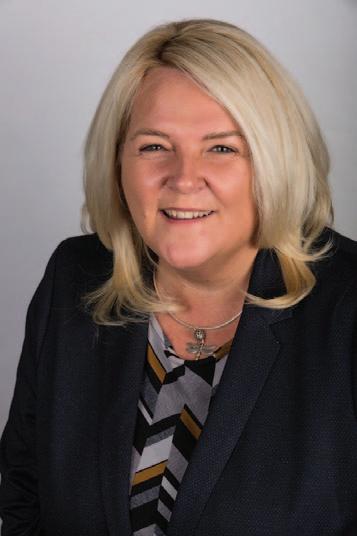
At Nugent, it is our desire to work with the Government to get Britain back on its feet and to protect our nation’s vital services, but I also understand the ongoing anger and frustration regarding announcements that have been made since last year’s General Election.
As a Real Living Wage employer to 440 staff, increasing employer National Insurance while lowering the secondary threshold, will cost Nugent as a charity an additional £500,000 per year on top of the already confirmed annual cost of living salary increases - a combined figure closer to £1m per year.
I know this will be detrimental for many organisations, not just charitable, but I believe that if the Government could do more to support the voluntary sector at this time it would.
On Friday we heard from Wes Streeting about plans for a new independent commission to reform adult social care as part of Labour’s proposed National Care Service.
There has been backlash about the time that this is going to take, with a final report expected in 2028. However, reforms like this do take time and rightly so - there would be more cause for concern if the Government was claiming it could fix the social care crisis in a year - we need to be realistic, fix the root cause and create a sustainable future plan. Ideally, interim measures could be introduced to alleviate some of the concerns in the short term, whilst longer term, sustainable solutions are identified and brought in.
Looking to 2025, more needs to be done to address staff burnout, retention and promote care work as a respectable and skilled career choice.
Projections just a few months ago showed that approximately half a million more workers are needed in the social care sector and vacancies are at around three times the national average.
Clear, well-supported career training pathways and access to mental health resources are essential in order to build a resilient, long-term workforce.
I can see that the Government is taking steps to professionalise the workforce with fair pay agreements being legislated to fill more than 100,000 vacancies, alongside the £2,300 rise in carer’s allowance to support family carers.
But initiatives like upskilling care workers to deliver basic checks such as blood pressure monitoring would make a huge difference in relieving pressure on the NHS, while arming care workers with the tools to feel fulfilled in their roles.
The NHS and social care sector need to be more cohesive, with a shared digital platform to access medical information and ensure a seamless service for all service users across multiple touchpoints.
Better use of technology will inevitably ease pressure and increase independence for those being supported by the care system.
Virtual consultations, remote monitoring of chronic conditions and automated medication management will make life easier for the NHS, care workers and the people they support.
And finally, community care (as always) needs to be a priority; initiatives that bring younger and older generations together, such as volunteering, mentoring, or shared living arrangements can help reduce agerelated isolation, pressure on the care workforce, and build a more compassionate and equitable society.
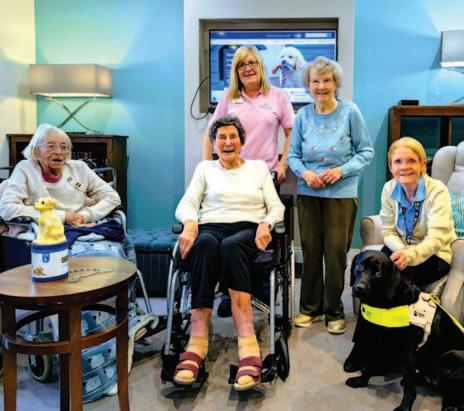
Scotland’s The Orchard Care Home in Tullibody, Alloa, joined forces with an artist and a local school to create a beautiful mural for residents.
Staff at The Orchard Care Home approached local artist Kyle Blain to create a mural in their new garden area. An unused garage wall was identified as the most appropriate background for the mural, as it would allow residents to enjoy the finished artwork from lounge and bedroom windows.
Kyle was keen to have the resident’s input into the creative process, which led The Orchard’s Wellbeing Coordinator, Sandra Curl, to setup a residents’ committee to generate some ideas.
The Orchard residents were presented with different content ideas, and after further discussion with Kyle they settled on the idea of a tropical rainforest.
To complete the mural, Sandra approached nearby school Lornshill Academy, and pupils came along
to The Orchards to help Kyle apply the finishing touches.
Sandra Curl, HC-One Scotland’s The Orchard’s Wellbeing Coordinator, stated: “The new mural intends to inspire residents, workers, and visitors to see Alloa as a hub of opportunity and creativity. The beautiful artwork will be greatly appreciated by our residents.
“This project will enhance the beauty of our community while cultivating a strong sense of ownership and creativity, paving the way for a brighter, more inclusive future.”
Artist Kyle Blain said: “I thought this was a fantastic idea and was more than happy to get involved.
I’m so proud of how this mural turned out and can’t wait to see how it complements the garden in the summer, with the residents relaxing and enjoying the space.
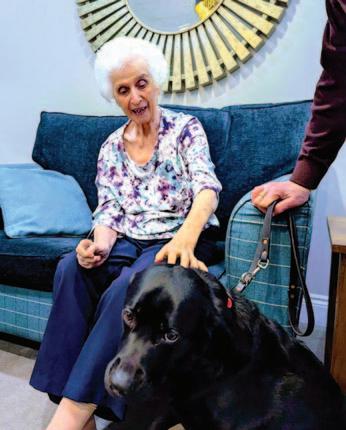
“A massive thank you to Sandra and the team at the Orchard Care Home for giving me this opportunity and to Mrs Taylor and the Lornshill Academy art department for all their help throughout! I hope the residents enjoy it!”
Susan Kensdale, a resident (family member) at Sundial Care Home in Tipton St John, played a significant role in the community, as a volunteer collator for the local newspaper, Tipton Times.
Before settling into life in Tipton St John 20 years ago, Sue lived in Sidmouth where she had her son and enjoyed a long, fulfilling career as a Legal Cashier, where she worked for 24 years. Sue said she was “one of the family” there, and that’s the reason she enjoyed it so much. As retirement approached, she decided to relocate to the village of Tipton St. John, seeking a quieter life.
In 2006, shortly after her retirement, Sue’s journey with the Tipton Times began when she was recruited by her next-door neighbour who happened to be one of the editors. Wanting to stay active and connected to the community, Sue welcomed the new opportunity. Little did she know, this would lead to 12 fulfilling years as a collator for the local publication, a role that she held until she stepped down in 2021. As a collator, Sue took on the behind-the-scenes task of assembling the newspaper by hand. “After the editors finished with the stories and printed them, a half-dozen of us would sit around a table, spending three to four hours putting all the pages together,” she recalls. The work was steady and methodical, but it was also rewarding, especially with the companionship it created among the volunteers. What she loved most about her role at the Tipton Times was the opportunity to meet people and be a part of the community spirit. The team of volunteers who worked alongside her made every day enjoy-
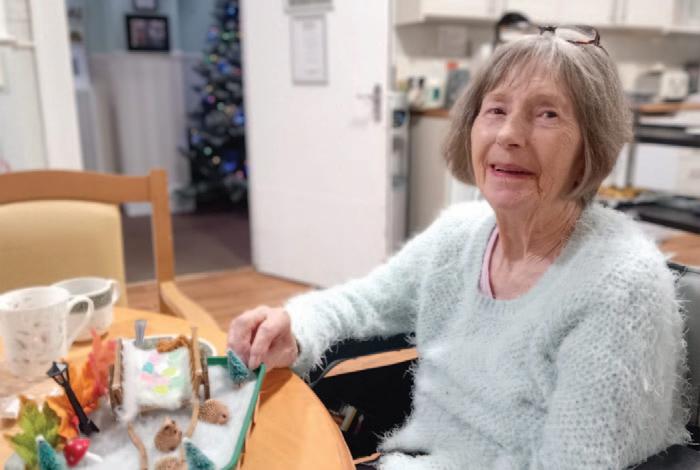
able, with plenty of conversations around the table. “There were lots of volunteers and always plenty of people to talk to. I enjoyed being a part of that environment,” she shares.
Through her years at the Tipton Times, Sue found herself immersed in the stories of her community. While she doesn’t recall any particular moment as a standout, she treasures the hours spent sifting through local news. “It was always good to spend time with the team and read
through the stories,” she says.
Now in her quieter years and living at Sundial Care Home, she has developed a love for audiobooks, which are regularly delivered to her by a volunteer from the library in Ottery St Mary. She also likes to watch television in the afternoons and spends time with the team she has built close relationships with. Sue is also a proud grandmother to two grandchildren.
We asked Sue, “What do you like most about living at Sundial?”
“I feel safe and comfortable living here, with it being close to my old home, it hasn’t changed my visits from my family or my old routine much”
We then asked, “Do you have any favourite memories here?”
“The llama visits, brilliant to see and to be around, Harry and George are great characters.”
Finally, “What are your thoughts on the community here at Sundial?”
“What makes a place is a good team, and that is what they are here. Great, friendly and always helpful, the team make the community here.”
While Sue’s work with the Tipton Times may be behind her, her contributions to the community remain an important part of her life. The friendships she made and the stories that were shared whilst collating are fondly remembered, highlighting the importance of volunteering and the simple joy of being part of something bigger than oneself.

The National Clinical Homecare Association (NCHA) and Skills for Health have launched a public consultation on the clinical homecare sector’s first ever career and competence framework.
Over 600,000 people in the UK currently receive clinical homecare, which involves the administration of medication and specialist treatment at home, to help patients – often with complex conditions – live their lives more independently. An estimated 6.8 million people are living with a health condition that could be appropriate for clinical homecare. Services are provided by the NHS and the private homecare sector in collaboration to support all patients registered on a homecare service. Services are defined by agreements between the NHS and homecare companies and are estimated to save the UK economy £264m a year.
Clinical homecare providers offer a spectrum of clinical homecare services within specialist treatment pathways for acute and long-term conditions from infections requiring intravenous antibiotics to specialist medicines for Parkinson’s Disease and home parenteral nutrition for patients who are unable to eat normally.
With demand for clinical homecare services growing, the career and competence framework lays the foundations for a robust and scalable workforce with standardised and structured career pathways to enable the workforce to develop and grow.
“Until now, variation in job roles and their descriptions has increased complexity and clinical risk of services. Contractual blockers to the ‘right capability, right time’ deployment of staff is also compounded by different commissioning approaches,” comments Alison Davis, Managing Director Pharmaxo Healthcare.
NCHA represents the majority of the UK’s largest clinical homecare providers. Formed in 2006, the association introduced the Clinical Homecare Industry Code of Practice and has worked closely with NHS National Homecare Medicines Committee and Royal Pharmaceutical Society to ensure there is a core set of pub-
lished standards that governs the provision of clinical homecare services. Committed to improving standards and promoting safe, cost effective and seamless integrated patient care, the career and competence framework is the natural next step for the sector.
Against this background, the clinical homecare career and competence framework aims to help facilitate shared understanding, decrease the potential for differences in interpretation and support robust commissioning of high-quality homecare services and equip the workforce to provide personalised, high-quality care.
An expert reference group, made up of clinical homecare sector leaders and professionals, developed the first iteration of the framework. Now, clinical homecare stakeholders, healthcare professionals, caregivers and patients are invited to contribute their views to help refine the framework before its publication early next year.

Skills for Health’s Andrew Lovegrove is leading on the consultation which opened on 7 January for six weeks. He comments: “The benefits of this model of at home care delivery means that it is imperative that the sector is afforded the room to grow.
“Clinical homecare is a lifeline for patients and their families, providing medication and specialist treatment outside of the healthcare setting, which supports them to lead better lives.
“The aim of the framework is to provide an industry-wide resource facilitating the transferability of competency within and between homecare organisations. Furthermore, it will provide a base from which to review the development of all relevant professionals working across the full range of homecare services and grow the clinical homecare workforce to meet patient needs.”
To take part in the public consultation, please visit: www.skillsforhealth.org.uk/resources/clinical-homecare-career-and-competence-framework
This winter, Recreo VR is offering care homes an exciting opportunity to enhance resident wellbeing through the power of Virtual Reality (VR). By signing up for one of our 24-month Recreo Theatres packages, you’ll receive a free VR headset and staff training.
Our platform provides person-centred, budget-friendly activities that are fun, engaging, and accessible, especially for residents who are bedbound or socially isolated. Co-created with Alzheimer’s Society and individuals with dementia, our service empowers staff to deliver personalised reminiscence and one-to-one sessions that promote memory recall and connection.
Our VR headsets have been recognised as good practice by the Care Quality
Commission (CQC), further validating their impact on care. Regular use of Recreo VR has a proven positive effect on wellbeing, with residents reporting increased activity, engagement, and social connection, often leading to a reduction in the need for PRN medication.
Whether combating loneliness, promoting relaxation, or enhancing cognitive health, VR offers a non-pharmacological solution to enrich care and elevate quality of life. Don’t miss out! Take advantage of this exclusive offer and see how VR can transform your care home experience.
For more information, visit recreovr.co.uk. Or contact us at info@recreovr.co.uk or 01482 526940.
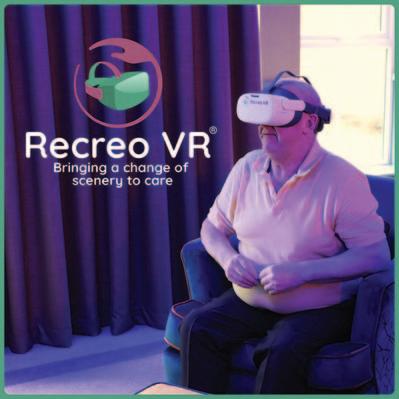
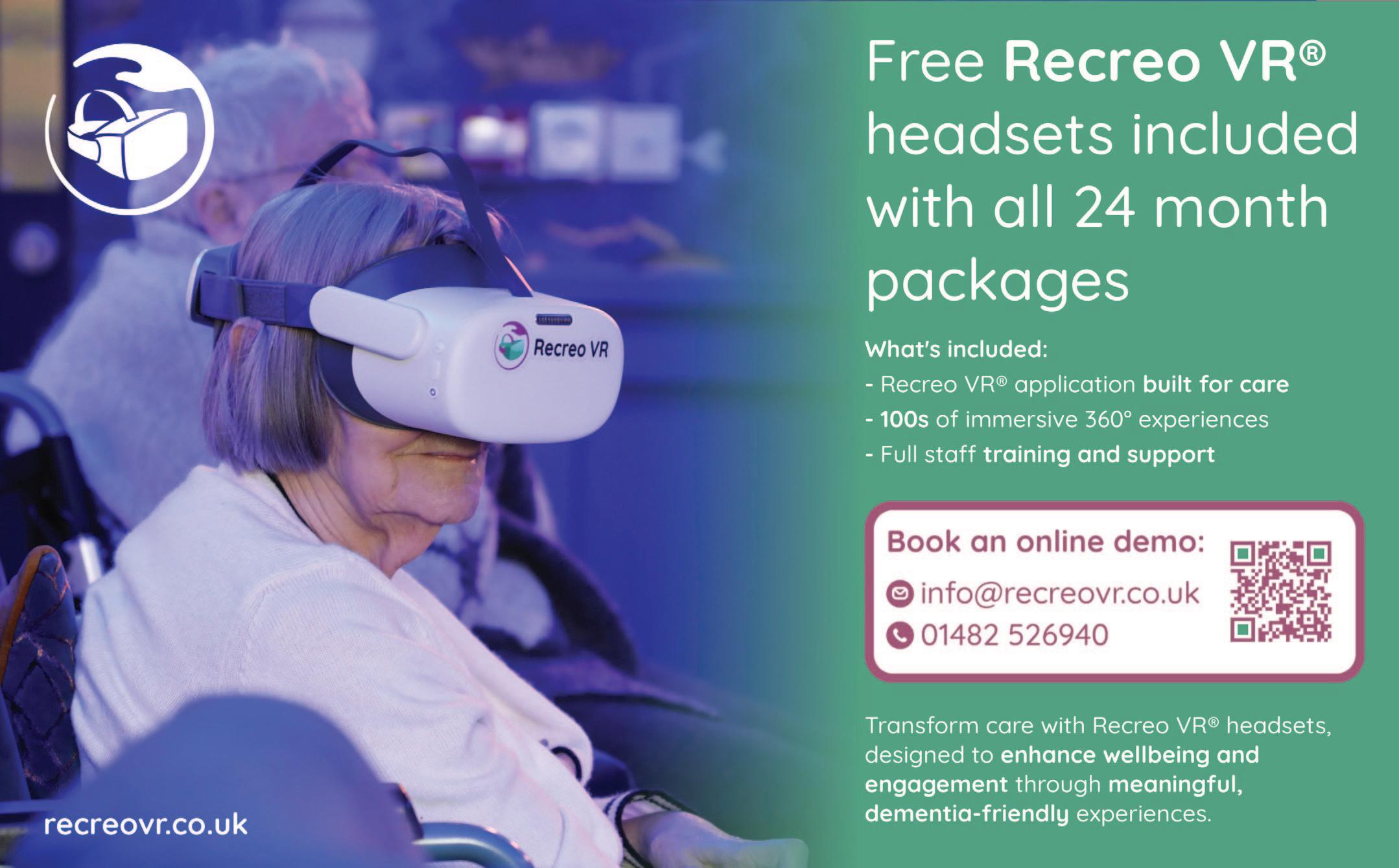
Digital Care Hub has launched a new support programme for adult social care providers with up to 50 staff in the North West, West Midlands and South West.
Funded through the Department of Science, Innovation and Technology’s Cyber Local programme, this new service will help providers to strengthen their ability to manage cyber security incidents. It includes in-person workshops, cyber vulnerability assessments, and webinars based on typical cyber incidents.
Cyber Resilient Care is being delivered by four of our local support organisations in partnership with our national team and police-led Cyber Resilience Centres. The workshops and assessments are available to ten care providers in each of the three regions and will prioritise CQC-registered services and day care. The webinars are open to all small providers.
Speaking about the launch, Daniel O’Shaughnessy, Head of Programme Delivery at Digital Care Hub, said:
“Digital Care Hub is delighted to offer this really practical support to small care providers. We know they often struggle to have specialist knowledge and skills in place to manage security incidents. Our Cyber Resilient Care programme will build their skills and confidence in an accessible, practical way based around typical cyber security scenarios that are most likely to affect small providers.
“This new programme builds on our existing work: it will be delivered by four of the trade associations that currently support our Better Security, Better Care programme. But we are also bringing in additional technical assistance from local police-led Cyber Resilience Centres, as well as adapting existing exercises and resources from the National Cyber Security Centre. So providers can be reassured that the support they receive is delivered by cyber and social care experts. It’s a great combination.”
The project is being run between January and March 2025. The following local support organisations are inviting small adult social care
providers in their regions to take part: Partners in Care Dorset and the Registered Care Providers Association, Somerset: for care providers across the South West. West Midlands Care Association: for care providers across the West Midlands.
Liverpool Social Care Partnership: for care providers across the North West.
If a care provider meets the eligibility criteria and have not been invited to take part by mid-January, they may wish to contact the support organisations.
Details available at www.digitalcarehub.co.uk/CyberResilientCare

The
Care Home in
joined forces with an artist and a local school to create a
residents.
Staff at The Orchard Care Home approached local artist Kyle Blain to create a mural in their new garden area. An unused garage wall was identified as the most appropriate background for the mural, as it would allow residents to enjoy the finished artwork from lounge and bedroom windows.
Kyle was keen to have the resident’s input into the creative process, which led The Orchard’s Wellbeing Coordinator, Sandra Curl, to setup a residents’ committee to generate some ideas. The Orchard residents were presented with different content ideas, and after further discussion with Kyle they settled on the idea of a tropical rainforest. To complete the mural, Sandra approached nearby school Lornshill Academy, and pupils came along to The Orchards to help Kyle apply the finishing touches.

Sandra Curl, HC-One Scotland’s The Orchard’s Wellbeing Coordinator, stated: “The new mural intends to inspire residents, workers, and visitors to see Alloa as a hub of opportunity and creativity. The beautiful artwork will be greatly appreciated by our residents.
“This project will enhance the beauty of our community while cultivating a strong sense of ownership and creativity, paving the way for a brighter, more inclusive future.”
Artist Kyle Blain said: “I thought this was a fantastic idea and was more than happy to get involved. I’m so proud of how this mural turned out and can’t wait to see how it complements the garden in the summer, with the residents relaxing and enjoying the space.
“A massive thank you to Sandra and the team at the Orchard Care Home for giving me this opportunity and to Mrs Taylor and the Lornshill Academy art department for all their help throughout! I hope the residents enjoy it!”
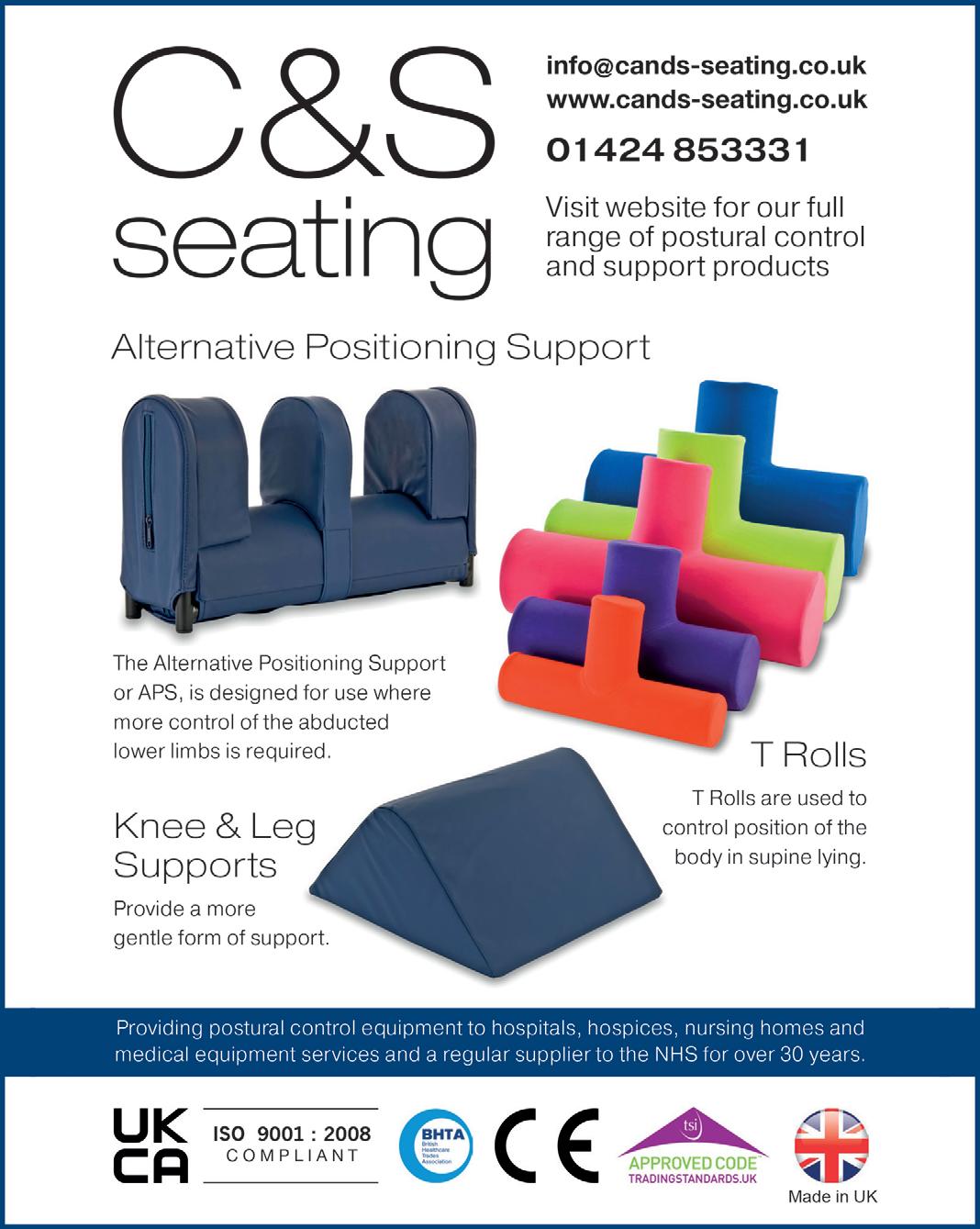


• We specialise in the sale and purchase of quality used wheelchair accessible vehicles and ambulances.
• They can be bought as seen or refurbished and sign-written to your own requirements.
• Fully serviced, new mot & warranty
• Engineers inspection supplied if required.

•


Older people are nearly a third more likely to go into a care home after spending time with their family over the festive season, according to new data released by review site carehome.co.uk.
Over the last three years, carehome.co.uk has seen a dramatic increase in traffic in January, compared with figures in December. In January 2024, the number of visitors to their site surged by 32% with over 375,000 extra visitors to its website compared with the month before. In 2023, the number of visitors to their site rose by over 342,000 and in 2022, by just over 258,000.
The festive season often acts as a turning point, as families come together for a longer period and notice a decline in the health, mobility and independence of their loved ones.

The emotional and physical strain of caregiving, coupled with a rise in loneliness and illness during the winter months, drives many families to look for full-time residential care for their loved ones at the start of the new year.
Data reveals that the average fee for people paying for their own residential care in the UK is £1,160 a week. So, it is not surprising that the complexities of funding residential care and uncertainty over how families will pay for it, also adds further challenges to those looking for care and making these difficult decisions
in January.
Additional data also shows that out of over 38,441 care seekers who made care enquiries between 1 November 2023 and 31 October 2024, over a fifth (21%) of people seeking care did not know how their care would be funded. As few as 16% reported they were able to access local authority funding.
These figures reveal the emotional and financial pressures families face after the holidays, as they seek to secure the best care for their loved ones in the face of rising costs and limited funding options.
Sue Learner, editor of carehome.co.uk said: “Spending time with family is a wonderful part of the festive season, but it can also bring to light the harsh realities of ageing. Over Christmas, relatives often spend extended time with their older family members and for many, this can be the first time they notice changes in mobility, memory, or overall well-being. These realisations can be difficult and emotional, prompting tough conversations about the best way forward.
“The surge in traffic we experience every January reflects the challenges many families face and shows the huge value of having access to quality care home reviews and care information to help people navigate a complex social care system.”
A ‘pleased and lucky’ 101-year-old lady brought five generations of her family together for a special face-to-face gathering in Winchester.
Joyce Ward welcomed daughter Heather, 77, granddaughter Hilary, 58, great-granddaughter Izzy, 26, and great great-granddaughter Aurora, five months.
Their rare all-female get-together took place at Colten Care’s dedicated dementia care home St Catherines View where Joyce has lived for more than five years.
It was only made possible by Heather travelling from her home of 15 years in Lanzarote in the Canary Islands and Izzy and Aurora making a trip from Mitcham in Surrey.
Laura Sheldrake, Companionship Team Leader at St Catherines View, explained the logistics, saying: “Hilary is the most local and visits Joyce a few times a week, keeping her and all of us up to date on what is happening with the family.
“We were thrilled when we heard the news of Aurora’s birth last summer.
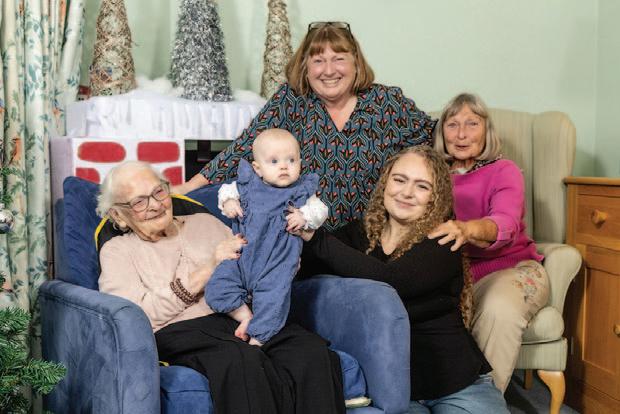
“While Izzy has since brought her new baby from their home in Surrey to visit Joyce a few times, the whole family get-together was the first time that Heather had been able to travel from Lanzarote since Aurora was born.
“We’ve made sure that Joyce has a photo of the five generations with her new great great-granddaughter to see and keep in her room.
“She was so happy when she saw the picture of the family all together in the same place at the same
time and kept looking at it and reading the text we put on it over and over.
“Joyce told us she thought Aurora was beautiful and that she was so pleased and lucky to have her here.”
Laura added: “This is the first time we have ever had five generations of the same family together at St Catherines View. It is very rare I’m sure and so special that it is five female generations.
“It was a privilege to help arrange this and take a photo for them so they have this memory to last a lifetime.”
Hilary, whose surname is Bloomfield, said: “We are so lucky to have my grandmother with us at the grand old age of 101, and for her to be able to enjoy meeting Aurora, the next generation of our family.
“The five generations were able to come together and the moment was captured forever thanks to Colten Care.”
In 2023, wheelchair user Joyce embarked on a bucket list of ten adventures leading up to her 100th birthday in May of that year with help from Laura and St Catherines View colleagues.
The experiences included horse-riding, speeding round Goodwood Motor Circuit, sailing, playing the piano, cooking a meal for all at St Catherines View, a ride on a steam train, a visit to a chocolate factory, hosting an American-themed barbecue and taking a trip to Highcliffe Castle.
Joyce said afterwards: “Thank you to Laura and everyone who made all these things possible. I never thought we would manage all ten of my wishes. I have been so spoilt. It has all been simply wonderful!”
On 7th November, whilst the tectonic political plates were shifting, here and in the USA, another event of national significance was happening – launch of the UK’s first national urgent acute medical service, by pioneering digital health company Virtue. We’re pleased to provide a sneak preview of their launch, which will be covered by national press in January, explaining what this means for your patients, together with your businesses, both of which stand to benefit by this transformational service that brings together acute and social care in a novel way.
For the first time in the history, the people of Great Britain can access urgent acute medical treatment, nationally, by an organisation other than the NHS. Not only this, but care can be received instantly, in the comfort and convenience of home, simply by calling Virtue. This offers patients an alternative to attending NHS A&E or suffering the impact of a hospital admission.

This appears a momentous step change in the evolution of our national healthcare infrastructure, which could be a vital component in ensuring members of the public, can access acute care quickly, in spite of the rising pressures on the NHS system.
For just £14.99 per month, anyone over the age of 18 can become a Virtue Member. Virtue Members receive a Welcome Pack which includes a range of smart medical devices that enable Virtue’s remote team of nurses and consultant specialists, to respond to an urgent medical need immediately. Their clinical team then monitor the patient, prescribe medication and even provide online physiotherapy to support holistic and faster recovery. Where needed, Virtue also provide IV antibiotics in the home. Virtue call it ‘Acute Hospital-at-Home’, also coined ‘virtual ward’.
Before you think it’s too good to be true, Virtue do also charge a fee of £125 per night for treatment, which given the average ‘length of stay’ of 7 nights, can add up to £875. So overall, it’s not cheap. So, is it worth it?
We asked Dr Andrew Barlow, Chief Medical Officer of Virtue, his view and justification for the cost. Dr Barlow, who is recognised by NHS England as founder of the first NHS Covid virtual ward explains, “a hospital admission is a catastrophic life event, especially for someone over the age of 70. Patients are suffering from a serious, often life-threatening medical situation, which is made more traumatic by separation from their family, familiar environment and care team. Patients are at risk of acquiring infections, which during the pandemic caused one third of covid cases. Perhaps worse of all, is the ‘hospital-acquired degeneration’, which research shows to leave patients with an average 50% loss of functional ability. Patients leave hospital a shadow of their former self, and at that age, they just don’t recover. This often means patients are discharged into a care home, meaning they leave their domiciliary care provider and are forced to sell their family home”.
So is it worth it? We think so. In fact, we think this is revolutionary.
Not only is this a game changer for the patient, but Virtue CEO and Founder Robert Orford believes it will play a key role in fixing the fundamental historic divide between the acute and social care sectors. Robert explains, “we offer a partnership programme to domiciliary care and nursing homes providers, meaning they benefit financially from the delivery of our treatment, at a rate of £40 per hour. This enables our partners to pay their staff more, recruit and retain talent and fundamentally change the profitability of their business”. Interested social care providers can apply to be a partner at www.virtuehealth.co.uk
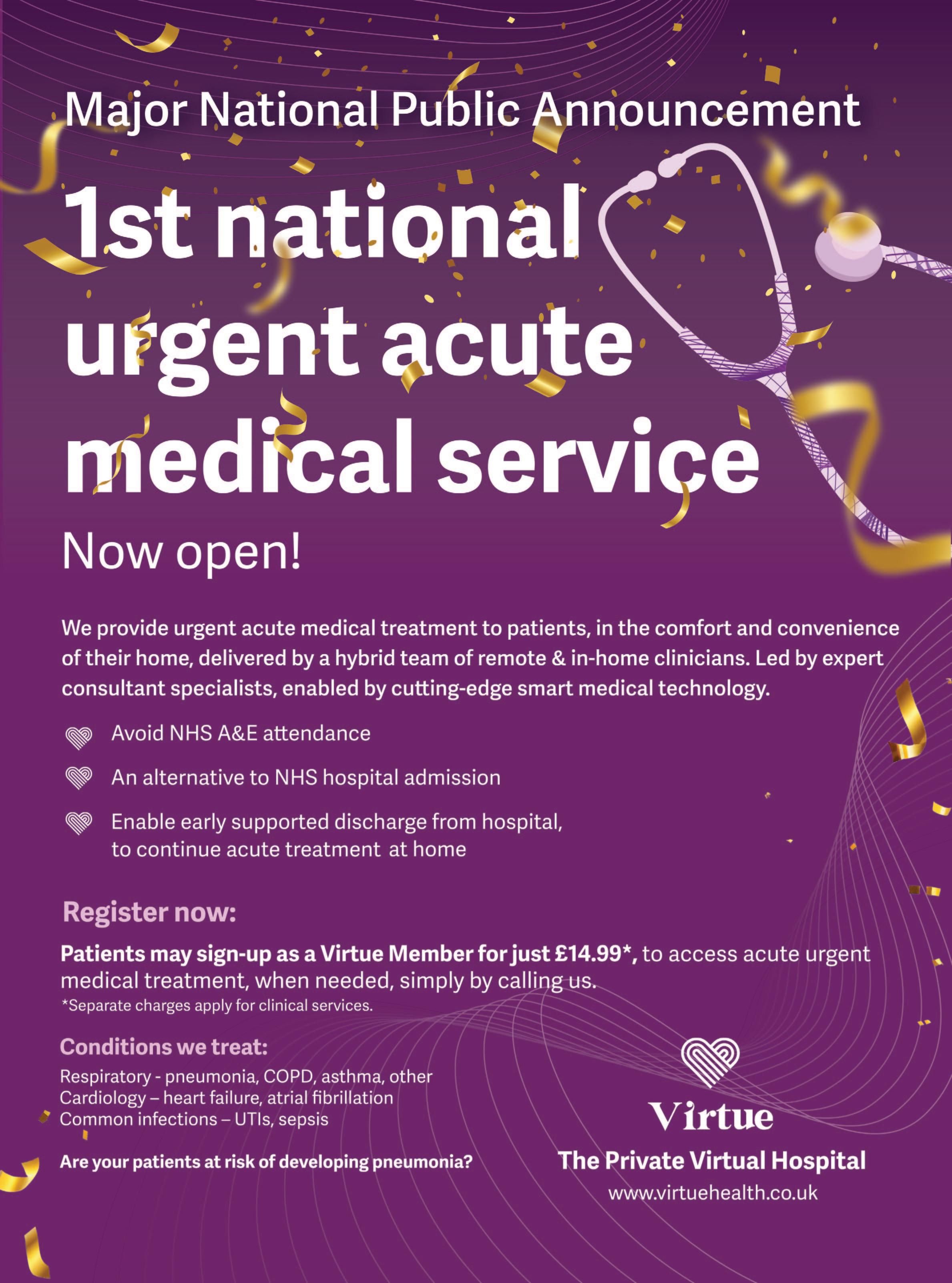
With the growing challenges of an ageing population and high employee turnover, care homes are increasingly turning to robotic technologies to assist in daily tasks.
While the role of robots in care settings often sparks debate, a new study has shed light on their potential to enhance both worker satisfaction and the quality of care provided to residents.
The research, conducted by experts on the future of work, highlights how robots are driving positive outcomes, including improved staff retention, greater productivity, and better care standards.
The study focused on data from Japanese nursing homes collected in 2020 and 2022. Japan, known as a “super-ageing society,” offers a glimpse of the future for other countries facing similar demographic shifts. With a shrinking working-age population and a rising number of elderly citizens, Japan has been a pioneer in integrating robots into care settings.

“We need to prepare for a new reality where the demand for senior care far outpaces the available workforce,” explained lead researcher Yong Suk Lee, an associate professor at the University of Notre Dame. In the UK, this shift is already underway. As the National Office for Statistics projects continued growth in the over-65 population, innovative solutions such as robotics may become increasingly essential.
Types of Robots Making a Difference
THE STUDY IDENTIFIED THREE TYPES OF ROBOTS COMMONLY USED IN NURSING HOMES:
• Transfer Robots – Assisting care workers in lifting, moving, and repositioning residents, easing physical strain on staff.
• Mobility Robots – Helping residents maintain independence by supporting movement and bathing.
• Monitoring and Communication Robots – Equipped with technologies like sensors and computer vision,
these robots track residents’ movements and health data, sharing critical insights with caregivers.
One of the most significant findings was the link between robot use and staff retention. Care workers, often plagued by physical strain and low wages, found relief from physically demanding tasks with the aid of robots. This reduction in strain was associated with a drop in quit rates, addressing a long-standing challenge in the care sector.
However, the study noted that while overall employment increased, the use of robots created a higher demand for part-time and less experienced staff, potentially reducing reliance on more experienced workers.
Residents also experienced notable benefits. Facilities adopting robotic technologies reported fewer cases of pressure ulcers and a decline in the use of restraints. These outcomes suggest that robots can improve patient mobility and overall comfort, key indicators of quality care.
Rather than replacing human workers, the study found that robots allow caregivers to focus on tasks requiring human empathy, dexterity, and connection.
“Robots can take on routine physical tasks, enabling care workers to provide more meaningful, personcentred care,” said Lee. “This shift not only boosts productivity but also enhances the overall experience for residents.”
As care homes across the UK grapple with workforce challenges and rising demand for services, this research offers valuable guidance. By integrating robots thoughtfully, care providers can support their staff, improve outcomes for residents, and navigate the complexities of an ageing population.
The findings provide a roadmap for embracing technology in the care sector, ensuring it benefits both workers and the individuals they serve.
A group of some of Manchester City’s longest-serving supporters have been rubbing shoulders with legends of the club, catching up about all things Blue, thanks to a dementia-friendly session designed to bring older fans together to share their love of their team.
The group of Cityzens travelled from their Didsbury home, Belong Morris Feinmann care village for an afternoon at the Etihad Stadium talking shop with their heroes, former players Brian Kidd (1976-79), Alex Williams (1980-86), and David White (1985-93). The guests took in the impressive view of the stadium from the event hosted from the Mancunian Suite overlooking Colin Bell Stand before enjoying a special meal with kosher option, live entertainment and dancing. Amongst those attending was the club’s former doctor (1976–2008) Norman Luft, who relished the opportunity to meet old colleagues and friends. He said: “It was a wonderful trip, and the best part was meeting with Brian, David and Alex – it brought all the memories of my career back, and they looked after us all so well, it was tremendous!”

The visit was arranged by Belong’s experience team as part of its vibrant programme of activities for its customers, designed in line with their hobbies and interest with the goal of promoting wellbeing. The group joined others at the club’s ReminisCITY initiative, offering a dementia-safe environment for fans to enjoy a club experience and the chance to meet fellow MCFC supporters.
Last year, the Palatine Road care village welcomed the club’s silverware from its continental treble-winning 2022-23 season, with its customers and families treated to a private viewing of the UEFA Champions League, Premier League and FA Cup trophies.
Angela Luckett, cultural experience coordinator at Belong Morris Feinmann, commented: “After previously welcoming the trophies, we thought we’d go one better this year and indulge our customers’ passion with a visit to the Etihad Stadium.
The team means so much to them, so their dream really has come true. Of course, we’ll be looking to go Red for our next day trip to make sure everyone is included. Like Manchester, our village is very much a city, united!”
On the 13th of January, Longview care home in Canvey Island, part of the Runwood Homes group, was thrilled to celebrate a momentous occasion as our beloved resident, Sally, turned 100 years old yesterday. The centenarian enjoyed a truly unforgettable day surrounded by family, friends, and the vibrant community of Longview.
The celebrations kicked off with a special visit from the Deputy Mayor, who presented Sally with a beautiful bunch of flowers and a heartfelt birthday card from His Majesty the King, a gesture that brought even more joy to the occasion.
The atmosphere was lively and full of laughter, with fantastic live entertainment from Tracey Lea, who had everyone singing and dancing along. Residents, staff, and guests savoured glasses of fizz, and a delightful buffet spread, topped off
with delicious cake to mark this remarkable milestone.
Sally expressed her immense gratitude and joy after the festivities: “I feel so loved by everyone; I can’t believe how many flowers and balloons I have. I want to thank everyone, especially the staff, for making my birthday so special. I want all the photos for my room so I can remember this great day.”
One of Sally’s closest friends at Longview, Yvonne, shared her thoughts: “I loved seeing Sally so happy today. She really deserved such a special day. Congratulations on turning 100!”
Sally's milestone was truly a celebration of a life filled with love, laughter, and cherished memories. Longview staff and residents are incredibly grateful to have been part of such a special moment in Sally’s life.
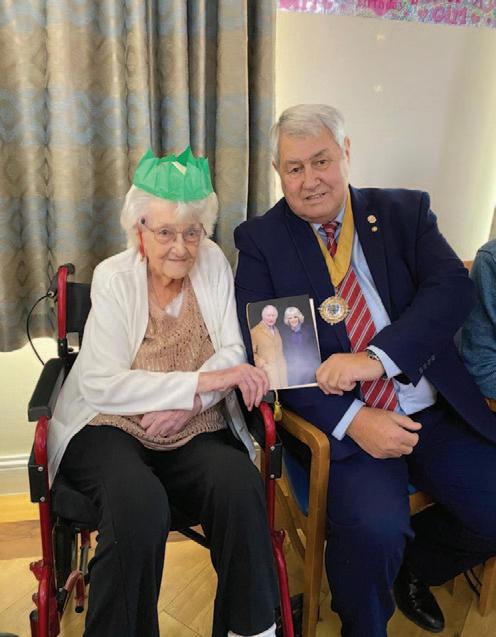
Tallis House Care Home, part of the Runwood Homes Group, marked a remarkable milestone by celebrating resident Ruby’s 103rd birthday with a special guest – the Mayor of Waltham Abbey, Shane Lucas. The event brought together staff, friends, and community members to honour Ruby’s extraordinary life and achievements. The birthday party, organised by Lifestyle Coordinators Rachel Brownlie and Clare Sambrook, was a joyous occasion filled with laughter, love, and heartfelt tributes. Although Ruby’s actual birthday fell on 20th December, the celebration was scheduled to coincide with the Mayor’s availability, making it an unforgettable moment for
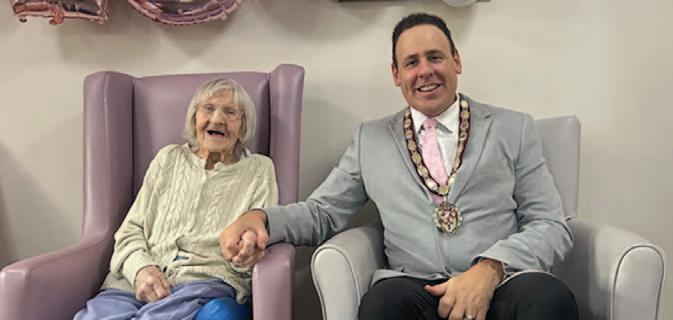
everyone involved. The event featured decorations, music and beautifully crafted birthday cake, creating a warm and wholesome atmosphere.
Lifestyle Coordinators Rachel Brownlie and Clare Sambrook, expressed their joy in being part of the occasion “It was an honour to organise such a special celebration for Ruby. Seeing her surrounded by love and admiration on her 103rd birthday was truly heartwarming,” they shared. Georgina Braithwaite, Manager at Tallis House, added, “Celebrating Ruby’s incredible milestone reflects the deep sense of community and care we strive to cultivate at Tallis House.”
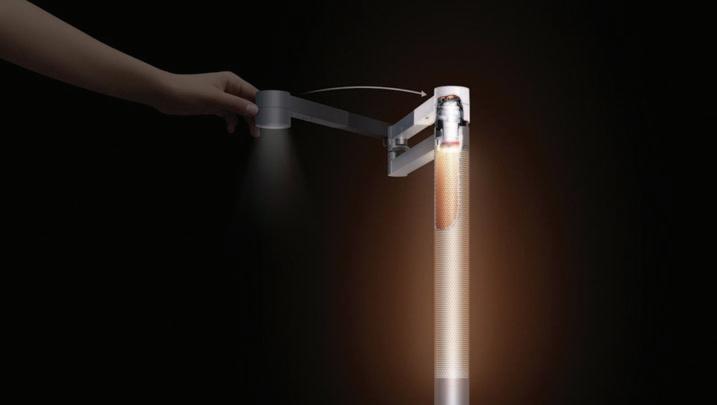
Lighting plays a vital role in every aspect of our daily lives. As nursing and care homes continue to navigate rising energy costs, lighting has emerged as a critical area for improving energy efficiency with the potential to reduce lighting costs by as much as 85 to 90%1 by using efficient solutions. The type of light bulb used can impact the time and cost spent on maintenance which is particularly important in care settings where costs saving measures are prevalent2
By adopting smarter lighting solutions, nursing and care homes can reduce energy consumption while enhancing the overall environment for occupants. In this article, Dyson shares how the sector can adopt smarter lighting solutions that not only help to cut costs but also support inhabitants’ wellbeing.
Many nursing and care homes across the country are now equipped with motion activated lighting, reducing costs, improving energy efficiency and avoiding unnecessary usage. By investing in lighting that is also controllable by an app, care managers have the flexibility to turn off lights remotely at the touch of a button adding an additional level of peace of mind.

Changing light bulbs regularly takes time, investment and organisation. Fluorescent lighting can be inefficient, waste light and use costly-to-replace bulbs. Without proper cooling, LED bulbs can quickly overheat, causing fading, discolouring and them to work efficiently. Lights such as the Dyson Solarcycle task light that use Heat Pipe technology can effectively cool the LED and protect the light quality for 60 years3. In turn, this allows the user to reliably adjust its colour and brightness without flickering bulbs and outages.
Recognising the importance of fostering a happy, healthy, and supportive care environment, care home settings are placing increased emphasis on these aspects. While lighting may seem inconspicuous, it profoundly impacts the wellness of residents and caregivers alike.
In many nursing and care homes, lighting can feel clinical with a ‘one size fits all’ approach to lighting which creates strain on the eyes. Acknowledging that individuals have diverse needs and perceptions regarding wellness and mental health, these spaces must remain adaptable to meet these varied requirements effectively. By creating bespoke lighting options in individual rooms, a user can adjust the lighting to suit their specific needs.
Low quality light can cause negative side effects such as migraines, headaches and eyestrain. By giving occupants the option to adapt something as simple as lighting to suit their needs will have positive effects on their wellbeing and comfort.

In addition, we spend about 90% of our time indoors4, exposing ourselves to artificial lighting more often than not, with many neglecting to think about how this can affect their sleep cycle. Light is a primary external factor influencing sleep patterns. While the notion that darkness aids sleep is commonly understood, the relationship between light and sleep is far more intricate.
Light plays a pivotal role in regulating the body's circadian rhythm, the internal clock dictating periods of wakefulness and rest. Moreover, it impacts the production of melatonin, a hormone crucial for promoting sleep. The daily exposure to light, including its quality, timing, and duration, significantly impacts sleep quality. Understanding the intricate connections between light and sleep empowers individuals to optimise their residing environment for consistent and restorative sleep.
In conclusion, strategic lighting design and innovation go beyond energy savings. By adopting human-centric lighting solutions, nursing and care homes can create environments that not only enhance their residents’ wellbeing and prioritise their health but also support the productivity and comfort of their caregivers. Lighting, when done right, can be a powerful tool in fostering a happier, and healthier nursing and care home.
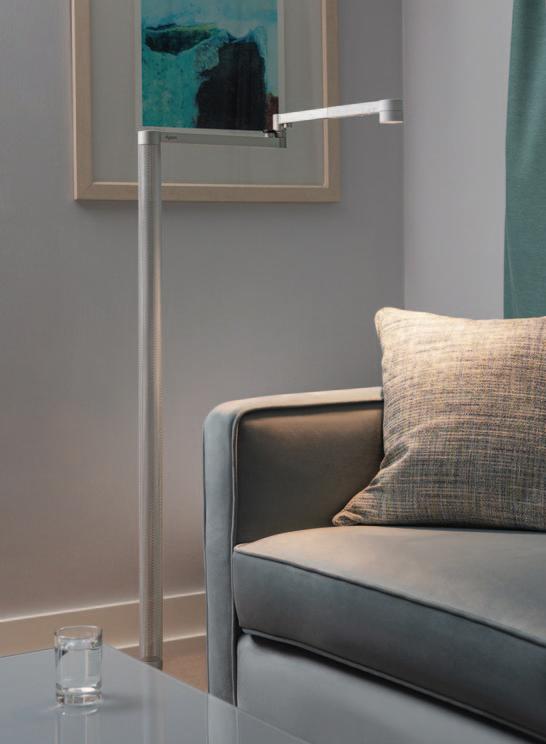
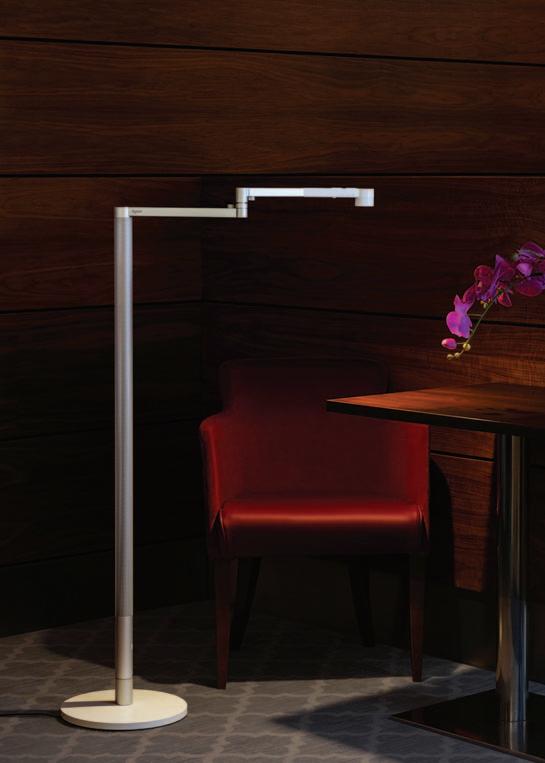
1 https://www.lbhf.gov.uk/business/business-connects/support-and-advice-businesses/costdoing-business/guide-energy-efficiency-and-cost-savings-your-workplace
2 https://www.gov.uk/government/news/more-funding-to-schools-hospitals-and-publicbuildings-to-lower-energy-use-and-save-on-bills-and-cut-carbon-emissions
3 LED-life
4 https://ec.europa.eu/commission/presscorner/detail/en/IP_03_1278
To learn more on how to create a nursing and care home that enhances residents’ and workers’ well-being with bespoke lighting solutions, visit Dyson technology’s business hub and book a call:

From dancing in New York City’s gritty Hell’s Kitchen to choreographing films with Elvis Presley and producing for Monty Python, Patricia Casey known to her friends and family as Pat, has lived an extraordinary life. Now a resident at Frome Nursing Home, where residents are fondly referred to as a family members, Pat’s life story is one of resilience, glamour, and trailblazing spirit.
Pat was born in 1936 in Hell’s Kitchen, an Irish immigrant neighbourhood then marked by its poverty and grit. Her parents were a unique pair: her mother, a Swiss immigrant, and her father, an IrishAmerican, made their way through life with pride and hard-work. Pat grew up alongside her sister, Katherine, in this bustling area, and both girls shared a passion that would shape their futures, dance. The sisters were inseparable in their dreams and ambitions, both determined to pursue performing arts in a city that thrived on talent.
At a young age, Pat and Katherine were accepted into the prestigious High School of Performing Arts in New York City, later made famous in the 1980’s film Fame. Pat was particularly talented and soon joined the Joffrey Ballet Company at just 15 years old, launching herself into the world of professional dance. Her role in the ballet company marked not only the start of her career but also a turning point for her family, as she became their primary support, displaying a sense of responsibility and independence far beyond her years.
WESTWARD BOUND AND LAS VEGAS NIGHTS
In her twenties, Pat’s journey took a new turn, and she ventured west to the up-and-coming city of Las Vegas. The bright lights, the glamour, and the promise of opportunity drew countless people, and Pat was no exception. She quickly found her place in the city’s entertainment industry, performing in various dance shows that captivated audiences drawn to the glitz of the Vegas Strip. In this fast-paced world, she met her first husband, a charismatic man older than herself who was involved in the race track scene.
But Las Vegas’s allure eventually faded. When Pat discovered she was pregnant, she knew she needed a change. Vegas was thrilling but isolating, and with a baby on the way, she decided to move on, leaving behind the city’s dazzle for a quieter, more secure life.
A NEW LIFE IN FILM AND PRODUCTION
Pat became a single mother in the early 1960s; a bold move in an era when single motherhood often came with stigma and challenges. Undeterred, Pat took on opportunities wherever she could find them,
eventually being asked to choreograph a film with none other than Elvis Presley. Her skill and professionalism impressed the industry, and soon she found herself not just choreographing but working in production as well.

In 1966, Pat and her young daughter Alicia crossed the Atlantic to London. It was a dynamic time in the UK film industry, and Pat thrived in the creative energy of the era. London was becoming a hub for film production, and Pat’s talent and work ethic landed her projects that would go down in film history. Among her proudest achievements was working on the first Monty Python film, ‘And Now For Something Completely Different’. The film was reported ‘scrappy’ but wellreceived in the U.S., especially by superfan Elvis Presley, who is said to have screened the film over 45 times at his private cinema in Graceland. Pat’s unique combination of drive and creativity made her a respected figure in the industry and laid the groundwork for women in film production.
By the early 1980s, the film industry had quietened, and opportunities in the UK slowed. Pat returned to the United States, hoping to rekindle her career. Despite her efforts, finding work proved challenging, and eventually, she moved back to the UK, where she would make an invaluable contribution to the next chapter of her family’s life.
Pat became a loving and present grandmother, helping Alicia care for her children while Alicia worked. Her days of dancing across stages and working on film sets were behind her, but Pat’s independence, courage, and deep love for her family remained ever present.
Today, Pat lives at Frome Nursing Home in Somerset, where the team and family members have welcomed her with open arms. Her life, once filled with the whirl of dance and the glamour of film, has transformed into a quieter but no less significant chapter. Those who care for Pat know her as a kind-hearted, resilient woman, whose life story inspires and whose presence brings comfort to those around her. Her daughter Alicia reflects on her mother’s legacy as one of bravery, love, and fierce independence. From the young girl dancing her way out of Hell’s Kitchen to the choreographer who once directed Elvis, Pat’s journey has been extraordinary. Her family cherishes her, not just for her accomplishments, but for the strength, love, and resilience she has shown every step of the way.
Adult care provider Exemplar Health Care has begun construction for its latest care home located on Ashby Road, Coalville. Due for completion by February 2026, the new home will be named Primrose Place and will provide comprehensive support to adults living with complex mental health needs, dementia, neuro-disabilities, and physical disabilities. Midlands-based Deeley Group have now started work on site to build the home, the sixth care home delivered in partnership by Deeley Group and Exemplar Health Care. Featuring 36 spacious en-suite bedrooms split across three

the home will follow Exemplar Health Care’s unique small group living model, which provides a more homely, supportive, and responsive care environment. The home will feature communal dining and living spaces, sensory bathrooms, a salon, and a dedicated therapy room. It will have its own multi-disciplinary team including an in-house Physiotherapist, an Occupational Therapist, Registered Nurses and Health Care Assistants, offering a holistic approach to care and support.
Residents and staff from Moors Manor Care Home in St Leonards were in for a treat as staff put on the
production I have seen in years, the actors really made me laugh!”
General Manager, Gemma Chalkley said: “Our residents and staff had a wonderful time it was truly brilliant! We do our best to provide a wide range of activities and entertainment at Moors Manor as part of the lifestyle enrichment programme
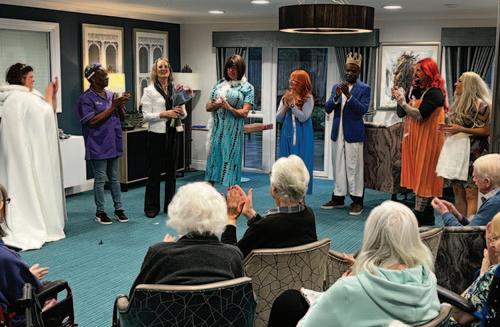
for residents, and this was one of our favourites!”
Moors Manor care home is run by Barchester Healthcare, one of the UK’s largest care providers, which is committed to delivering personalised care across its care homes and hospitals. Moors Manor provides residential and dementia care for 66 residents from respite care to long term stays. Moors Manor has built up an excellent reputation within its local community for regularly holding events and activities for its residents and surrounding neighbours. The next community event will be our Cheese and Wine evening on Tuesday 4th February.
The Social Care Institute for Excellence (SCIE) has launched a new best practice resource for the adult social care workforce: ‘Tackling inequalities in care for people with learning disabilities and autistic people’.
People with learning disabilities and autistic people continue to experience unacceptably poor health outcomes in comparison to the rest of the population, leading to lower life expectancy and a higher number of avoidable deaths.
During the pandemic, a report from Public Health England found that people with learning disabilities were four times more likely to die from COVID-19—with researchers estimating the real rate may have been as high as six times once accounting for unreported deaths.
Following the Public Health England report, SCIE was funded by the National Lottery Community Fund and other charitable foundations to produce guidance building on the experiences of people with learning disabilities and autistic people.
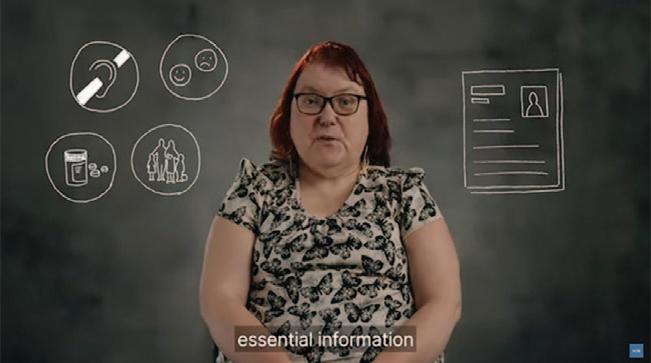
SCIE’s new guidance aims to close the gap in skills and knowledge across the adult health and social care workforce. It gives commissioners and practitioners the practical steps, confidence, and legislative awareness needed to improve experiences of care and support.
A video has also been created in collaboration with the SCIE Fliers to sit alongside the guidance as an audiovisual guide. The SCIE Fliers co-scripted and co-storyboarded the video and feature in it.
Kathryn Smith OBE, Chief Executive of SCIE, said: “SCIE’s vision is for a society that enables people who draw on social care to live fulfilling lives; where good, high-quality care maximises people’s choices and removes social inequality. It must be accessible to everyone who needs it—and empower them to live the lives they want to live.
“This guidance highlights the important steps we must take to achieve this vision and transform the lives of people with learning disabilities and autistic people.
“We must address systemic barriers and ensure that co-production is central to the design and delivery of care and support services. Only then will we have a system that is fair, equitable, and fit for the future.”
John Hersov, SCIE Fliers facilitator and consultant with over 40 years of experience in learning disability advocacy, said: “This guidance reminds us of what still needs to be done to ensure that health and social care services are truly responsive to the needs and requirements of this group of people.”
“It reinforces the need to cut through organisational charts and jargon-filled terminology to impact meaningfully on the individuals that we are there to serve.
“The video personalises these aims. Hearing from experienced self-advocates who know what they are talking about; emphasising again that you need to try to understand better the person you are supporting.”
“We hope you watch, use it, and tell your friends.”
A staff member at a Letchworth home says you have to “leave your problem at the door” and give your full attention and commitment to residents.
Kevin Pearson works at MHA Trembaths and marked his 20-year service by receiving his long service recognition award from Chief Executive, Sam Monaghan.
Kevin, who works as a maintenance man started his journey at the home as a volunteer before moving into a care assistant role, senior carer and then his current position.
MHA Trembaths provides nursing and specialist dementia care for up to 51 residents. Kevin says the reason for his longevity is the atmosphere at the home and the togetherness of staff.
He added: “First and foremost, you have to have the utmost respect for the residents, and remember you are visiting their home.
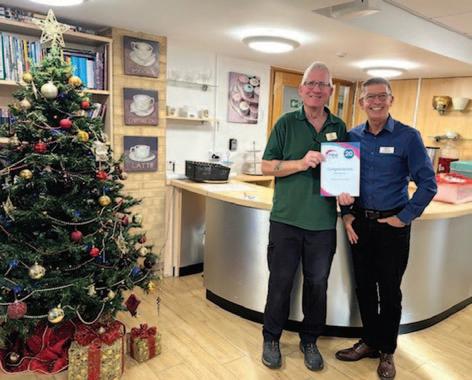
“You have to leave any problems you have at the door and put a smile on your face and be happy around the residents.
“I understand how important social care is as well as the maintenance work I do.
“You have to have a caring personality to work in care and it’s a very special area of work.
“I was aware I had been here for 20 years, but it was a nice surprise when I received my long service award.
“I really enjoy working at the home, it’s a great atmosphere, everyone is caring and supportive and we all work together to ensure the needs of the residents are met.
“It’s definitely somewhere I can see myself retiring from and it’s a fun place to work.”
Dean Windass, the former Hull City and Bradford City striker, has revealed he is living with stage 2 dementia. The diagnosis, which causes memory lapses and mild cognitive decline, highlights the growing number of retired footballers confronting neurodegenerative diseases, sparking renewed debate about the risks associated with heading the ball in professional football.
At 55, Windass is best known for his remarkable football career, particularly his winning goal for Hull City in the 2008 Championship play-off final against Bristol City. The victory secured Hull’s historic promotion to the Premier League. Throughout his career, Windass also played for clubs including Aberdeen, Oxford United, and both Sheffield United and Sheffield Wednesday, becoming a household name for his determination and goal-scoring prowess.
The news of Windass’s diagnosis was shared by former Manchester United defender David May during a BBC Breakfast interview. May, who had sought Windass’s permission to disclose the information, later confirmed the news on social media, praising Windass for his openness. Windass, known for his humour and resilience, posted a lighthearted video online after the announcement, singing Glen Campbell’s Rhinestone Cowboy. In his post, he said: “Seriously, I am OK, was delighted to find out I had a brain. Just hope other families get the help they want for the people they have lost.” Windass’s diagnosis adds to a growing list of former footballers diagnosed with dementia, reigniting concerns about the long-term impact of heading the ball. Studies have shown that repetitive head impacts may
significantly increase the risk of neurodegenerative diseases among professional players.
The issue has gained prominence in recent years, with high-profile cases including former England World Cup winner Nobby Stiles and other members of the 1966 squad. Many families of affected players have called for better recognition and support from football’s governing bodies.
The Football Families for Justice (FFJ) campaign, backed by figures such as David Beckham, is lobbying for improved care and support for former players and their families. FFJ aims to pressure football’s independent regulator to mandate decisive action from authorities, including better funding for research and care.
In a video address, Beckham called on the football community to unite: “We need the football family to come together and allocate resources to help address the tragedy of these devastating diseases. Let’s ensure that victims and their families are treated with kindness, respect, and best-in-class support.”
For residential and nursing care homes in the UK, these revelations underline the need to prepare for a potential increase in residents with football-related neurodegenerative conditions. Tailored support for residents with dementia, alongside greater public awareness, can ensure that former players and their families receive the care and dignity they deserve.
As Windass bravely navigates his diagnosis, his story serves as a powerful reminder of the challenges faced by retired athletes. It also reinforces the urgent need for football authorities, healthcare providers, and society at large to work together to address the lasting impact of the sport on players’ health.
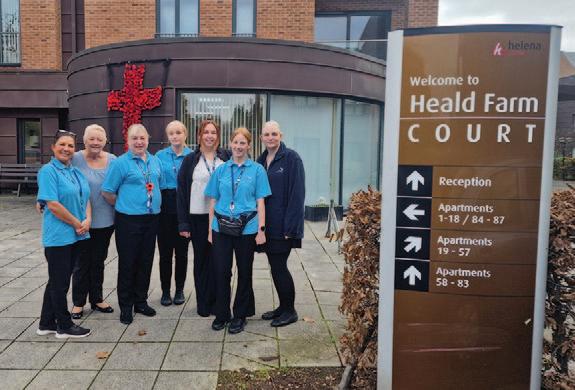
care provider Radis Community Care is expanding even further across England and Wales with a further two additions based in St Helens, adding to its extensive northern offerings.
The two extra care housing services offer people an alternative to conventional residential care, and provide independence and the flexibility of carers who are on site 24/7.
Teaming up with various housing providers, the services aim to help residents retain as much independence and control over their life as possible.
And, as part of its latest acquisition, Radis Community Care has won the contract of two
services; Reeve Court Retirement Village and Heald Farm Court. Supporting residents over the age of 55, Reeve Court Retirement Village is made up of 206 one and two
All of this, combined with a dedicated housekeeping team ensures that all residents have a comfortable living environment without having to worry about the stress of maintaining a home.
Similarly, Heald Farm Court also offers a variety of facilities, including a wellmaintained garden and regular social activities.
Heald Farm Court is a £14 million development, with many of its 86 twobedroom apartments having their own balcony, terrace or garden.
As well as this, the development benefits from having three transitional flats supporting people who have been in hospital or respite and are unable to return home.
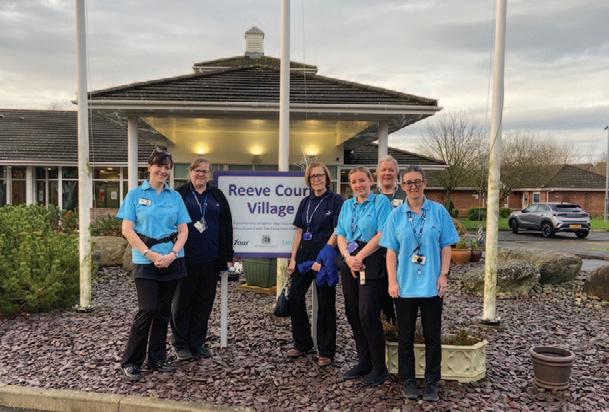
Surrounded by a health and wellbeing centre and beautifully landscaped gardens, Heald Farm Court is just a short walk from the local town centre.
Sarah Brown, regional manager at Radis Community Care said of the exciting contract wins: “We’re proud to be able to provide services to
vices to our care offering.”
“Both services bring staff
Since our founding in 2010, Activities to Share has been dedicated to enhancing the lives of those in care by providing thoughtfully designed activity products. Our mission is to support activity coordinators in delivering uplifting, engaging experiences that foster connection, joy, and well-being.
We achieve this by listening closely to your feedback and evolving with your needs. Whether over the phone, via email, WhatsApp, or Live Chat on our website, our team is always ready to offer advice and help you find just the right products to bring your ideas to life.
While we embrace the convenience of technology to expand our resources and share knowledge, we remain firm believers in the irreplaceable power of sensory


MOWOOT II – proven solution to chronic constipation without medication
Developed by a team of doctors and other healthcare professionals, MOWOOT II performs gentle abdominal massage to speed up intestinal passage in people experiencing chronic constipation.
Clinically proven, safe and effective, relaxing and sideeffects free, MOWOOT II

Abdominal Massage Therapy System combats constipation and provides soothing relief to affected people.
Easy to use and comfortable, the MOWOOT II treats and manages constipation in people with spinal cord injuries, multiple sclerosis sufferers, Parkinson’s Disease patients and people with constipation related to prescription medication. MOWOOT II also helps to relieve idiopathic constipation experienced by menopausal and post-menopausal women
and older and elderly people.
In clinical studies
MOWOOT II increased evacuation frequency, softened stools, improved regularity, reduced gasses, relieved bloating and eased off abdominal discomfort.
10 to 20 minutes daily of relaxing abdominal massage with MOWOOT II rapidly reduces symptoms of constipation. Evident results are experienced only a few days after the first treatment. Regular abdominal massage with MOOWOOT II ensures lasting health benefits and better quality of life.
MOWOOT II – effective solution to chronic constipation for better quality of life!
Supplied by Win Health Medical Ltd - 01835 864866 - www.win-health.com
See page 3 of this issue for other Win Health products.
Consort Claudgen’s innovation in the electric heating industry takes another leap forward by introducing Wi-Fi-enabled heaters to their low surface temperature (LST) range. These cutting-edge heaters offer unparalleled convenience and efficiency. The heaters connect directly to Wi-Fi, enabling users to control heating through the digital control panel on the heater or via the Consort Connect app. With a comprehensive 7-day timer, which allows 24 individual heating periods per day, and features such as a lock function, open window detection, and custom automation, users can tailor their heating needs to their preferences. Adding to the ease of use, users can view the

energy consumption statistics of all connected heaters, providing insights into usage patterns and potential savings. The LST heaters with Wi-Fi and occupancy sensors have a self-learning control ability. They utilise inbuilt occupancy sensors to detect and learn a user’s weekly presence in a room, creating an intuitive heating schedule. When the space is unoccupied, the heater conserves energy by switching to a setback temperature or frost protection mode.
BIM (Building Information Modelling) objects for the heaters are available for download from Consort’s website. 01646 692172 | sales@consortepl.com | www.consortepl.com
See the advert on page 9.
engagement. That’s why we continue to make our Reminiscence Kits and Sensory Bags with real, tactile items that stimulate the senses. Some experiences—like popping bubbles for the splash, breathing in a familiar scent, or piecing together a puzzle with others—simply can’t be replicated on a screen. These sensory moments are invaluable in encouraging storytelling, sparking memories, and fostering conversation.
Our values remain rooted in this commitment to meaningful connection. We’re here to partner with you—the professionals on the front lines of care—to create a sense of structure, well-being, and fun for those who need it most.
Are you longing for your activity diary to be full? Look no further www.activitiestoshare.co.uk are here for you! See the advert on page 5 or:
customers@activitiestoshare.co.uk
0117 966 6761
07900 6751 50
C&S Seating Ltd have provided postural control equipment to residential homes, hospices, medical equipment services and NHS trust hospitals nationwide since 1991. With 9 different sizes of TRolls and Log Rolls, in a removable and machine washable Waterproof Titex or Soft Knit material. These rolls are used to control posture and position of the body in either supine or side lying. Our Knee & Leg support wedges are available in 2 sizes.
abducted lower limb is required.
Our popular and vibrant range of Soft Knit covers in a choice of 5 colours, provide a softer alternative, ideal for the colder seasons and are designed to fit snug over our waterproof rolls for maximum protection and comfort.

C&S Seating Ltd is the sole manufacturer of the Alternative Positioning Support – also available in two sizes, which has removable side cushions and middle pommel for when more control of the
Contact us on 01424 853331 or visit www.cands-seating.co.uk
Since our incorporation in 1997, Alpha Furniture have always striven to provide the best levels of customer service. At the heart of what we do is listening to our clients’ requirements, and helping to propose the best furniture providing practicality and durability for their unique situation.
• Our chairs aren’t just your typical “care” chairs. Working with multiple manufacturers and designers, we have collated a varied range of styles that move away from the archetypal hospital chair while still maintaining the benefits and practicality of high backs, wings, and easy-clean upholstery.
• Everything we sell comes to you from UK manufacturers, supporting the economy and jobs.
• All of our products come with a minimum 5 year guarantee, so you can have the peace of mind knowing your furniture is built to last.
• Our storage furniture in particular, for bedrooms, lounges and dining rooms, is all delivered fully assembled, and finished with solid backs and drawer bases to prevent bowing or leaning, and so much better suited to a healthcare environment than many high street equivalents.
• We have options for all budgets, with a wide variety of care home suited vinyls and waterproof fabrics across numerous fabric bands.
• We have options for all timescales, with dining sets, lounge chairs and bedroom furniture sets available within 10 working days.
• Our vast range isn’t the end of what we’re able to offer, so if you are looking for something specific

our helpful sales team will help to track down the perfect product.
• Our friendly after-sales team will keep you updated with your delivery, and always look to deliver as soon as possible, often able to bring delivery forward even for made-to-order items.
• Full furniture installation and removal of packaging is an available service* allowing you to concentrate on the busy day-to-day of running a home on the day of delivery.
• As the majority of our furniture is made to order in the UK, almost everything can be adapted, whether you require a wider chair, a narrower dressing table, or simply combining materials on a chair to enhance the design – all for very little additional cost if at all.
For further information, see the advert on page 13 or visit www.carehomefurnituredirect.co.uk
*Additional charges may apply.
Planning and preparation by catering teams in the build-up to Christmas are crucial to ensure smooth operations and a successful festive period. Tess Warnes, Dietician at independent food procurement specialist allmanhall (allmanhall.co.uk), offers her tips on preparing for one of the busiest times of the year.
START EARLY: ORDERS AND DELIVERIES
From the start of November, the demand for festive products surges, leading to limited stock availability across the market. It is important to forecast and place orders as early as possible, enabling suppliers to allocate stock more effectively, thereby reducing the risk of short deliveries and out of stocks.
By placing orders early, catering teams can also take advantage of supplier promotions and manage budgets more efficiently, but still allow for small adjustments closer to the delivery date when more exact operational requirements are known.
While placing forward orders helps suppliers allocate products, it does not guarantee stock. The closer the delivery is to Christmas, the higher the likelihood of shortages. Where there is feasible storage, place orders for non-perishable and long-shelf-life items several months in advance to secure the stock. This also allows more time for contingency plans should there be any stock issues on any products. For fresh produce, work with suppliers or through your procurement partner to schedule advance orders with delivery dates.
Double-check order details, quantities, and delivery dates to avoid
last-minute surprises.
SUPPLIER ENGAGEMENT AND COMMUNICATION
During the busy festive season, maintaining communication within the supply chain is crucial. Regularly engage with suppliers to stay informed about market conditions, commodity challenges, and product availability.
Shortages can arise from limited availability further down the supply chain, such as failed deliveries. Suppliers will attempt to recover stock and, where feasible, source alternative supply chain routes, but it's essential to understand these challenges early so contingency plans can be made.
Currently there are challenges within the potato and cocoa markets, impacting products which are normally high on the requirements for festive menus, so securing stock as early as possible is vital. Once the availability of these products becomes limited, finding any routes to market will be challenging, with associated cost implications.
With surges in demand and limited supply, prices can be volatile during the festive period. Without any prior negotiation or supplier management, costs for products can quickly escalate often resulting in a budgetary overspend and overuse of resources reviewing the market for the most cost-effective options.
By regularly conducting market analysis and monitoring key commodities, catering teams can identify trends and anticipate challenges.
This enables early negotiation with suppliers, ensuring fixed, favourable pricing for the festive period.
The effective use of technology significantly enhances efficiency and accuracy. While these benefits are evident year-round, they become even more crucial during the busy festive period, further aiding operations.
Implementing a catering controls platform can be particularly beneficial, aiding in budget management through recipe building, costings, invoice management, and stock reporting.
Inventory management can be particularly challenging during the festive season, but by using a catering controls platform, catering teams can significantly simplify stock management and have more accurate reports, optimising stock levels.
Catering control platforms provide a comprehensive audit trail from orders to invoices, ensuring complete accuracy in ordering processes. This feature allows catering leads to verify all placed orders, minimising errors and ensuring smooth operations during the frenetic festive season.
“Proper planning and preparation from a procurement perspective are essential for catering establishments to navigate the season successfully”, comments Warnes. “ By starting early, managing supplier relationships, monitoring market conditions, managing inventory, and incorporating technology, catering teams can ensure a smooth, costeffective, and successful festive period.”
Albany Products are working closely with Flavour Creations to bring their market leading and award-winning dysphagia products to the UK market.
This has started with Screamies no-melt Ice-Scream, Shape It food moulds and Powder and initial trials of their extensive pre-thickened drinks range that are available in their award-winning dysphagia cup.
Screamies won the best texture modified food award at IDDSI in 2023. They are supplied ambient and can be frozen prior to eating. Screamies have a specialised no-melt formula, resulting in shelf-stable ice-cream products that never get softer than IDDSI Level 4, making it the perfect treat for those with dysphagia.
Screamies are available in Chocolate, Strawberry and Vanilla flavours along with two added Protein variants, Chocolate and Salted Caramel. Take up in the care sector is already pleasing and products are already available through Birchall’s Food Service.

Feedback through Exemplar and other care homes is that patients love them. It has been possible for Ice-Cream Fridays to include all patients for the first time. Even staff can’t resist.
Shape It moulds offer more units per mould than others and their quality and durability is also exceptional. The Shape It moulding powder is Agar Agar based and works at all IDDSI levels, making a differ-
ence to food presentation at level 5-6 particularly.
Care homes and NHS hospitals have already started using the Shape It range. Flavour Creations pre-thickened ready to drink products are making a real difference in trials within care homes and the NHS. With hand thickening resulting in inconsistency and risk to patients, along with being time consuming and training intensive FC’s RTD products offer a solution.
The drinks have assisted in the comprehensive evaluation of patients’ needs, with more patients being provided with thickened drinks at the correct level and improved hydration. The ranges offered include nutritionally complete variants, fruit juice, cordials, dairy options with a Lactose Free dairy the latest range addition. The award-winning cup that is used for all RTD’s makes it easy for patients to use independently.
Additional fortified snacking lines are also available and can make a real difference to patients where BMI is an issue.
To find out more simply contact Albany Products at enquiries@albanyproducts.co.uk or call on 01706
632233


It’s time for an upgrade! At Diversey Washcraft, we know how frustrating it is when laundry equipment fails, especially when you’re in the middle of a busy season. Is your dryer breaking down, costing too much to run, or leaving you with laundry backlogs? Don’t let that happen this winter! Upgrade now to our cutting-edge energy-efficient Danube & LG dryers and get your laundry operations back on track. Why Choose Diversey Washcraft?
3 Save on Energy Costs: Our dryers are designed with energy-efficient technology to help your business save money while maintaining top performance. Imagine reducing your utility bills while processing more laundry - it’s a win-win!

3 No More Breakdown Worries: Say goodbye to constant repairs! With our reliable equipment, you’ll experience fewer breakdowns and disruptions. This means more uptime, fewer headaches, and smoother daily operations for your team.
3 Maximize Space: Our stackable LG 10KG and 15KG dryers allow you to fit more drying capacity in a smaller space. Perfect for businesses with limited room but high demands, you can double your drying capacity without
needing extra square footage.
3 Perfect Fit for Care & Hospitality: We understand that laundry needs in the care and hospitality sectors are high-volume and constant.
That’s why our solutions are tailored to handle even the heaviest loads, ensuring your linen, towels, and uniforms are always fresh and ready, no matter the season. The Best in Commercial Laundry Solutions At Diversey Washcraft, we’re not just about selling machines; we’re about delivering solutions that truly make a difference in your business. Our range of highperformance commercial laundry equipment is trusted by care homes, hotels, and businesses across the UK.
We pride ourselves on offering the best products backed by exceptional customer service. When you choose Diversey Washcraft, you’re not just getting top-tier laundry machines - you’re getting the support of a knowledgeable, friendly team that’s dedicated to helping you find the right solutions for your needs. We’re with you every step of the way, from consultation to installation and beyond!
For further details contact Francis Ayscough on 07714 391900 or Faye Marland at fmarland@solenis.com.'
As the economic crisis continues across the UK, care homes can find themselves facing acute pressures. The unprecedented rises in energy costs will now combine with the increase in National Insurance contributions and a higher minimum wage. This will impact staffing budgets and leave many care providers grappling with how to balance rising operational costs whilst maintaining the quality of care that their residents deserve. In this challenging financial climate, efficient budgeting and resource management have never been more critical for the sector.
Forbes Professional understands the pressures facing care homes today. Providing laundry and ware-washing appliances to care homes across the UK, we strive to be a trusted partner in helping care homes to navigate the challenges of delivering essential services. Our flexible, all-inclusive contracts enable clients to access highly energy and water efficient equipment without the burden of costly upfront payments. Our simple monthly payment structure makes it easier to budget and forecast long-term, offering peace of mind in an era of rising unpredictability.
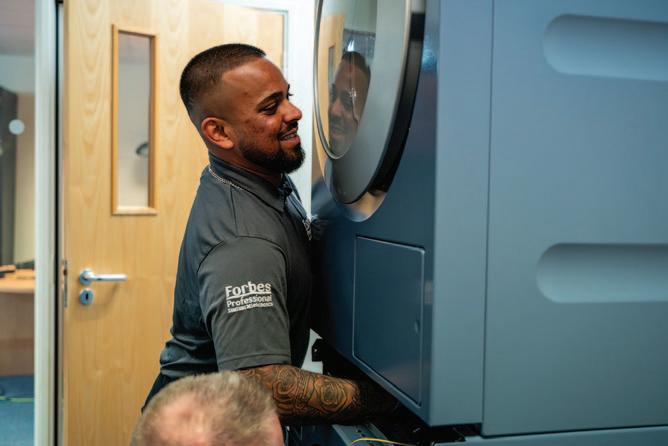
In addition to our competitive pricing model, our award-winning service support is included at no extra cost for the life of the contract. This means no unexpected repair bills or downtime, ensuring that laundry operations run smoothly so that care operators can focus on delivering the best care to residents. With installations included as part of our service, we provide a comprehensive, hassle-free solution that saves both time and money.
As care homes plan for the future, it is essential to scrutinise contracts and operational costs, especially for high-use areas such as laundry facilities. If your current laundry contract is due to end in 2025, now is the time to consider how Forbes can help you reduce costs whilst maximising efficiency. We offer complimentary site surveys to identify your unique needs and discuss tailored solutions that support your financial and operational goals.
By aligning with reliable service partners, care homes can also take a proactive step towards managing budgets and ensuring the seamless operation of an essential service.
forbespro.co.uk | info@forbes-professional.co.uk | 0345 070 2335


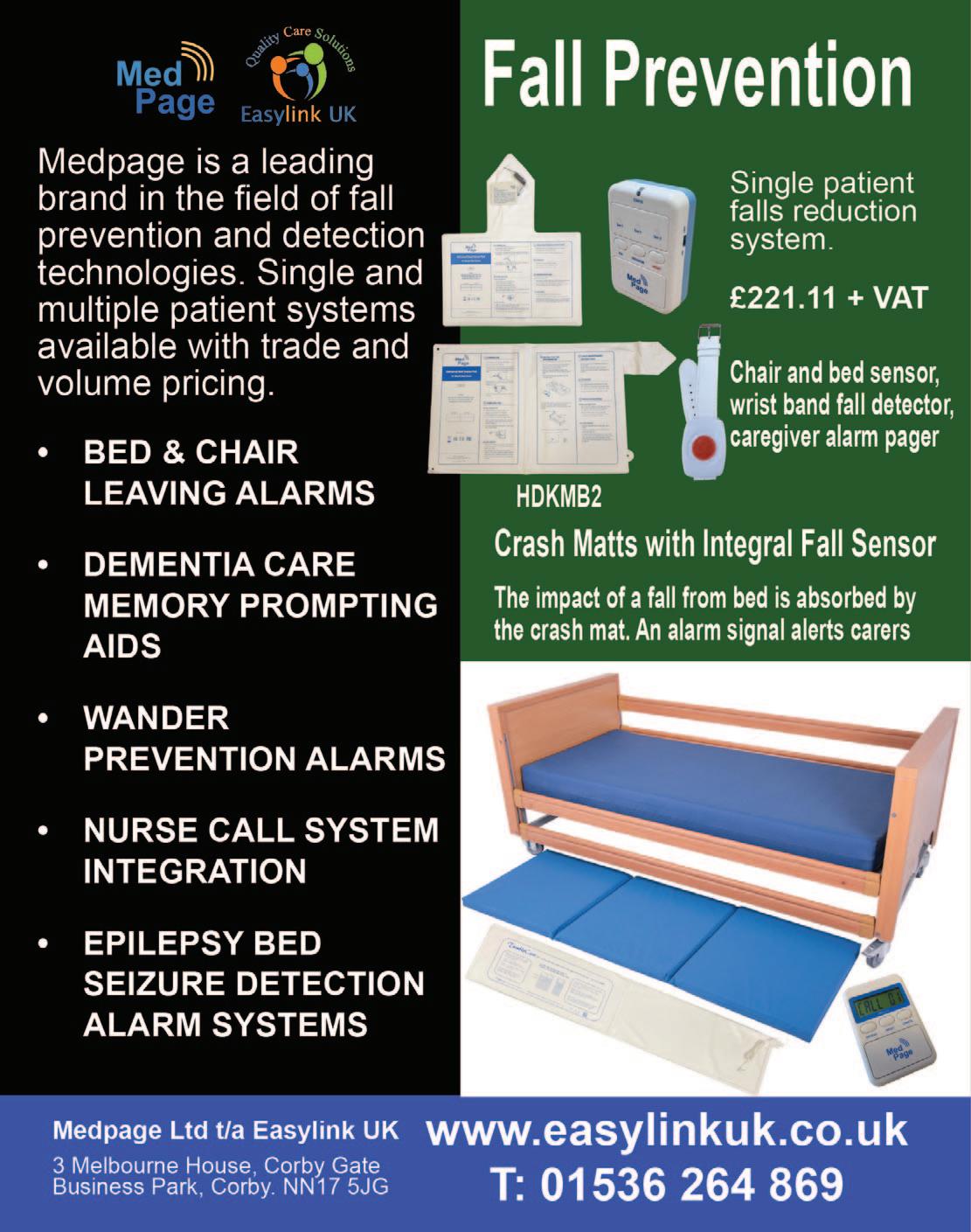
Fall Savers®, are an experienced market leading healthcare provider of resident safety solutions for over 15 years.
FALL SAVERS ® WIRELESS MONITOR

Eliminate all cables with our new generation falls management solutions!
Upgrade your falls programme with the latest technology from Fall Savers®. The NEW Fall Savers® Wireless eliminates the cord between the monitor and sensor pad. This results in less work for nursing staff, improved safety for patients and reduced wear and tear on sensor pads. Wireless advantages include the ability to use one monitor with two sensor pads simultaneously and support for many new wireless devices.
BENEFITS INCLUDE:
Safer for patients; less work for staff Bed and chair pads available One monitor works with two sensor pads Integrates with most nurse call systems A variety of options, including: Call button Pager

FEATURES INCLUDE:

In the post pandemic world, we have all seen the effects of supply chain problems with the invasion of Ukraine and other alarming global factors, ever increasing costs of living and other more local issues which have driven up the rate of inflation over the last few years. The impact of this meant that most manufacturers of electronic products had to increase their prices as costs spiralled. This, of course, has impacted the end user. The most dramatic impact has been on the Care Industry. An industry that has lacked the support it desperately needs in these trying times.
Courtney Thorne, at the same time, took a strategic decision to take a close look at our core products, right down to component level, the objective being to make us less vulnerable to future global supply chain issues, and to reduce the cost of each product with the amin of ensuring that we deliver the same high quality product at a cost protected price. We had to ensure that this would happen without jeopardising the superb lev-

els of support we provide to our valued customer base.
This ground up review involved all departments from Research and Development right through to the Field Service team (and everything in-between). This in-depth collaboration took time as we had to ensure that each and every element was refined, perfected and tested to our (and our customers) rigorous requirements.
Whilst many organisations have limited-time or end of product line offers, we are very pleased to announce a price reduction on our core Connect and Connect Health Nurse Call system ranges. With flexible terms, full integration with Care Apps, celebrated service delivery and the most reliable and robust solution now at a new lower price, there has never been a better time to talk to us about a new nurse call system.
For more information email us at: info@c-t.co.uk or see the advert on this page.
Blaucomm’s Nurse Call Messaging Service (NMS) is the market leading solution to remove the dependency on noisy nurse call panels and pagers, through its intelligent software, which delivers the alerts straight to the care staff who need them.
Care homes are rapidly introducing smartphones for digital care planning and eMarnow, the same devices can be used to receive the nurse call alerts they need for the residents under their care.
Furthermore, Blaucomm NMS is deeply linked into Person Centred Software MCM, so call bell data is linked straight to care plans. This unlocks a huge benefit to care homes to enhance the staff performance with how they accept and respond to residents, which ultimately promotes better response times and visibility for management to audit their performance.

The best part is that Blaucomm NMS links into your existing nurse call system - we work with all major
brands such as Aidcall, ARM, Courtney Thorne, C-TEC, ENS, Intercall, Medicare, SAS and TeleAlarm.
Care operators are constantly recognising Blaucomm NMS for its reliability and dependability to their care operations, which is why we’ve been chosen time and time again over other solutions.
Head of IT Trudi Harrow at WCS Care had this to say about Blaucomm NMS:
“We find Blaucomm is a genuinely fantastic company with a reliable product.
"We would highly recommend this to anybody who wants to replace expensive pagers and silence those annoyingly loud nurse call screens!”
To find out more about Blaucomm NMS, visit
www.blaucomm.co.uk/healthcare
See the advert page 5 for more details.
Medpage Limited has collaborated with a leading UK manufacturer of crash mats to deliver a cost-effective tool for falls management strategies. The inclusion of the new TumbleCare full-length pressure mat sensor ensures that should a patient tumble out of bed, an alarm signal is generated to alert care staff to the incident, resulting in a recordable improvement to patient safety and service.
Crash mats act as a protective barrier, absorbing the impact of a fall and reducing the risk of serious injuries when a person tumbles out of bed. Beneficial for individuals who are at high risk of falling, such as older adults, patients recovering from surgery, or those with neurological conditions such as epilepsy.
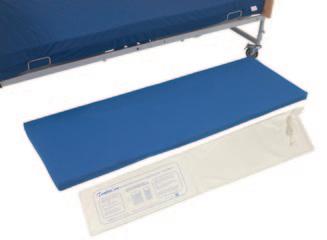
Falls can pose significant risks, especially in healthcare settings and senior care facilities. Every year, thousands of people suffer injuries due to falls from beds and other furniture. To prevent these accidents and ensure the safety of patients and residents, it is essential to implement effective falls and safety management strategies.
Further details can be obtained by telephoning 01536 264 869 or emailing sales@easylinkuk.co.uk
See the advert on the facing page for details.
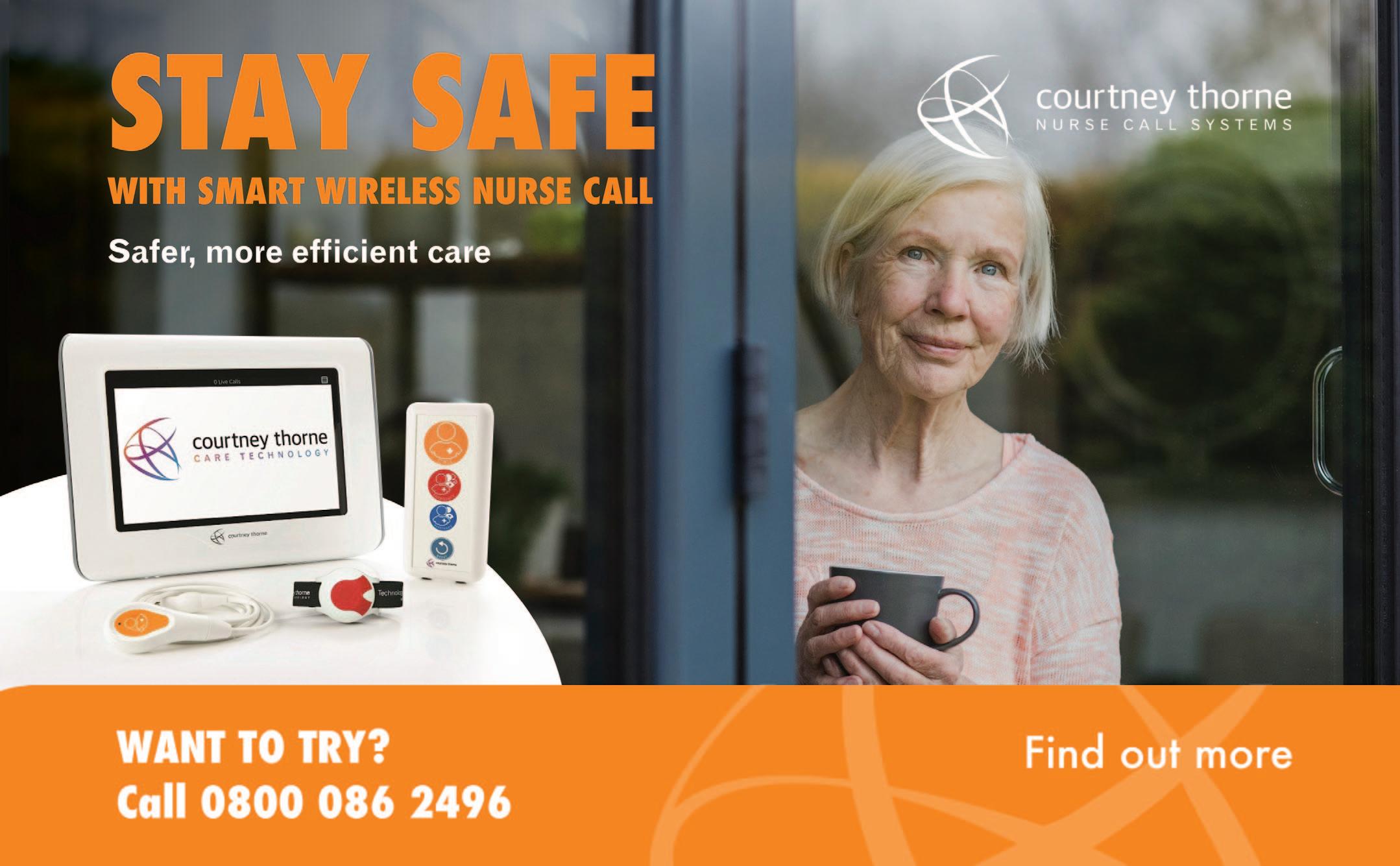
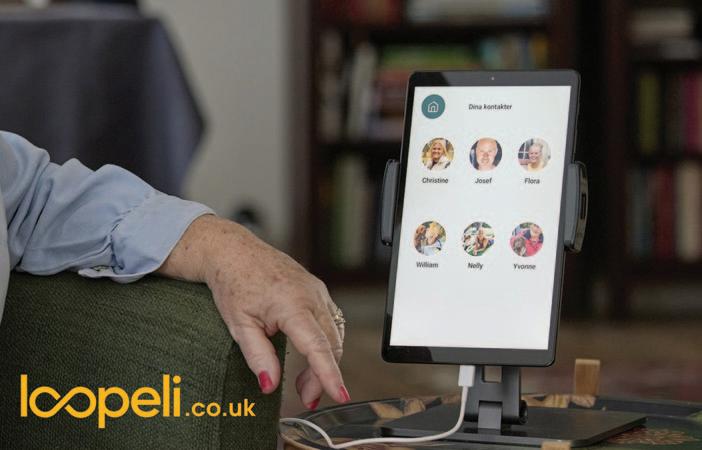
At Windlesham Manor, we’ve had the privilege of being the first care home in the UK to pilot Loopeli, an easy-to-use video call system designed to enhance communication for residents, families, and staff. Since introducing it, we’ve seen some unexpected changes, and I would like to share what we have learned so far.
MAKING LIFE EASIER FOR RESIDENTS AND STAFF
Loopeli is so simple to use that many of our residents can make video calls on their own, which has been a huge boost to their independence. For our care staff, this has freed up precious time on other tasks, which has been a real help.
BRINGING FAMILIES CLOSER
Families who use Loopeli have told us they appreciate it. Many feel more connected than ever, with some saying they have started to recog-
nise the person they used to know before they entered the world of care through the video calls. For residents, it has been heartwarming to see their loved ones more often—even those living abroad. Watching a resident light up while chatting with a grandchild across the world is truly priceless.
A GAME-CHANGER FOR DOCTORS’ VISITS
One of the most useful aspects of Loopeli has been during doctors’ visits and meetings with clinical professionals. Families can join via video call in real time, staying informed and involved without staff having to relay information afterward. This not only prevents misunderstandings but also helps families feel like they’re part of the process of ensuring their loved ones receives the best possible care.
INSTANT HELP FOR BEST INTEREST MEETINGS
We have also used Loopeli during best interest meetings and care discussions. When decisions need to be made, it’s easy to bring a family member into the conversation straight away. This has saved time and made these discussions more collaborative.
BREAKING DOWN LANGUAGE BARRIERS
Loopeli has helped with translation needs. If there is ever a language barrier, family members can join the call and assist, making communication smoother for everyone.
BOOSTING WELL-BEING AND REDUCING MEDICATION
One of the most surprising benefits has been how Loopeli has improved emotional well-being. For some residents, being able to connect with their family more often has reduced the need for calming PRN medication, especially during the late afternoons when anxiety levels tend to be higher.
FROM APPREHENSION TO
After over 30 years, care charity Imagine, Act and Succeed finally swapped their paper rotas and timesheets for a digitised system to help manage their 85 locations and 460+ staff.
Emma Hobbs, Payroll Officer at the charity, grew frustrated over the inaccuracies and errors of this cumbersome process – especially when it led to wages. The system was often outdated and staff frequently missed shift changes. This led to lost time, money, and patience for both managers and employees. So, how can turning to digital systems like RotaCloud improve this?
“The information is accessible to us in payroll straight away, which is an absolute godsend. Being able to see instantly where someone is working, what shift they’ve actually done, the clock-in and clock-out records are just – it’s made our payroll side so much more streamlined to what it was beforehand.”
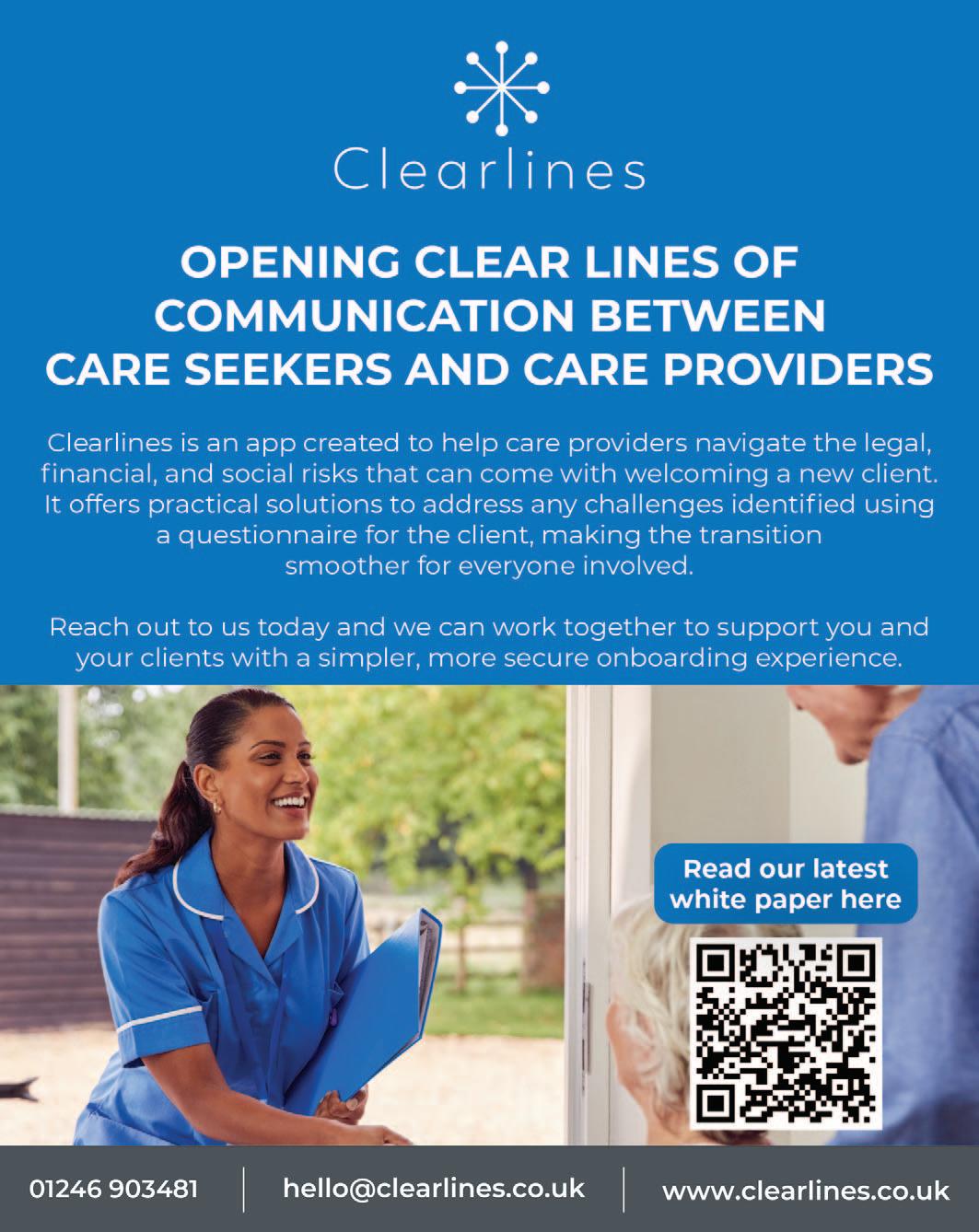
When we first introduced Loopeli, a few staff were hesitant, thinking it might just be another tech gimmick. But it didn’t take long for them to see how much easier it made their day-to-day work. They now see it as a tool, and we have since purchased extra tablets so more residents can benefit.
SUPPORTING OUR CQC REPORTING
Loopeli has also given me confidence as a manager when completing CQC’s annual provider information return (PIR) especially question 2.7, 2.7a and 2.13 in the PIR, which involves Communication preferences and Access to Information Standard (AIS)
THE BIGGER PICTURE
At the heart of it all, Loopeli has opened new ways for our residents to stay connected to the people they love. Whether it is helping with doctor’s visits, supporting important care decisions, or simply letting a resident see their grandchild on the other side of the world, it’s a service that has made a big difference in our residents’ lives.
We’re proud to have been the first to try Loopeli, and we can confidently say it’s been a success. I would encourage any care home to consider it—it’s simple, effective, and makes a positive impact. I see many other ways Loopeli can help meet the growing demand for care, especially in home care services.
Peter Granstrom RGM Windlesham Manor.
Accuracy is the biggest benefit for Emma and her team. There’s no more chasing people for paperwork or last-minute runs for payroll. Managers can instantly access live reports, from labour costs to attendance, with clocking-in data automatically feeding to timesheets. When clocking in and out is as simple as a click or tap via mobile, web, or a terminal, employees (and Emma) can trust that all wages are correct.


Communication has also improved. By having everything at their fingertips, from shifts to requests, everyone works from the same page. It has made staff’s lives much easier and saved managers time. Enabling notifications also means any updates to the rota, annual leave requests, or available shifts are immediately sent to the appropriate staff. No more sending out WhatsApp updates, missed messages, or stress trying to find cover.
Before RotaCloud, Imagine, Act and Succeed managers sat down for two days to create rotas – before any changes were made! It now takes less than two hours to complete, and any changes are as simple as a dragand-drop on the rota, which instantly notifies staff.
They have saved time and costs this way and can even track labour costs while scheduling shifts. This saved time and money can now be better spent on service users and staff training!
All of this contributes to improving the work-life balance of all staff. Simply offering staff the ability to view rotas far in advance allows them to plan their lives accordingly. They can even input their availability into the app, from specific hours to days, meaning they feel in control of what they work and when. With the option to pick up additional shifts, too, employees have that flexibility to plan work around their lives – not the other way around.
Staff are happier when they feel in control, whether it’s transparency or trusting their wages will be correct. Managers are happier when they have more time and money to spend on more important tasks. Happy staff, happy service users.
When one digital system creates all of this… Well, you understand why so many care services are reaching for the recycling bins.
See the advert on the front cover for details or visit www.rotacloud.com/care-homes
Providing exceptional care isn't just about meeting today’s needs; it’s about offering peace of mind to

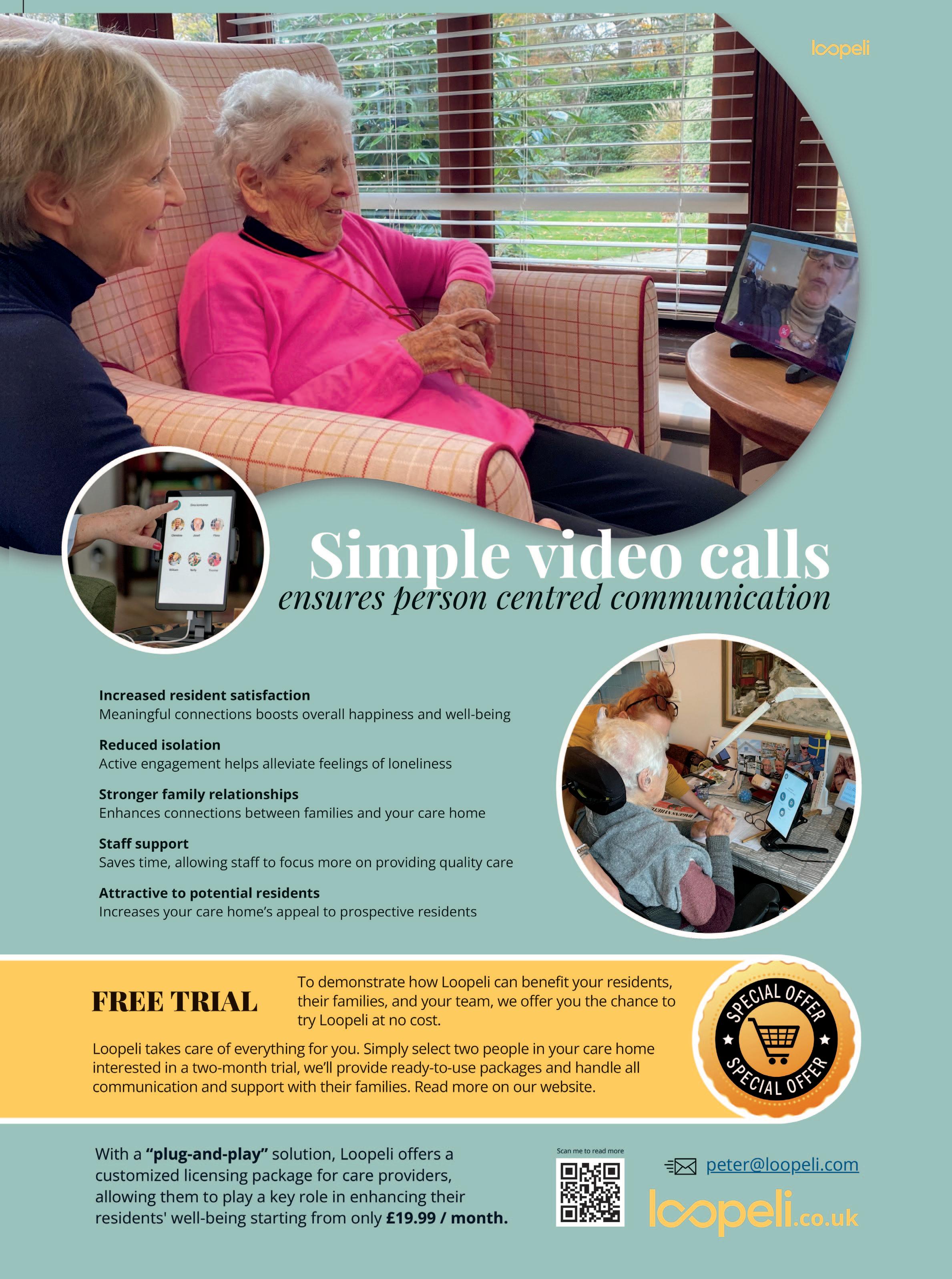
PASS supports over 1,000 care providers every day, giving them access to market leading care management tools hand in hand with unlimited 24/7/365 support from our dedicated and friendly PASS team.

Assured by NHS Transformation Directorate, PASS provides a secure platform that allows you to plan, record and evidence the care you deliver. The only assured solution built specifically for the home care sector, it provides comprehensive real-time functionality and allows you to share progress against outcomes with customisable, exportable reports.
CARE PLANNING AND ROSTERING FROM A SINGLE PLATFORM
To meet the wider needs of the PASS community All-in-one PASS
has recently been launched , bringing advanced rostering functionality to our established digital care planning platform. As a result advanced staff scheduling, payroll and invoicing functionality is now seamlessly linked with care planning and reporting, reducing the technical complexity, risk and overhead associated with integrating two separate systems.
As a result, PASS now provides an all-in-one suite of digital care management tools, available from a single platform, designed to:
Save you time
• Increase the efficiency of your teams
Improve the quality of care
• Deliver better outcomes

Our commitment to the continual evolution of PASS is further illustrated by the addition of GP Connect. The first product of its type to offer this feature, PASS is still one of only a handful of digital care management solutions to have completed this NHS Digital integration, and
is the only one offering it to the home care market.
PASS GP Connect provides authorised social care staff with realtime access to their client’s GP records. It makes medical information available when and where it is needed, leading to improvements in both care safety and outcomes:
• Visibility of allergies, vaccinations and medications, especially useful for clients unable to reliably share their personal information
Using medical information to inform care planning
Ensuring that the right medication is delivered to the right person in the timeliest manner. In one case, this allowed the administration of antibiotics on a Friday evening, aiding the service user’s swift recovery from infection
Available to all PASS users at no additional cost, PASS GP Connect is significantly more efficient than waiting for a GP response. It’s also a positive step forward on the path to the DHSC’s goal for widespread digitally enabled care and is in full alignment with their ambition for joined up care for everyone.
Get in touch: www.everylifetechnologies.com
hello@everylifetechnologies.com
Our domiciliary care sector is facing serious challenges with workforce shortages, rising costs, and an ever increasing demand for home-based care. Technology must be part of the answer, however the low adoption of smartphones and tablets by older adults has only highlighted the need for a different approach.
We believe the solution lies in the most common, and most familiar technology: the TV.
SIMPLIFYING COMMUNICATION
Many elderly individuals find smart-screen gadgets intimidating, but TVs are familiar. By delivering video calls through the TV, care providers can offer simple, accessible communication. Routine check-ins can be conducted virtually, reducing the need for some physical visits while maintaining personal connection. Family members can be more involved, offering reassurance and better support.
PROACTIVE MONITORING WITH SENSORS AND CONNECTED DEVICES
Internet of Things (IoT) devices, such as motion sensors, health monitors, and smart medication dispensers, provide real-time data on an individual’s health and environment. For instance, sensors can monitor wellbeing (e.g. sleeping patterns), or poorly regulated heating in the home. These insights allow carers to respond proactively.
BOOSTING EFFICIENCY AND PROMOTING INDEPENDENCE
Video calling reduces the need for unnecessary travel, enabling carers to focus on urgent or high-priority cases. IoT alerts further optimise resource allocation, helping providers manage workloads effectively. At the same time, this technology empowers clients to live safely and independently at home, aligning with the UK’s focus on “aging in place” and person-centred care.
HOMESIGHT IS THE WAY FORWARD
Our HomeSight system is the first to use the TV for health and wellbeing support . It’s an incredibly simple system, easily connecting to any TV with an HDMI port (which almost all TVs have), blending
seamlessly into the home. With an ergonomically designed remote control and a user-friendly TV interface, it’s intuitive enough to require almost no training. With two presses clients can connect with carers or family members effortlessly.
It ensures accessibility for all ages and technical abilities while maintaining the familiarity of using a TV.

Beyond video calls, the system keeps everyone in the loop. Family members can use dedicated phone apps to stay connected, while carers access a secure web portal for real-time updates and communication. This integration ensures that clients receive the care and connection they need without disruption to their daily routines. It’s a practical, stress-free way to enhance support and communication in domiciliary care.
For further information, see the advert on the facing page or visit www.atsolutions.uk




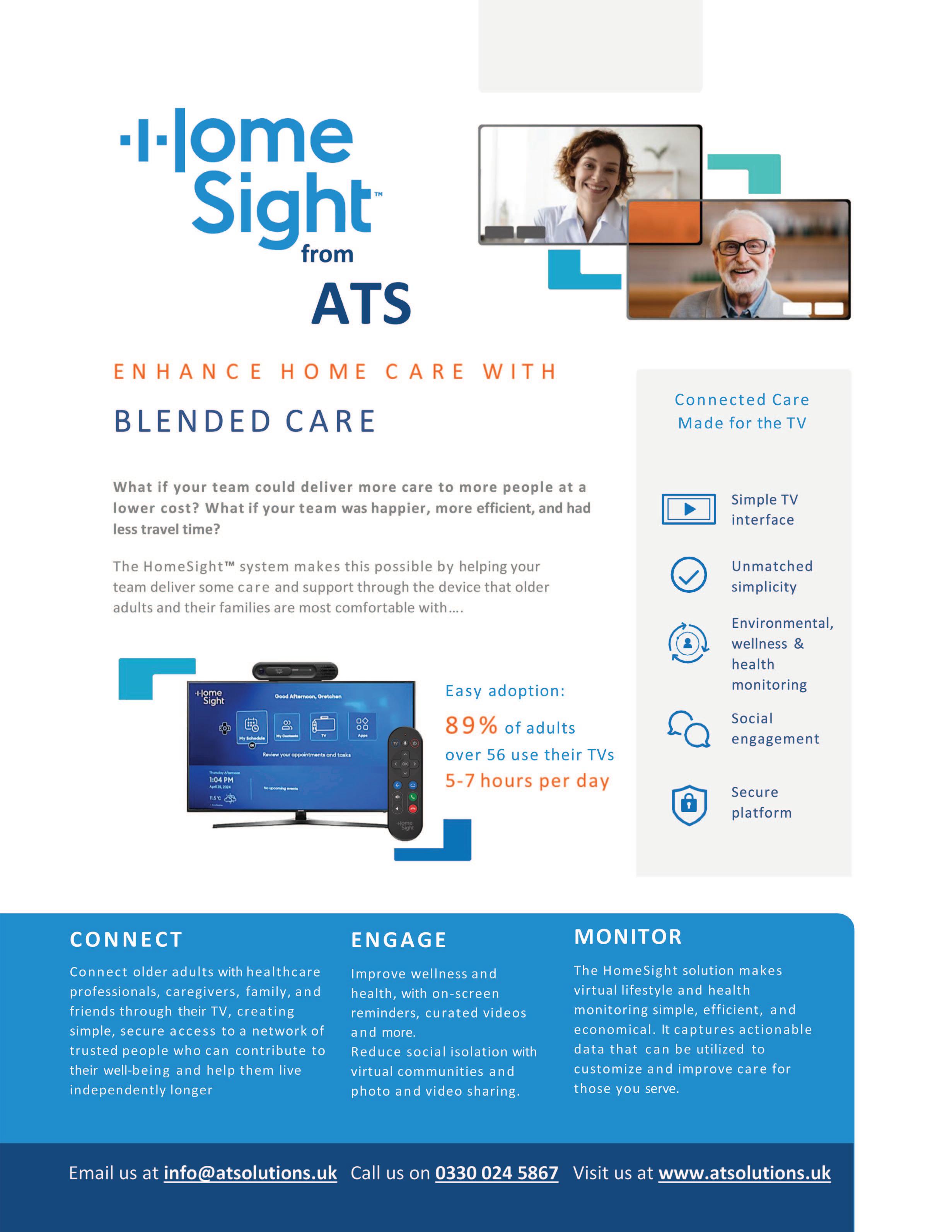

At AFG, our aim is simple – to help those we support live more independent lives. Technology is becoming more integral to helping people with a learning disability or with autism to be more independent. But while the technology exists today, the challenge for tomorrow is scaling its adoption across health and social care.
THE STATE OF THE MARKET: TECHNOLOGY IN SOCIAL CARE
The potential for technology to enhance lives in the care sector is evident. But many people who could benefit lack access to the tools that would make a difference to them.
According to a report by Ofcom, people with learning disabilities are less likely to own computers and smartphones or use of the internet than non-disabled people[1].
At AFG we established our Technology Lending Library two years ago. This simple idea has had a positive impact on many of the people we support. For example, borrowing a tablet device enables someone who is non-verbal to communicate with their family and friends. Another person was supported to watch videos that gave them the confidence to attend the dentist for the first time in years.
SCALING UP: MOVING BEYOND
All this is worthwhile. But for real change in social care to happen, we need to be able to scale up technology within our sector and integrate it into the way we live, work and play.
At AFG, we have partnered with assisted living technology experts, My Ecosystem to take a holistic approach that combines health, care and housing.
Led and funded by Lancashire County Council, several bungalows at our 24-hour supported living housing in Parklands Court in Lancashire have been retrofitted with bespoke, industry-first technologies, including sensors, communication devices and health monitoring tools. This set up not only supports residents, but also aids those supporting them too in delivering the right care, at the right time through real-time monitoring and adjustments.
By Andrew Kendall, Chief Commercial Officer at Alternative Futures Group
However, this is one of few examples of such integration. To make this approach accessible on a broader scale, we need to develop the right model so that the right assistive technology becomes a natural part of someone’s support.
The impact of personalised, integrated technology on both the individuals and the wider health and social care sectors can be transformative. By reducing pressure on the NHS and local authorities, this approach brings real value to users while creating efficiencies and cost savings across the sector.
So, what needs to happen to make this model work on a national level? What do we need to do as a sector to understand how we do this and how it gets funded and paid for?
Firstly, we need clear evidence of what works in what situation (depending on the person, their home and the community) and what doesn’t. What are the costs and the benefits (financial and non-financial)?
Secondly, there needs to be more education and knowledge sharing of the wide range of assistive technologies that are available for people with a learning disability and autism – this covers consumer technology, specialist standalone technology, telecare approaches and connected ecosystems. And what skills do we need to assess needs and ‘prescribe’ the right technology?
Thirdly, we need to be working together across systems and organisational boundaries to make the best use of technology. Social care, health and housing need to work around the shared goal of achieving better outcomes for people and helping them be more independent.
Fourthly, we need to build assistive technology into how support is commissioned and provided. New homes should come with a base ecosystem in place that can be added to according to the specific needs of the individual living there.
There is no doubt that technology is going to change all our lives in the future. However, as health and social care professionals we have a responsibility to those we support – in our case those with learning disabilities and mental health conditions – to ensure that they are prioritised rather than left behind in this technological evolution. By taking a thoughtful, systematic approach to technology in health and social care, we can empower those we support to live more independent, fulfilling lives.
Residents can continue to have traditional big button telephones in their rooms but with shorter contracts, free calls and no cabling.
GHM Care has launched a new resident telephone service that not only future proofs residents for the Analogue Switch Off but uses the latest in digital technology to avoid cabling and unpopular long-term contracts.
The new IP telephones from GHM Care bypass the need for a physical telephone line and instead use the internet to make and receive calls.
Residents can access rolling 30-day contracts for the first time ever, get free calls and the big button phones arrive fully configured by GHM Care.
Care homes don’t pay anything for the service and can offer the new service to residents without worrying about cabling or structural work. Homes just need to provide a power supply and WiFi connection for the phones to work.

Residents and their families are able to order handsets directly, removing any admin or maintenance for the care home.
Neil McManus, Managing Director of GHM Care says: “Traditional landlines for residents are often expensive with minimum contract lengths of twelve months. This has long been an issue for residents and their families.So, we’ve developed a solution that capitalises on the latest digital technologies to deliver a better solution for both residents and care homes.
“Residents and their families are really appreciating how easy the handsets are to set up and use, as well as the freedom of short-term contracts.
“Care homes are delighted to finally have a solution where the day-to-day handling and installation doesn’t impact their buildings or resources, and they’re able to offer an even better service to residents.”
Care homes can find out more at ghmcare.co.uk/Services/resident-telephones.
Training care home staff is vital for delivering high-quality care, especially when managing complex resident needs such as dementia, frailty, and mental health challenges. However, traditional methods often fall short in engaging staff, leaving critical gaps in understanding and preparedness. Innovative approaches, such as game-based learning and peer-to-peer collaboration, are revolutionising training, particularly in addressing the ethical and legal challenges of restrictive practices.
Restrictive practices—measures that limit an individual’s freedom—are sometimes necessary to ensure safety. However, they must be applied with great care, adhering to legal frameworks and ethical guidelines to protect residents’ dignity. A groundbreaking digital training resource, co-designed by Queen’s University Belfast and Focus Games, exemplifies this innovation. The resource uses interactive, expert-driven content to help staff navigate restrictive practices responsibly and effectively.
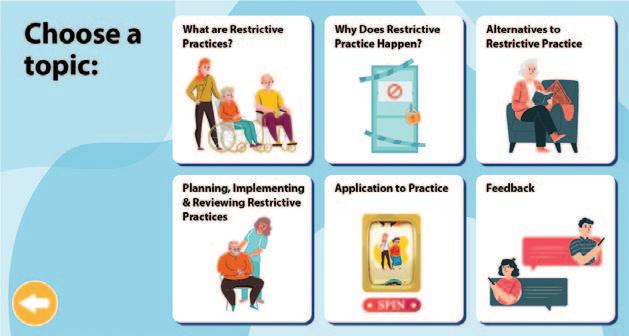
Game-based learning plays a central role, transforming topics like restrictive practices into engaging, real-world scenarios. Simulations allow staff to explore ethical dilemmas, practice
The delivery of safe care is the paramount responsibility of social care providers. Central to achieving this is the governance framework adopted by service providers. And at the core of this framework are policies and procedures. These enable the provider to comply – and evidence compliance – with relevant legislation and regulations, as well as facilitating best practices, supporting business needs, and assisting in recognising and managing risks.
Providers have a legal duty of care to the people they employ. Policies and procedures should provide clear guidelines to staff on how the organisation operates, as well as informing them of best practices and processes to be followed.
Policies should be reviewed annually as a minimum to ensure they are still fit for purpose and align with legal and regulatory requirements. They should be reviewed not only by employees of the business, but also by experts in various subject matters (e.g., infection control or medicines management).
For many small- to medium-sized providers, there may not be the in-house skills, knowledge, and experi-
decision-making, and test alternative solutions in a safe, low-pressure environment. This approach enhances critical thinking, teamwork, and retention of essential knowledge.
Peer-to-peer learning further strengthens the training by encouraging staff to share experiences and insights, fostering collaboration and practical problem-solving. This creates a dynamic learning environment where staff feel supported and empowered to deliver compassionate care.
By integrating these modern approaches, care homes can elevate training into a meaningful experience, equipping staff to balance safety with residents’ autonomy and dignity. At Focus Games, we are proud to offer tools designed to empower care home teams through innovative training. Visit www.FocusGames.com or email info@focusgames.com to learn more about our Restrictive Practice resource and how it can enhance care home outcomes for residents and staff alike.
For further information see the advert on the front of this issue or visit www.focusgames.com
ence to complete such a robust annual review. Many choose instead to purchase their policies and procedures from a reputable provider like W&P Compliance & Training, who will also complete reviews and ensure their policies and procedures remain up to date. This way a provider not only ensures they remain compliant; they also benefit from best practice policies and procedures that provide a solid foundation for safe working practices and – ultimately – protect and support service users and staff.

Diplomas have the potential to empower individuals and are the best route for most health and social care professionals to progress, according to an expert at leading training provider Realise.
Lesley O’Connor, Head of Health and Social Care at Realise, said diplomas are a strong option as they are flexible, can usually be fully funded and can be tailored to the particular needs of the employer and the learner.
Diplomas are also attractive to employers as they require little administration.
Lesley said: “I think there is still a lack of awareness and some misconceptions around diplomas. Sometimes people believe apprenticeships are their only option and they don’t realise diplomas are available under funded provision for those who are eligible.
“Some employers also mistakenly believe that diplomas are completed entirely online but, in fact, they are very hands-on and practical. This approach helps learners apply theoretical knowledge directly to real-world scenarios, which is a major advantage.
“Our diplomas are recognised and trusted by employers in the health and social care sector. They meet national standards, which means learners hold a qualification that is valued and trusted.
“If a candidate does not meet the eligibility criteria for a diploma, then alternative routes will need to be explored. Otherwise, I would nearly always recommend a diploma as a fantastic way to expand knowledge and skills.”
Under the Adult Skills Fund, diplomas are usually fully funded for anyone aged 19 and over, as long as they have lived in the UK for three years. There are some other eligibility requirements in devolved areas – and in some areas, workers from overseas can start a diploma as soon as they arrive in the country under a Health and Care Worker visa.
Learners can also qualify for funded diplomas if they earn below the low wage thresh-

old, which varies from area to area. The thresholds have recently been raised in various authorities, to £35,000 a year in Liverpool, for example, and £27,500 a year in West Yorkshire.
Realise offers Level 2 diplomas in all non-devolved regions for England and Liverpool City Region.
The provider also offers Level 3 diplomas in West Yorkshire, Liverpool City Region and West Midlands.
A Level 2 or 3 diploma is equivalent to achieving GCSE grades 9, 8, 7, 6, 5, or 4 previously graded A*, A, B, or C.
There are no formal maths or English tests at the end of the diploma, though development is encouraged throughout the programme.
Realise works with employers to develop diplomas that are bespoke and built around the six specialisms: Elderly Residential Care Services, Dementia Care Services, Learning Disability Care Services, Treatment and Recovery Care Services, Mental Health Care Services and Community Care Services.
Lesley said: “Tailoring our programmes is extremely valuable as it ensures the skills being developed are relevant to the role the learner holds. It helps them to develop in the areas they are most interested in which, in turn, leads to an enjoyable learning experience.
“Helping learners find the right programme for them is central to the Realise ethos. Some learners will be able to enter at Level 3 if they’re in the right job role, even if they don’t have another diploma.
“Anyone who is interested can talk to us and we will advise on the most appropriate programme.”
To find out more, visit www.realisetraining.com

Apprenticeships in the adult care sector provide a vital opportunity for professionals to advance their careers, develop leadership skills, and contribute to improving care standards. These programs, including Level 4 Lead Practitioner and Level 5 Leader in Adult Care, offer a structured pathway for care workers to step into higher-responsibility roles. By equipping individuals with the knowledge, confidence, and expertise needed to take on leadership positions, apprenticeships play a critical role in fostering both professional growth and better outcomes for service users.
These advanced apprenticeships go beyond acquiring qualifications. They enable care professionals at foundational levels to build essential skills such as critical thinking, problem-solving, and effective communication, preparing them for senior roles in the sector. This emphasis on personal and professional development
not only helps individuals achieve their career aspirations but also strengthens the workforce as a whole. The benefits extend to employers, who gain skilled and motivated teams by supporting staff through these programs. Investing in leadership development helps organisations improve retention rates and build a robust pipeline of future leaders, contributing to stability and high performance within care settings. Apprenticeships also provide clear guidance for newcomers to the sector, offering resources to help them understand career pathways and qualification requirements. This makes apprenticeships an excellent starting point for those beginning their journey in adult care, as well as a powerful tool for existing professionals seeking to advance.
By focusing on continuous learning and leadership development, apprenticeships in adult care empower individuals to unlock their potential while ensuring high standards of care across the sector. For employers and care professionals alike, these programs are a cornerstone of growth, innovation, and excellence in the industry. Find out more about our apprenticeships on www.paragonskills.co.uk
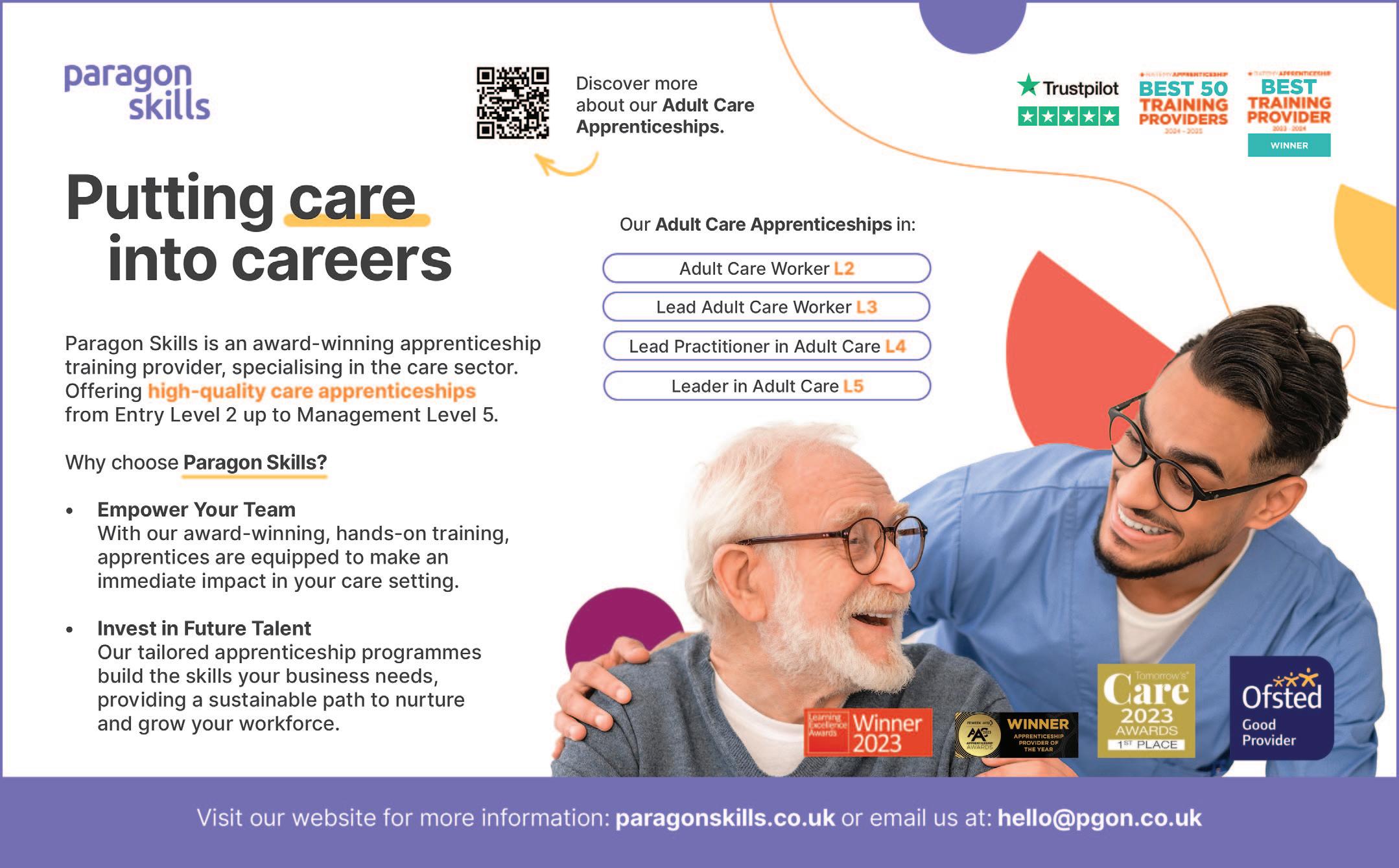
By Daniel O’Shaughnessy, Programme Manager

In an era where healthcare data is one of the most sought-after digital assets, care homes, nursing facilities, and NHS establishments are increasingly at risk of cyberattacks. With the sensitive and life-critical data they handle daily, a breach can have devastating consequences not only for the facilities but also for the people they support.
But there are steps that you can take to reduce the risk and impact of a successful attack, and to respond quickly if an attack occurs.
It is absolutely critical to have a business continuity plan which covers what you will do if digital systems are out of order. Digital Care Hub’s business continuity guide and template plan says:
Don’t assume you will be back to normal in a few days – plan for longer periods of time.
Test your plan. This is crucial, as there is no real way of knowing your plan
works if you don’t test it.
Consider vulnerabilities specific to your business type and structure. Make sure these are included in your plan.
Ensure you have a data security protection lead in place – this doesn’t have to be a specific job title. It can be a responsibility of an existing employee.
During a live attack, care providers should:
Look at your security software to see if you are able to identify the specifics of the attack. If you are unable to do this (but you know which device has been affected) run your antivirus programme. If nothing is found, consider using an alternative antivirus programme. Do not turn off your computer. Log-off (not shut-down) the computer and ensure no-one uses it. Quarantine the computer by removing the network cable or put it in ‘airplane mode’. Secure any memory discs/CDs/DVDs or other media connected to the computer.
Check who else has been affected, speak to your software supplier(s) to find out whether they are reporting similar incidents.
During the recovery phase, you should:
Follow your business continuity plan. Ensure you always have access to a ‘grab-bag’ of key documents necessary to respond to an incident. Work
of the fraudsters and criminals of the world. In this guide we will look at a checklist of things you need to consider to protect your business.
BACK UP YOUR DATA
Backup your data, and importantly keep the backups physically away from the computer on a separate (but secure) media such as a USB key. See below about encrypting.
PASSWORDS
Set your systems to disallow weak passwords, and mandate regular changes.
Multi-factor authentication
This will secure access to your systems using your personal mobile phone or a security device. It stops attackers who have hacked any password.
CYBER SECURITY AND INCIDENT PLANS
Plan out your approach. Don’t try to work things out on the day…take a look at the other article in this feature for more details.
PRIORITISE SOFTWARE UPDATES
Providers of commercial software will generally supply updates and fixes that are designed to fix security holes so they cannot be exploited. It’s vital to install these as soon as you get them.
ACCESS CONTROLS
Setting up your IT to secure access to both the systems and the data by separating who has access to what. Your IT supplier can do this if you aren’t sure.
EMPLOYEE TRAINING/PROCEDURES
Many attackers will use trickery (Phishing) to manipulate people into making mistakes and opening your systems. There are countless ways of doing this; don’t rely on your staff always recognising an attack. Strict procedures and training combat this. Look at how your finance staff do business and use fixed, written procedures to ensure they don’t fall for anyone or thing.
with your IT suppliers and IT support to identify the nature and scale of the issues. I
Recover hacked accounts. Check suppliers’ websites for details on how to recover hacked online email, social media or bank accounts. Check your own email account to see if forwarding rules have been set up by hackers. Change passwords. Log all devices and apps out. Set up multi-factor

INSTALL SECURITY SOFTWARE
Having suitable security software installed is vital. By this, we mean anti-viral software and system tools to keep your systems clear. You should have:
• Email Security & Threat Protection
• Cyber Fraud and Phishing Defence
• Content Filtering DATA ENCRYPTION
Always ensure that any data stored in your IT systems is encrypted both at source and in transit. Don’t forget your backups!
SECURE YOUR MOBILE DEVICE
If you keep company data on it, using MDM software is a great plan. You can set rules and administer each device to be sure that they are compliant with security protocols. www.sescomputers.com sales@sescomputers.com +44 1305 820300



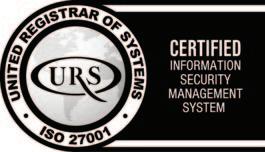
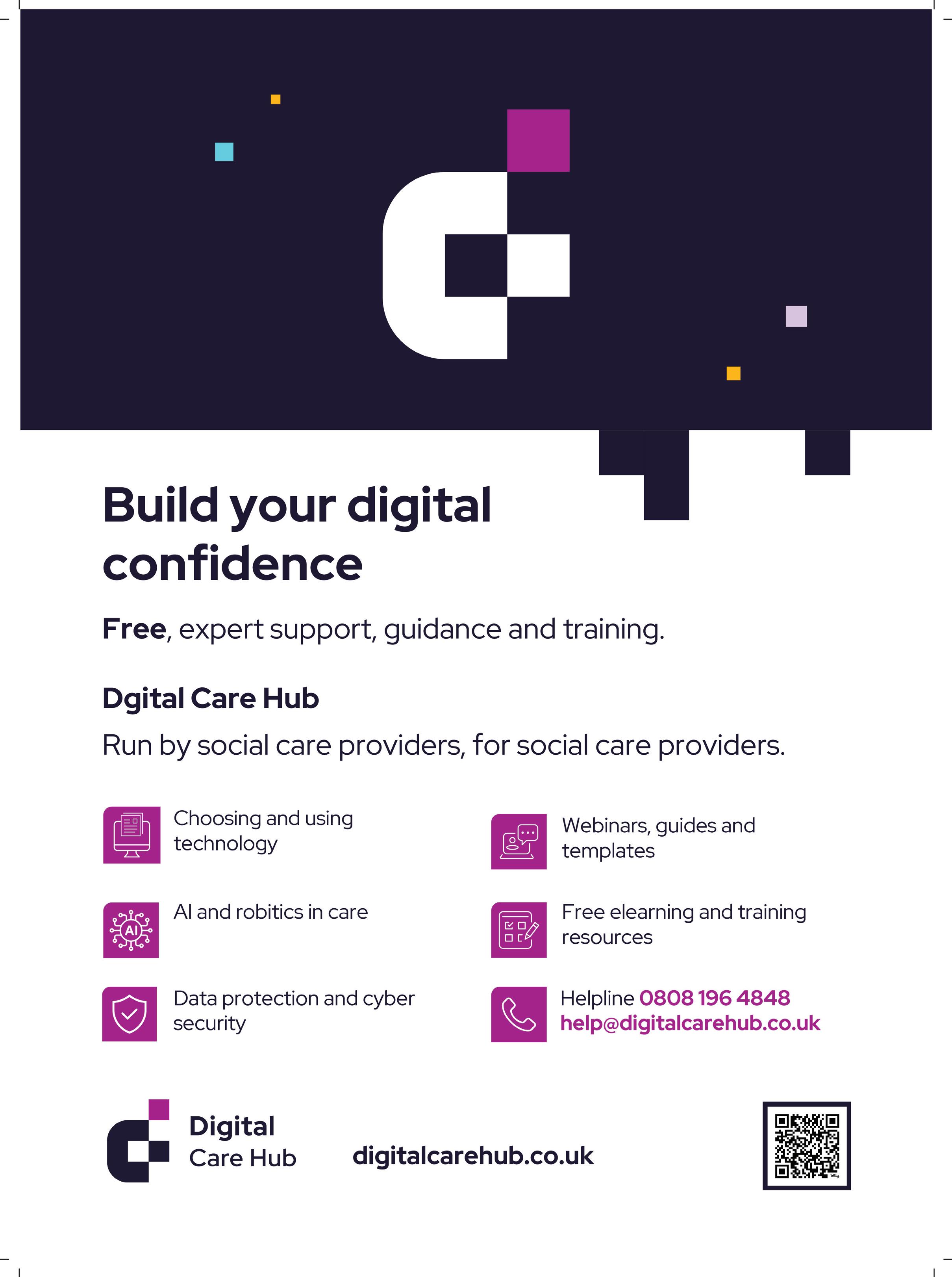

Background checks are vital to the healthcare industry, ensuring that only qualified, trustworthy, and compliant individuals are hired, directly influencing both patient safety, outcomes and the organisation’s credibility. It's important to emphasise that these requirements apply to all staff in health and social care services, including volunteers, and agency workers.
However, new statistics have revealed that 20% of healthcare candidates in the UK fail a background check, highlighting that the industry at times struggles to find candidates that are a perfect fit.
With the stakes so high, ensuring that healthcare professionals meet the highest standards of integrity and competency is more important than ever. But how can employers take proactive steps to protect vulnerable individuals from harm or exploitation, ensuring they hire only candidates with the necessary qualifications and experience?
The first step employers can take is conducting comprehensive background screenings, following regulations set by the Care Quality Commission (CQC). The way employers can ensure best practices include establishing clear vetting policies, training staff on these protocols, and regularly updating screening processes to maintain compliance. These
checks typically encompass criminal record reviews, identity verification, proof of qualifications, UK right-to-work assessments, and enhanced Disclosure and Barring Service (DBS) checks.
However, our statistics show less than one-in-ten healthcare businesses check whether a candidate is on a sanctions watchlist or identified in adverse media checks, and no organisations are running social media background checks. While CQC regulations ensure that candidates have the right skills, these additional checks are crucial preventative measures that help ensure the staff being hired are not only qualified but also the right kind of people for the role, safeguarding both patients and the safety and happiness of existing staff.
By following the strict guidelines laid out by CQC, healthcare organisations can protect their staff members and those receiving care from potential harm or exploitation. While also ensuring their brand doesn’t face any reputational risk.
In the UK, healthcare organisations most frequently verify a candidate’s criminal history (66%), references (60%), address (59%), and right to work certification (56%). These checks are essential for ensuring compliance with regulatory requirements, helping protect organisations from potential fines or legal action due to non-compliance. More importantly, maintaining high standards of care and safeguarding patient safety not only helps meet these regulatory requirements but also boosts the organisation’s credibility, fostering trust among patients, families, and the public.
Failure to comply with these guidelines can lead to reputational damage, eroding trust in the provider’s ability to deliver safe and effective care. Additionally, non-compliance with CQC requirements can result in severe
By Luke Shipley, CEO and co-founder at Zinc (www.zincwork.com)
penalties, including fines, legal action, and even the revocation of a healthcare service’s licence. This only highlights the importance of verifying candidates thoroughly – ensuring that these checks are done to the highest standard, and conducting regular rechecks on existing staff to ensure the safety, trust, and integrity of the healthcare institution is maintained.
LEVERAGING TECHNOLOGY FOR EFFECTIVE SCREENING Technology, specifically automation, plays a critical role in enhancing the speed, accuracy, and compliance of background checks, enabling healthcare providers to safeguard patient welfare more effectively. By automating and streamlining the background verification process, technology can provide a helping hand to organisations to meet the CQC standards efficiently, even in a fast-paced and evolving healthcare environment.
Automation of background checks can provide real-time data access from one unified dashboard, using this, healthcare providers can quickly identify red flags and assess candidates more accurately. Automation tools can also provide candidates with real-time updates on the status of background checks so they have visibility and aren’t left in the lurch wondering where things are at.
By utilising screening technology, businesses can offer a screening process that is efficient and easy to use for both candidates and their hiring teams. Moving at pace means businesses can reduce the wait time from offer to start date, ensuring they don’t lose candidates to competitors throughout the process and bringing forward start dates where possible. Ultimately, leveraging technology not only improves operational efficiency but also ensures that providers maintain high standards of care, protecting both patients and the organisation’s reputation for years to come.


The care sector in the UK is facing an unprecedented crisis, with an 82% drop in visa applications for health and social care roles since July 2023 according to the latest figures from the Home Office. This sharp decline is a direct result of the government’s recent policy changes, notably the ban on overseas care workers bringing family dependents. For many potential applicants, this restriction makes the UK a less attractive destination, especially for those unwilling to face prolonged separation from their families.
However, the decline in overseas care workers is not solely due to this policy. The cost-of-living crisis in the UK has further compounded the problem. Many care workers, who are often paid at the lower end of the salary scale, struggle to make ends meet on a single income. The inability to bring a second household income from a spouse or partner makes the financial realities of living in the UK even more daunting, discouraging many from applying. This situation is exacerbated by rising costs for essentials such as housing, utilities, and food, which significantly erode the disposable income of lower-wage workers.
Also contributing to the reduction in visa applications is the increased scrutiny and compliance demands placed on employers by government. Since late 2023, the Home Office has intensified its oversight of sponsorships in the care sector, resulting in lengthy processing delays and burdensome evidentiary requirements. Employers are now required to submit extensive documentation, including rotas, contracts, and staff details, often with very little notice. These demands have overwhelmed many care providers, leading to delays in hiring and, in some cases, the suspension or revocation of sponsor licences. The increased frequency of compliance visits has further strained employers, who are already struggling to maintain adequate staffing levels. Home Office visits can lead to significant disruptions in business operations, especially if they result in the suspension of a licence, which halts all further sponsorship and delays pending visa applications.
The impact of these issues on the care sector is profound. With a large number of vacancies remain-
ing unfilled, the sector is struggling to provide essential services to vulnerable people. Despite some arguments that the drop in visa applications could reflect a “natural correction” following the initial surge in demand when the sponsorship system first opened to care workers, the persistent high vacancy rates suggest that the need for overseas workers remains critical. The combination of restrictive immigration policies, economic challenges, and increased regulatory burdens has created a perfect storm, which threatens the ability of care providers to meet the growing demand for services.
To navigate these challenges, care providers must take proactive steps. Employers need to ensure they have adequate resources to manage their sponsorship and Home Office interactions and it is crucial they remain vigilant of any abuse or mismanagement of the system and workers. Engaging legal representatives to assist with visa applications, compliance visits, and licence management can help mitigate risks and ensure businesses remain in good standing with the Home Office.
Additionally, adopting robust recruitment practices and providing comprehensive support to overseas workers—such as assistance with accommodation, training, and relocation expenses—can help enhance retention and attract talent. Despite the recent increase in visa salary thresholds, care workers still benefit from discounted rates under the Immigration Salary List.
Looking to the future, while the government is planning to build a domestic workforce, such as through Labour’s Fair Pay Agreement and the launch of Skills England, these initiatives are unlikely to have immediate results. It could take years to train and recruit enough domestic workers to fill the current gaps in the care sector, so the reliance on foreign workers will likely continue. To ensure that care providers can maintain services during this transitional period, it is crucial that the visa system is adapted to better support the sector’s needs.
It is clear that the care sector in the UK is at a critical juncture. The combined pressures of restrictive immigration policies, economic challenges and regulatory burdens have led to a significant reduction in the number of overseas care workers, jeopardising the sector’s ability to meet demand. By taking proactive measures and advocating for supportive policy changes, care providers can navigate these challenges and continue to provide essential services to those in need.

bers and care home staff cannot fulfil this role. We eliminate this obstacle, providing a seamless and stress-free solution.
Our friendly and knowledgeable team guides both donors and attorneys through the entire process of applying for and registering an LPA, making it straightforward and accessible. With affordable and transparent pricing, we ensure this vital service is within reach for everyone.
We are eager to collaborate with care providers and build lasting partnerships. Our referral package is designed to add value to the care experience while supporting your residents effectively.
residents is securing a Certificate Provider, as family mem-
To learn more about how we can work together, please contact Malcolm Roberts on 01228 307360 or email malcolm.roberts@lpanow.com
Swift Management Services Limited provide expert support through a network of highly experienced healthcare professionals who have many years of working within the health and social care sector. These include nurses, care managers, Registered Managers, Operating Theatre staff, & ITU staff.
The team is able to provide holistic support packages ranging from a short term improvement project to substantial change management programmes including interim staff where required. Our innovative action plans which are tailored to your specific service requirements are interactive and are held on our secure server for ease of access. These have proven especially popular with CQC as it is easy to evidence progress and improvements through our ‘You said- we Did’ information programme.

We can deliver training sessions in person or remotely using a variety of platforms that are designed for your service.
We can support your service through a crisis or on an ongoing basis with our retained consultancy service package, providing regular one to one coaching and development, quality monitoring reviews, mock KLOE inspections, unlimited telephone and email support tailored service improvement plans and access to a dedicated care consultant to work in partnership with you to drive sustainable improvements. Swift Management Services Limited can create staff friendly bespoke policies and procedures for you as required to help you achieve compliance.
Tel: 020 8087 2072
Email: info@swiftmanagement.org.uk
Website: www.swiftmanagement.org.uk
Global assists clients throughout the U.K. who specialise in the healthcare sector to achieve their objectives of purchase, development and refinance.
We have organised over £1.8bn for clients in the past 30 years, providing clients with competitively priced funding to refinance existing debt, ease cashflow and develop businesses further. From helping clients make their first purchase through to allowing groups to grow significantly in size we

assist at every stage of your business expansion. Every proposal is individual and deserves to be treated that way, so we hope you will allow us to be of assistance to you and call us to chat through your plans and requirements, I am sure we will be able to tailor a facility to your requirements. Call us on 01242 227172 or e-mail us at enquiries@globalbusinessfinance.net


